Our little field trip around the world has come to an end for now, so it’s time to head west to the kingdom of Toroia and continue with the story. First, let’s check out the city area.
Toroia to Troia
The name of this kingdom and city is spelled トロイア, which would be spelled as “toroia” in English. Indeed, the official Super NES translation calls this place “Town of Toroia”:
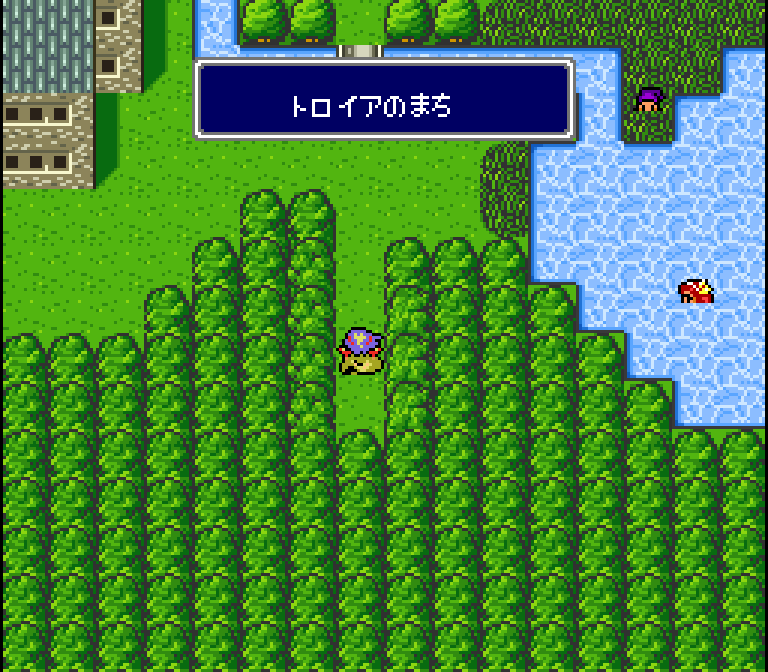 | 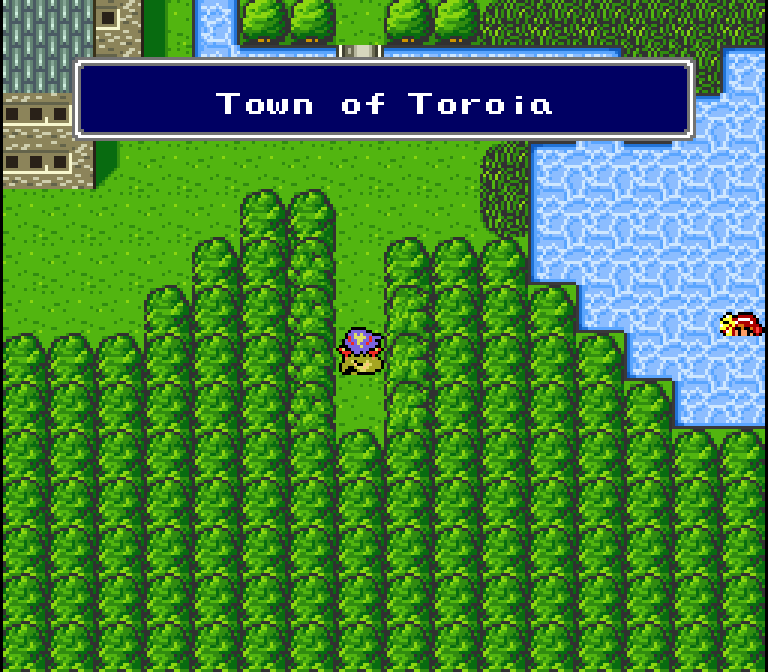 |
| Final Fantasy IV (Super Famicom) | Final Fantasy II (Super NES) |
The thing is that with words like this in Japanese, there are often multiple other possible English spellings too, and it turns into a guessing game or a game of “choosing what sounds best”. This is why the PlayStation translation calls this place “Troia” instead.

The PlayStation version also removes the “Town of” part, which isn’t a big deal, but could cause confusion if the castle goes simply by “Troia” too.
And, since the GBA translation is based on the PlayStation release, it’s called “Troia” in that version too:
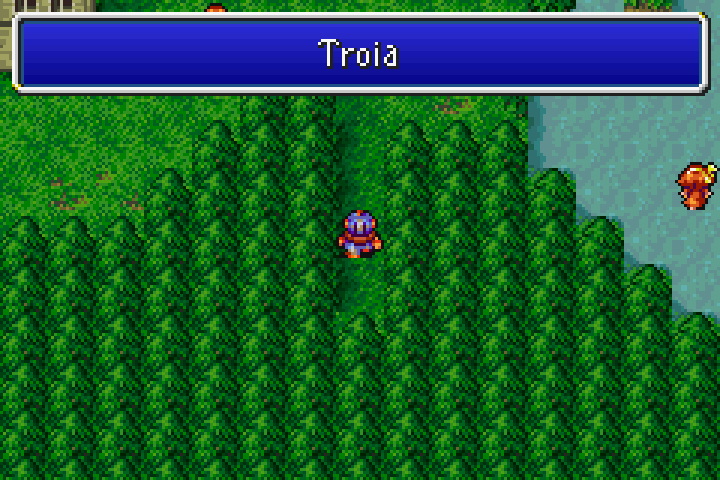
Thanks to readers’ donations and some help from friends in Japan, I was able to buy a bunch of Final Fantasy IV materials recently, so it’s time to put them to use!
Checking a bunch of guides printed in 1991, we see the “Troia” spelling quite a lot – every book I have has it spelled that way, in fact. Looking through these books, they seem decently trustworthy with their spellings, so I guess it was meant to be “Troia” all along:
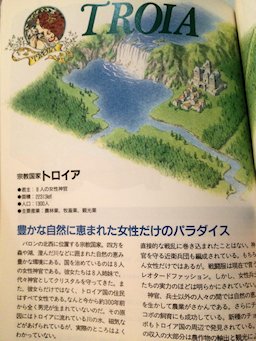 | 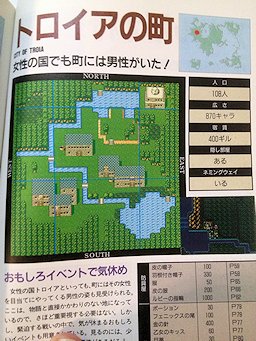 | 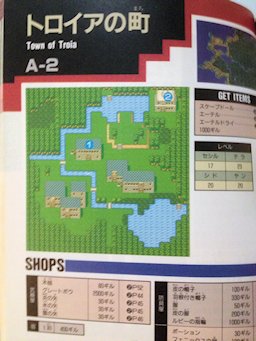 |
You know, I’ve actually encountered this name in completely unrelated stuff I’ve translated myself – for example, there’s a healing spell in the Fairy Tail manga/anime series that goes by this same name. In that instance, I went with “Troia” since it would be easier for the voice actors to pronounce and would save a lip flap in the animation.
I used to wonder what sort of origin this word might have – it kind of reminded me of how the name “Esuna” appears in lots of different things too. Luckily, some readers pointed out that the name seems to come from the city of Troy, which is called “Troia” in Latin and other languages.
Anyway, since it was translated as “Toroia” in the original translation, I’ll usually spell it that way here. I might accidentally use “Troia” sometimes though, so don’t mind me if I do!
Metal Man
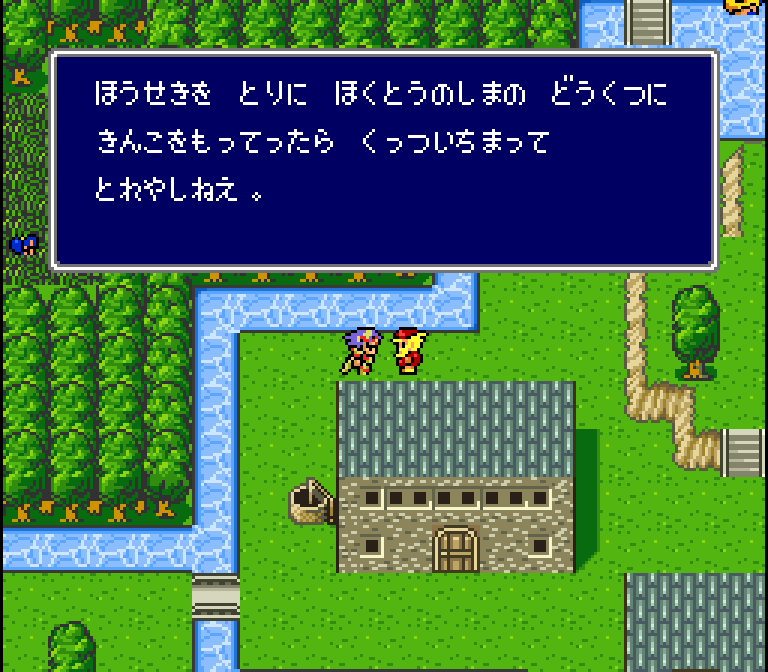 | 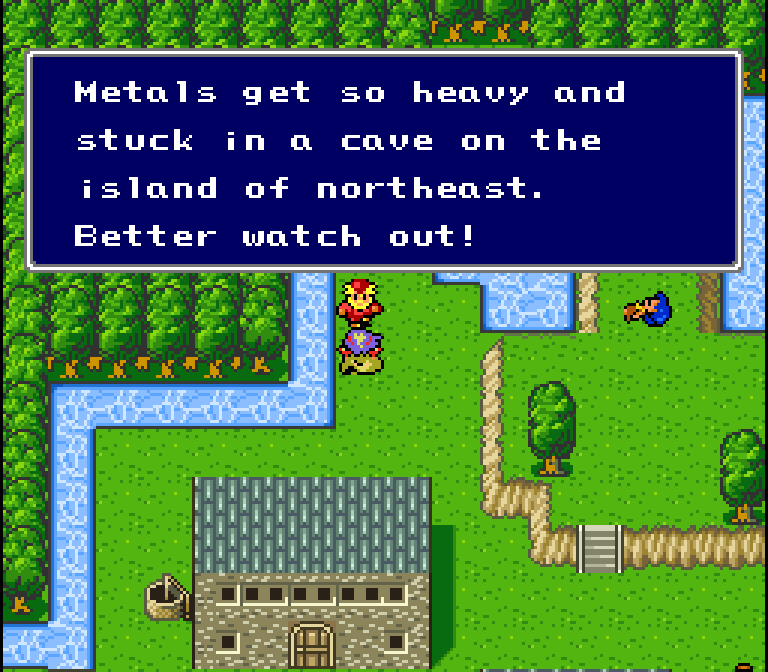 |
| Final Fantasy IV (Super Famicom) | Final Fantasy II (Super NES) |
A man in the town talks about a cave to the north:
| Japanese Version | English Version |
| When I took a metal safe into the northeastern cave to collect some gems, it got stuck and I couldn’t budge it. | Metals get so heavy and stuck in a cave on the island of northeast. |
| Better watch out! |
The original line is pretty odd, but it’s basically meant as an early, vague hint that metal stuff is bad in the upcoming cave. Other translations use “strongbox” instead of “safe” – I’m not sure what the difference is but that does sound a little better than safe. I think anyone would have a hard time lugging a safe around!
Anyway, the English line tells you straight-out that metal is bad in the cave. The original line didn’t have anything to do with weight, though. That’s added into the translation here for ease of understanding I guess.
The English line also has that awkward, non-native speaker phrasing with “on the island of northeast”.
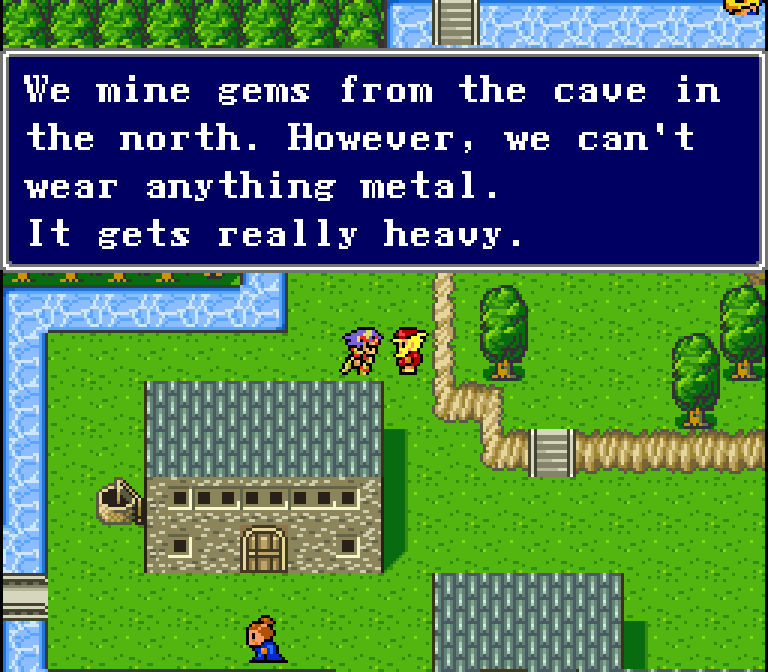
The fan translators either didn’t understand this line or decided to make their own line up for this guy:
We mine gems from the cave in the north.
However, we can’t wear anything metal.
It gets really heavy.
It definitely misses the mark as an accurate translation.
Missing: One Husband
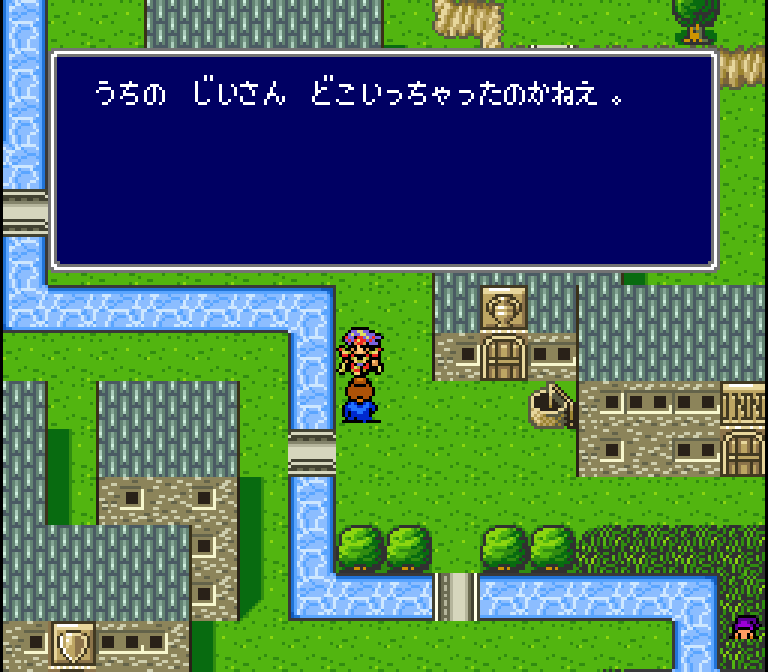 | 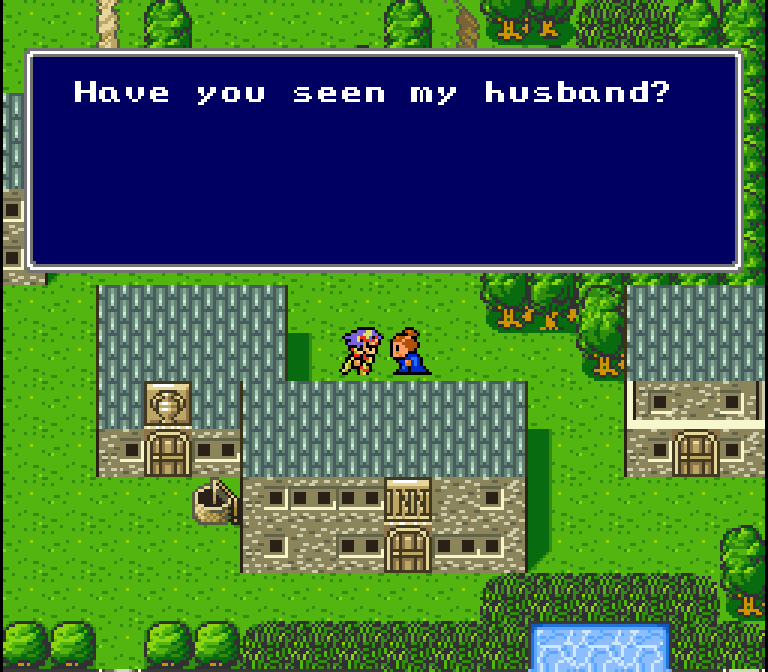 |
| Final Fantasy IV (Super Famicom) | Final Fantasy II (Super NES) |
An old lady wanders around town, looking for her husband:
| Japanese Version (basic translation) | English Version |
| I wonder where my husband could’ve gone… | Have you seen my husband? |
The translation here is fine – the interesting thing is that on a super-duper literal level, the Japanese line is something like, “Wherever could my grandpa have gone?”
It’s very common in Japan for married couples to refer to their spouses by their current role in the family. So since her husband is a grandpa, she refers to him as “grandpa”, even to outsiders of the family. So she’s not saying that she’s looking for her grandpa – she’s looking for her husband who is a grandpa in their family. Hopefully that makes sense – we have a similar thing in English but we usually only do this in more limited situations, when talking to other members of the family.
I bring all this up because it’s pretty common for inexperienced translators to be unaware of this family stuff and translate super-literally, which can makes thing awkward.
In this case, it looks like the translators handled the cultural jump just fine by translating it to “my husband”. Nice!

The GBA translation actually sort of does the straight translation approach with, “Have you seen Grandpa? Where is that old codger!?”
Imagine if an adult stranger came up to you and asked, “Have you seen Grandpa?” It might strike you as a little awkward at first, like you were suddenly somehow part of this stranger’s in-group, right? You might even think they’re referring to their grandfather.
That’s sort of the case here in this GBA translation, but it’s not a huge deal – after a second you can still figure out that she’s probably referring to her husband, but it could’ve been phrased better, I feel.
I guess the point of all this is that family relationship words need extra thought put into them when translating. Especially with Japanese and its million words for family members.
Surprise!
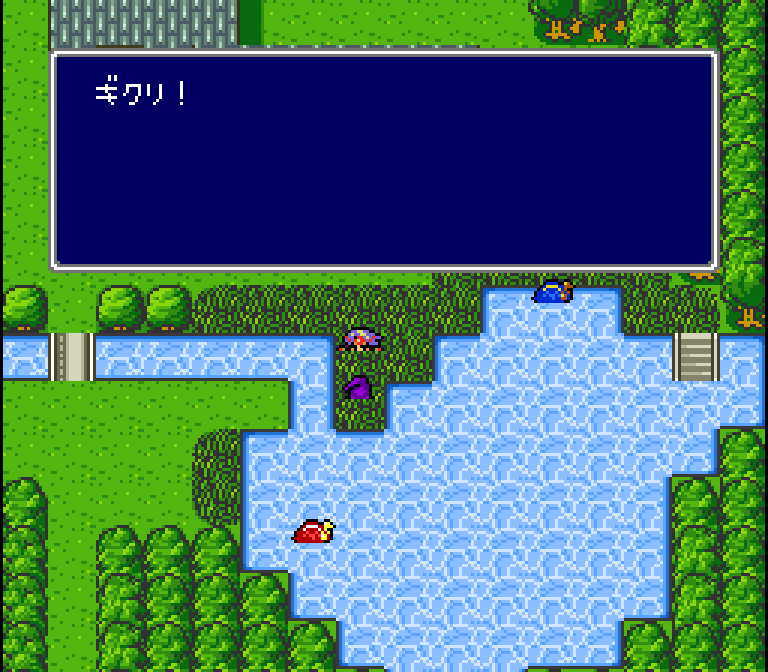 |  |
| Final Fantasy IV (Super Famicom) | Final Fantasy II (Super NES) |
It turns out the old lady’s husband is hiding in some grass, watching women swimming in the water! If you talk to him, he says:
| Japanese Version (basic translation) | English Version |
| Eep! | W-What!? |
| Wh-what do you want? Don’t scare me like that! | You surprised me! |
| Well, go on! Get out of here! | Go away! |
Like a lot of old men in this game, this guy talks with an “old man” style in Japanese that’s not really easy to replicate in English. I usually don’t point it out, but many of the characters and NPCs in this game speak with different styles in Japanese, but these are usually really hard to convey in English simply because English is such a different language.
Anyway, getting back to this old man, the surprised sound is missing from his English translation. Not a huge deal at all…
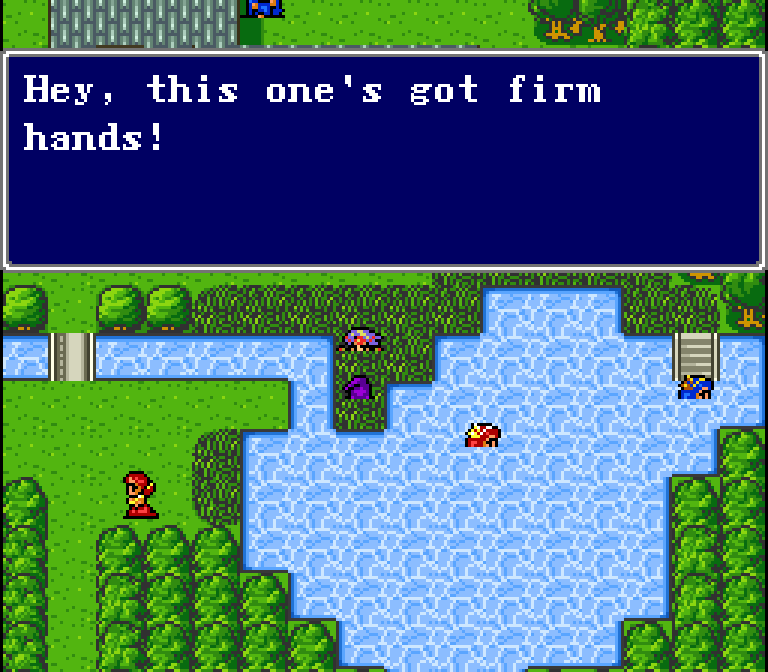
…but I bring it up because the fan translation rewrites things a bit:
Hey, this one’s got firm hands!
Aagh!!
Wh..what the…
you startled me!
Go away, damnit!
I honestly have no idea what that line about hands is about. It doesn’t seem to be a quote from anything… This English line befuddles me more than any Japanese line so far.
Swimming Lessons
 | 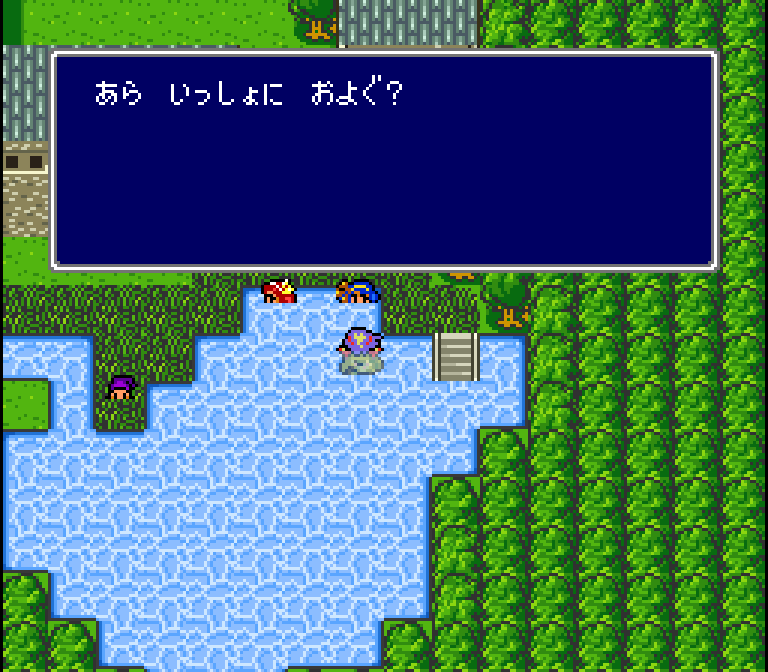 | 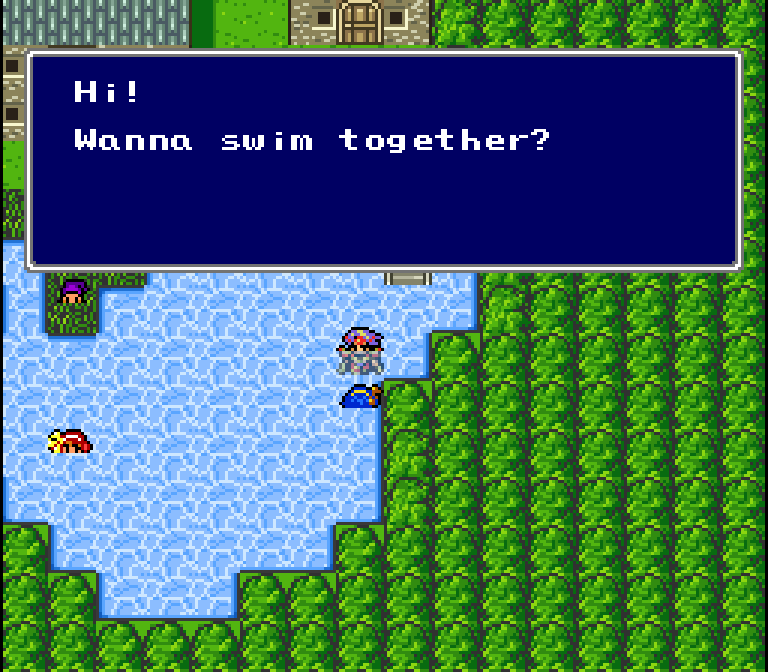 |
| Final Fantasy IV (Original) | Final Fantasy IV (Easy Type) | Final Fantasy II (Super NES) |
You can actually go into the water and talk to the girls and explore. If you talk to one of the girls, she says:
| Final Fantasy IV (basic translation) | Final Fantasy IV Easy Type (basic translation) | Final Fantasy II (Super NES) |
| Heehee! | ||
| Oh, will you swim with me? | Oh, will you swim with me? | Hi! Wanna swim together? |
The first line is actually the sound effect word for when kids or girls are playing around and having fun and laughing. I suspect it was removed from the Easy Type version because it could easily be confused with the sound effect word for shrieking in this context. Or it could be the other way around, but I feel like it’s the former.
All subsequent translations – including the fan translation – either get the first part of this girl’s line wrong, change it, or omit it altogether.
Hitting the Town
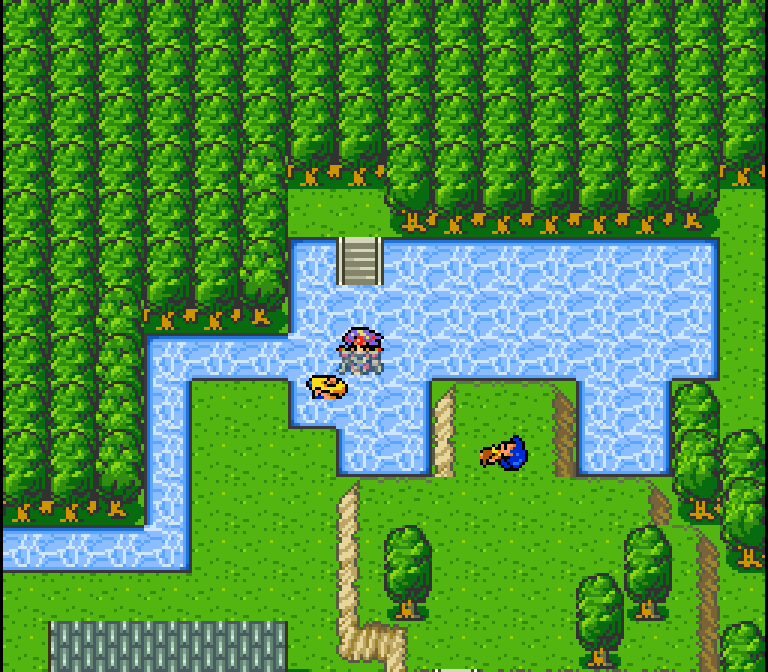 |  |
| Final Fantasy IV (Super Famicom) | Final Fantasy II (Super NES) |
In the original release of Final Fantasy IV, Namingway can be found walking around town here. But he’s not there in Easy Type or Final Fantasy II… What’s up with that?
Well, similar to much earlier in the game, this town had a training room added to it. Here’s a look at the original map and the modified map; the training room can be found on the right side, in the middle.
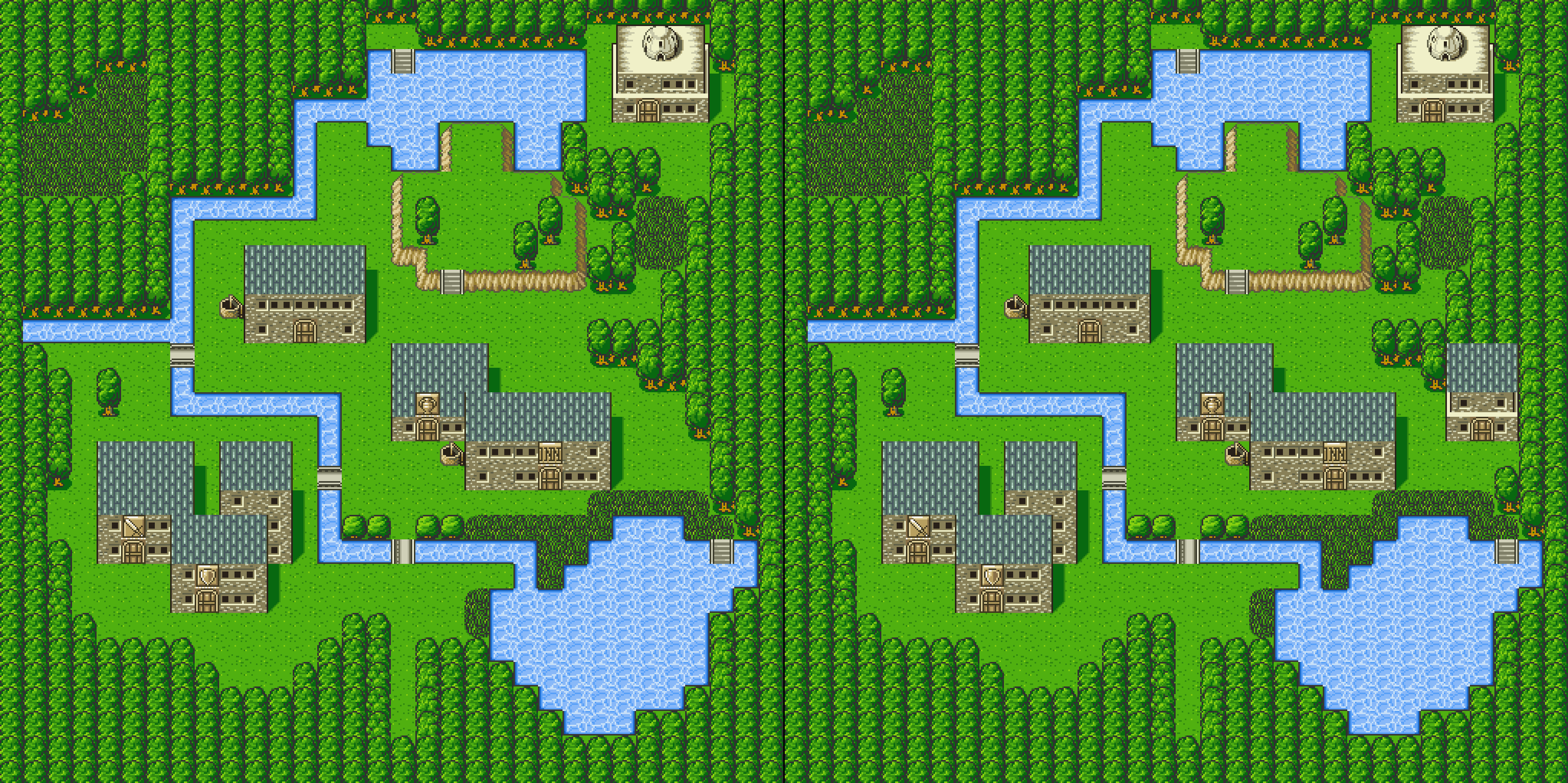
Of course, when you enter the training room, it’s just the same old training room that you can access from lots of other towns. And you can talk to Namingway in there too – that’s why he’s not walking around outside in Easy Type or Final Fantasy II.
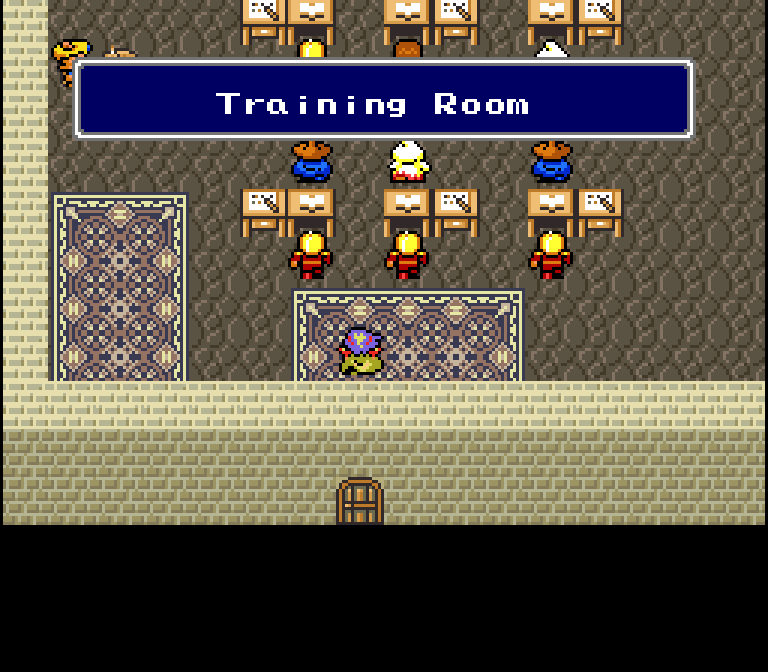
By this point in the game players should have most of the gameplay mechanics figured out. But the training room does cover some Chocobo-related topics which will be relevant soon, so I’m guessing that’s why this town had the room added to it.
Harping Across Space
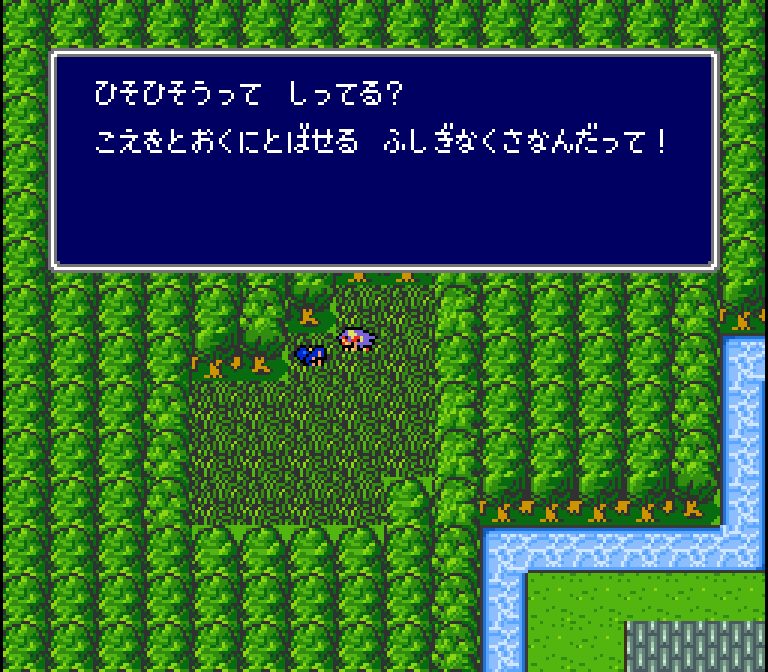 | 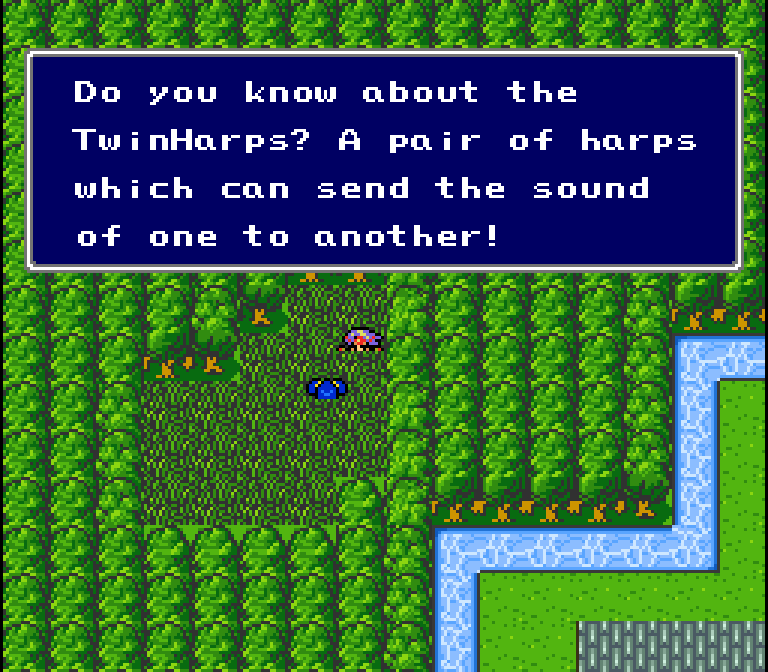 |
| Final Fantasy IV (Super Famicom) | Final Fantasy II (Super NES) |
A girl in a hidden area of town has some good info for you!
| Japanese Version (basic translation) | English Version |
| Have you heard of Hisohisou? | Do you know about the TwinHarps? |
| They say it’s a mysterious plant that lets you send your voice far off! | A pair of harps which can send the sound of one to another! |
Whoa! This is a key item in the game that plays an important part in the story coming up, so this is a pretty big change.
In the Japanese version, this item she’s talking about is a plant, but in the English version it’s a harp? How did that happen?
Basically, the Japanese name for the item uses word play – it’s a sort of portmanteau of “hisohiso”, which is the Japanese sound effect for whispering, and “sou”, which is often added to the ends of words to denote that they’re plants or herbs of some sort. So this is some sort of “Whisper Grass” or “Whisper Plant”, in other words.
Of course, when you translate it out like that, the word play is completely lost and things make a bit less sense. So the translators decided to change the item name to “TwinHarp”, thus turning the key item from a plant into a harp.
So if you ever thought Cecil and friends carried a harp into the magnetic cave, nope! They actually carried some sort of plant with them.
Now that I think about it, everyone in this town is always saying how Toroia is famous for all of its vegetation and trees and such; maybe this special plant is native to this area and that’s how Gilbert/Edward wound up with it. That would also explain why this little girl is talking about it.
For reference, the fan translation localized this item’s name into “Echoer”, which I think is actually kind of cool:
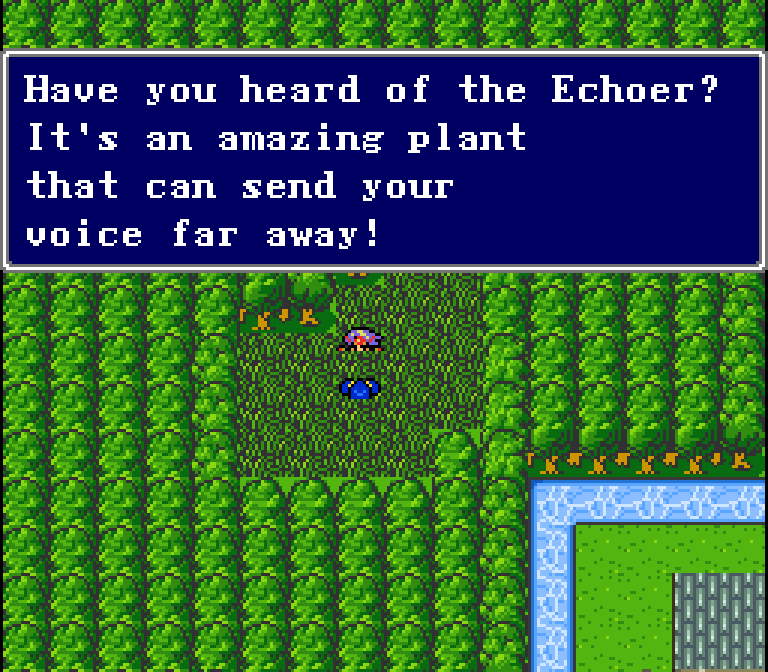
The PlayStation translation stuck with “Twin Harp”:
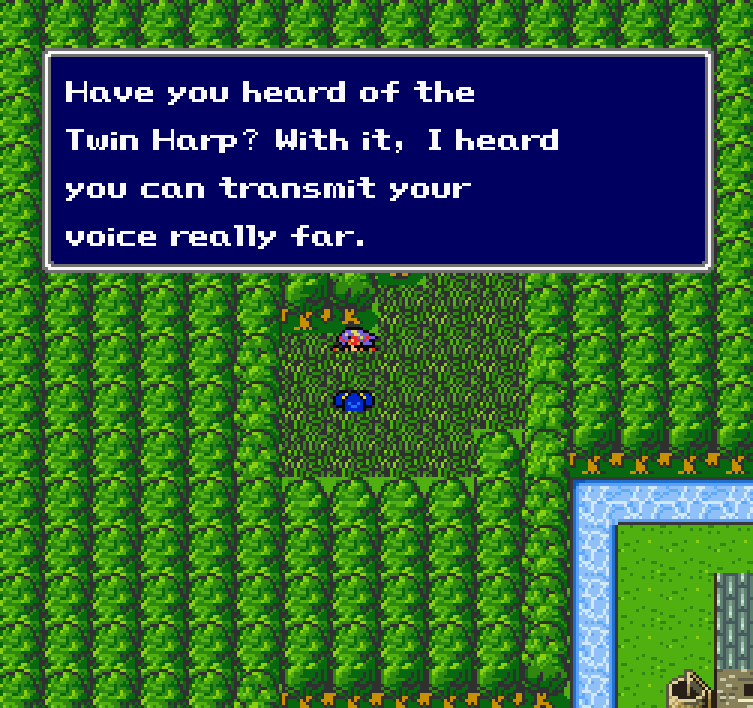
And, not surprisingly, the GBA translation also goes with “Twin Harp”:
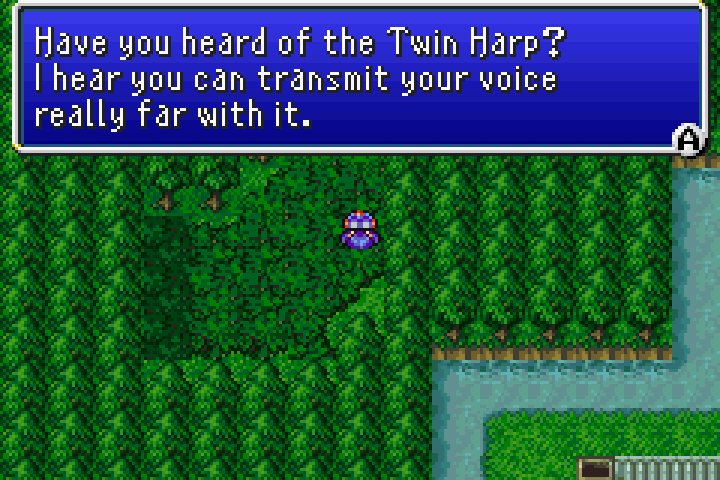
And the DS version handles it pretty nicely by calling it “whisperweed”:
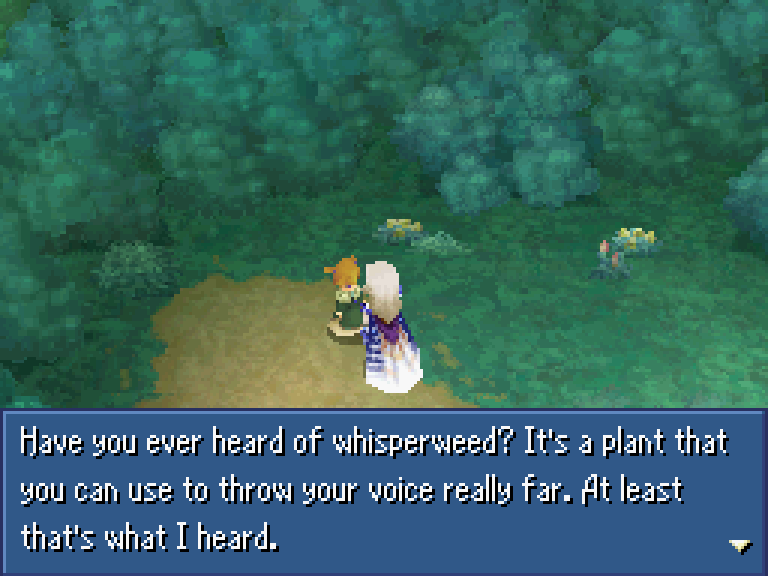
Incidentally, this Hisohisou/Whisper Grass item appears in a couple other Final Fantasy games, including Final Fantasy V and Final Fantasy Tactics, among others. But I don’t know if this name was kept as “Twin Harp” in the official translations of those games.
Checking quickly, though, it appears that the Final Fantasy V fan translation simply called it “Echo”:
 |  |
| Final Fantasy V (Super Famicom) | Final Fantasy V fan translation |
Although, if you check the rare items menu, it’s called “Echo Plant” there:
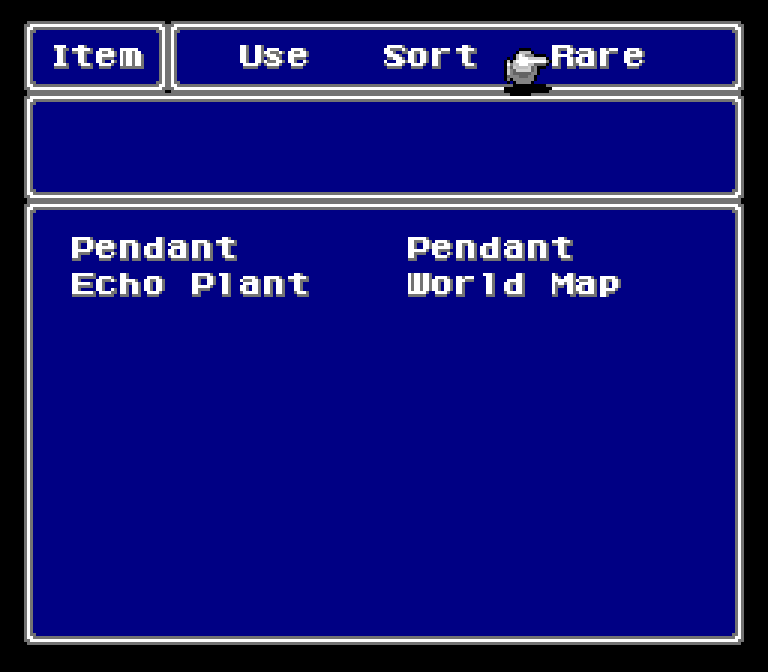
Also, a couple Japanese guides have what seems to be an official drawing of this special plant:
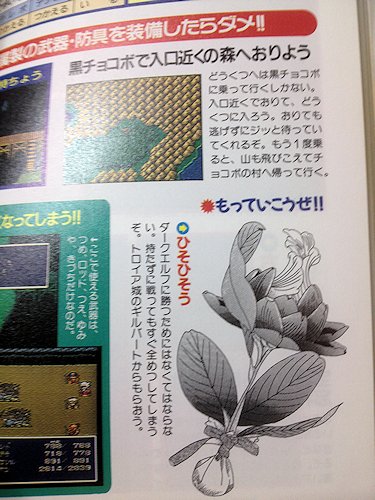
Loot the Town!
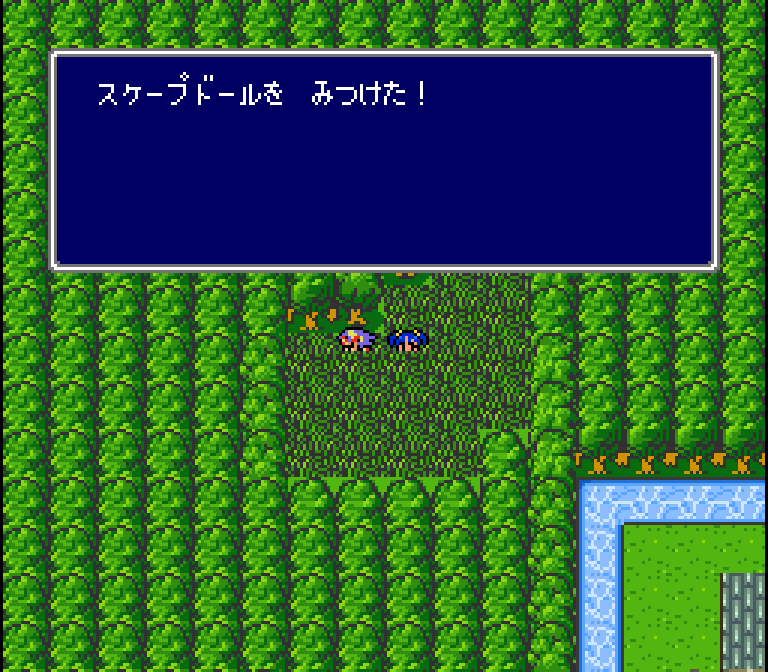 | 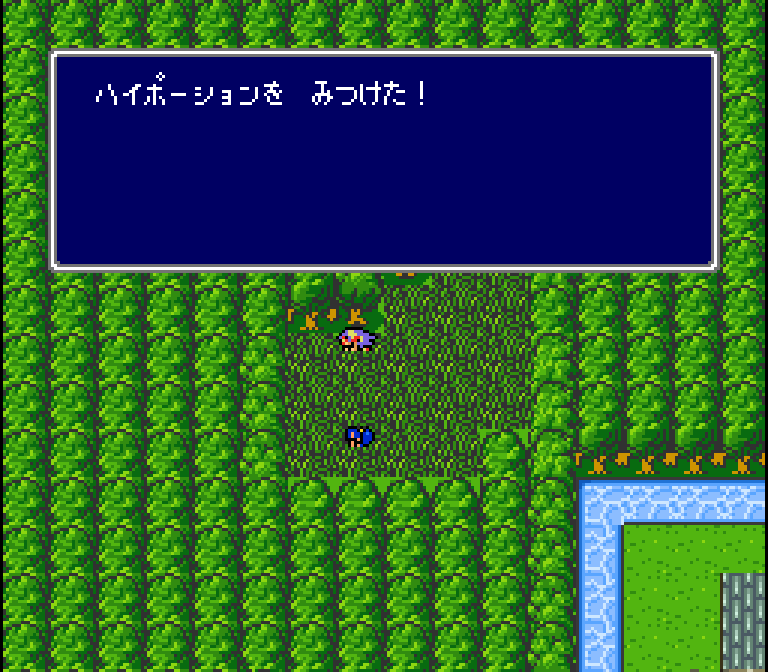 | 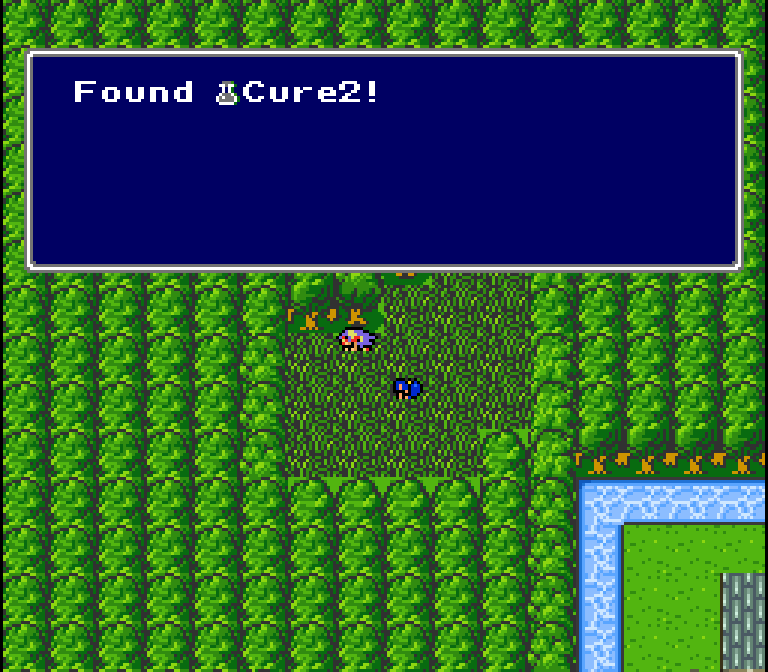 |
| Final Fantasy IV (Original) | Final Fantasy IV (Easy Type) | Final Fantasy II (Super NES) |
There are a number of hidden treasure chests to be found in this town, and one of them had its contents changed:
| Location: | FFIV | FFIV Easy Type | FFII |
| Outside | Scape Doll | Hi-Potion | Cure2 |
I’ve encountered the term “Scape Doll” in a few other games too, and in all cases it seems it’s meant to be an item that acts as a doppelganger for whoever it’s used on. This makes enemies attack the doppelganger rather than the actual target. In the case of Final Fantasy IV, this item essentially casts the “Blink” spell, which lets you avoid a few enemy attacks.

Why it’s called a Scape Doll is anyone’s guess – Japanese fans seem to guess that it’s based on the word “scapegoat”, which is indeed a word that’s been adopted into the Japanese language. Since the term appears in multiple games and series (including Phantasy Star), it seems to be a standard term of some sort too.
Bathed in Light
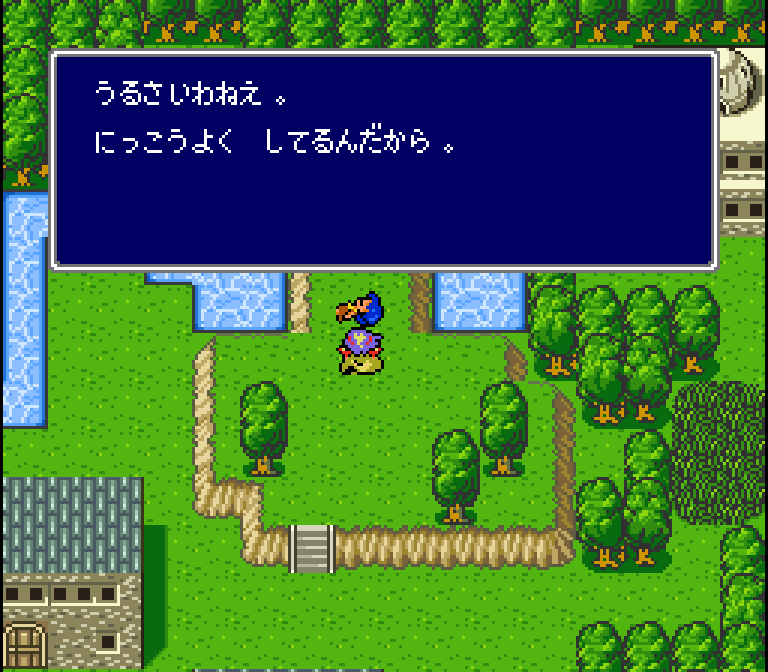 | 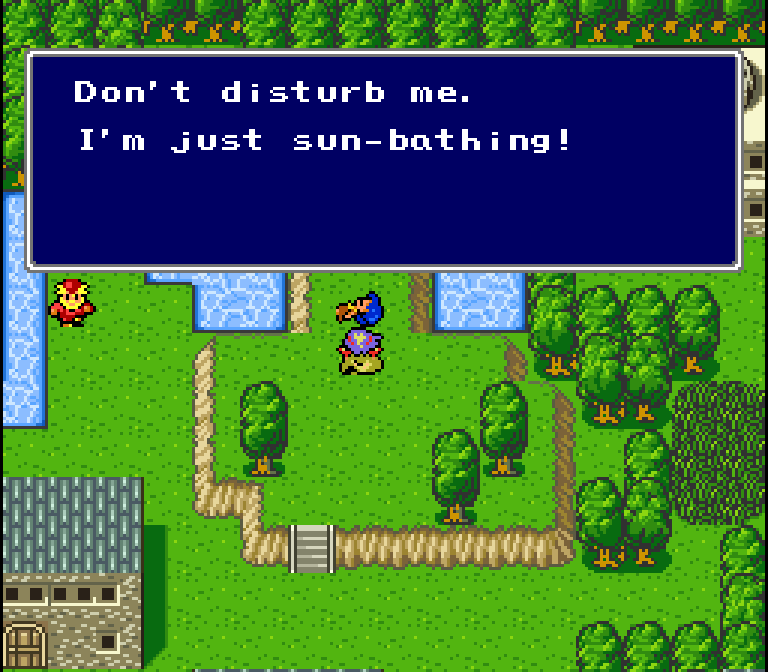 |
| Final Fantasy IV (Super Famicom) | Final Fantasy II (Super NES) |
There’s what appears to be a dead lady on a little hill near the water. If you talk to her, she says:
| Japanese Version (somewhat literal) | English Version |
| How annoying. | Don’t disturb me. |
| I’m trying to sun-bathe here. | I’m just sun-bathing. |
When I visited this town for this comparison stuff, for some reason I was really expecting her to say something different. But nope, it looks like she says the same thing.
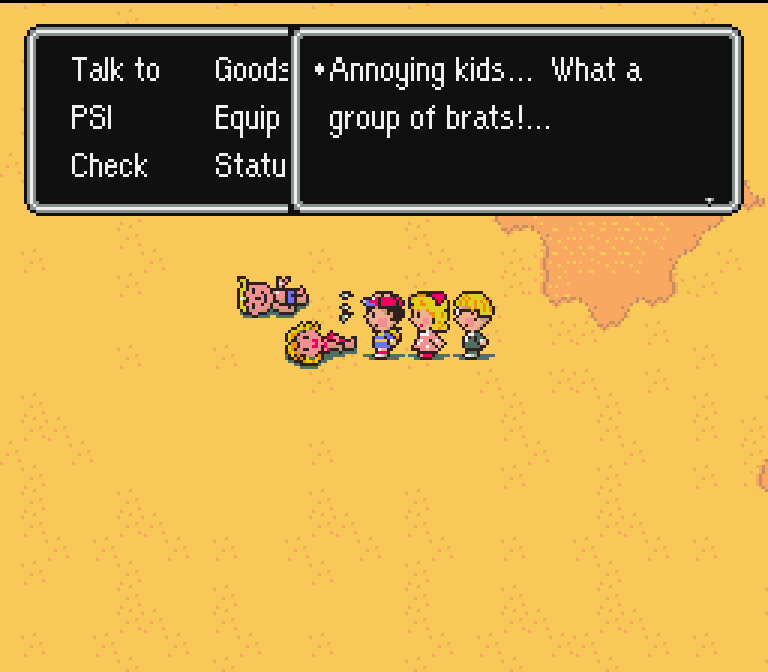
Years later, I thought back to this Toroia lady when I came across a lady in EarthBound in a very similar situation who said something very similar. I guess sun-bathers getting annoyed at you if you talk to them is one of them “tropes” everyone talks about these days, huh?
Let’s Hit the Pub
Compared to other towns, Toroia is really laid-back and is the perfect place for people with vices. One outlet for them is a pub near the center of town.
Unsurprisingly by now, the official Super NES translation changed this building to a cafe:
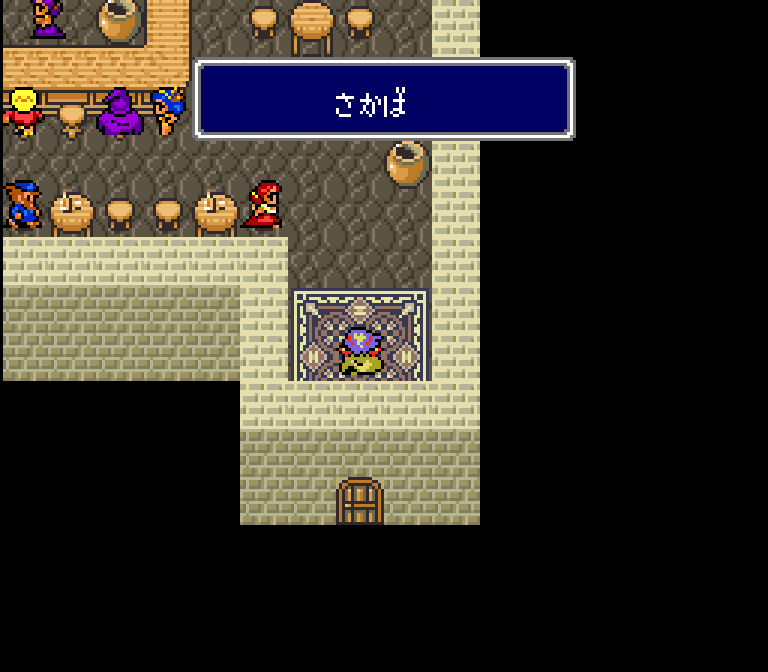 | 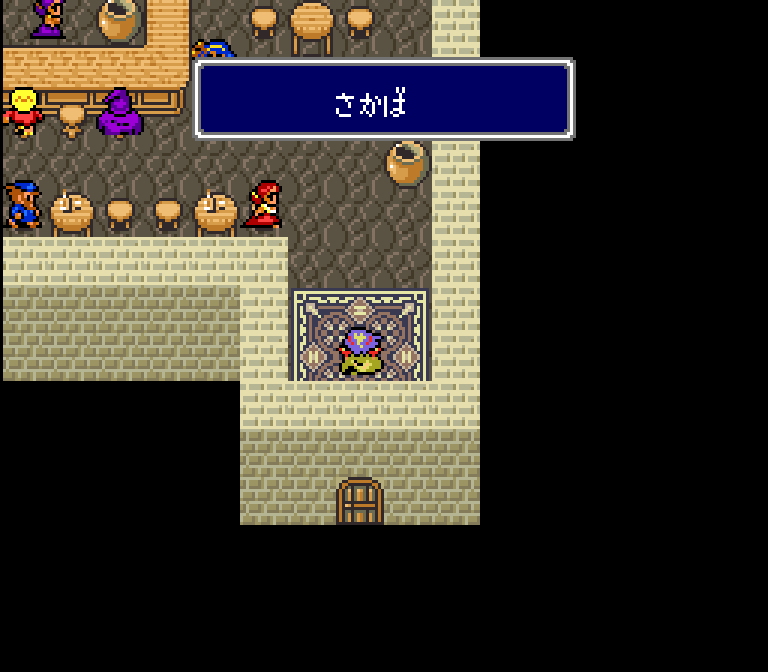 |  |
| Final Fantasy IV (Original) | Final Fantasy IV (Easy Type) | Final Fantasy II (Super NES) |
For some reason, the fan translation leaves it as a cafe?
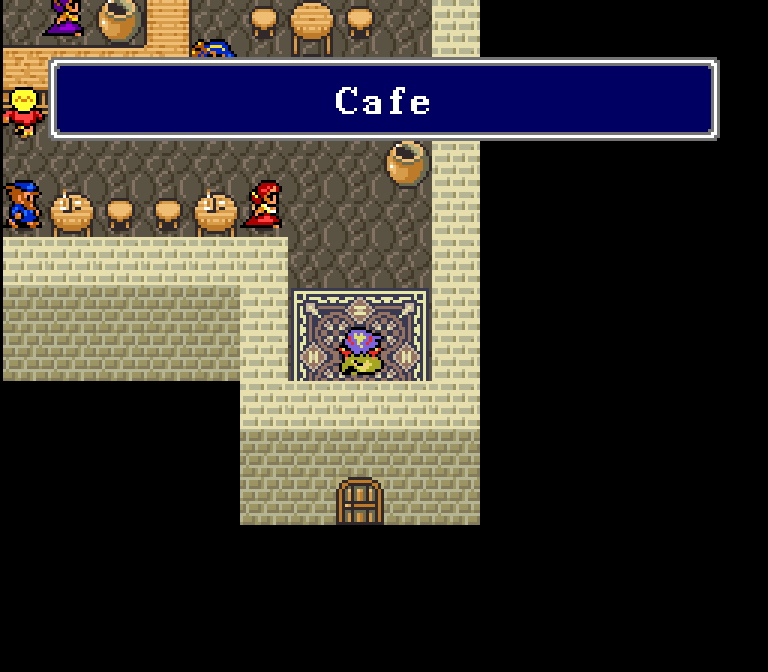
The PlayStation release undoes the censoring and makes it a pub again.
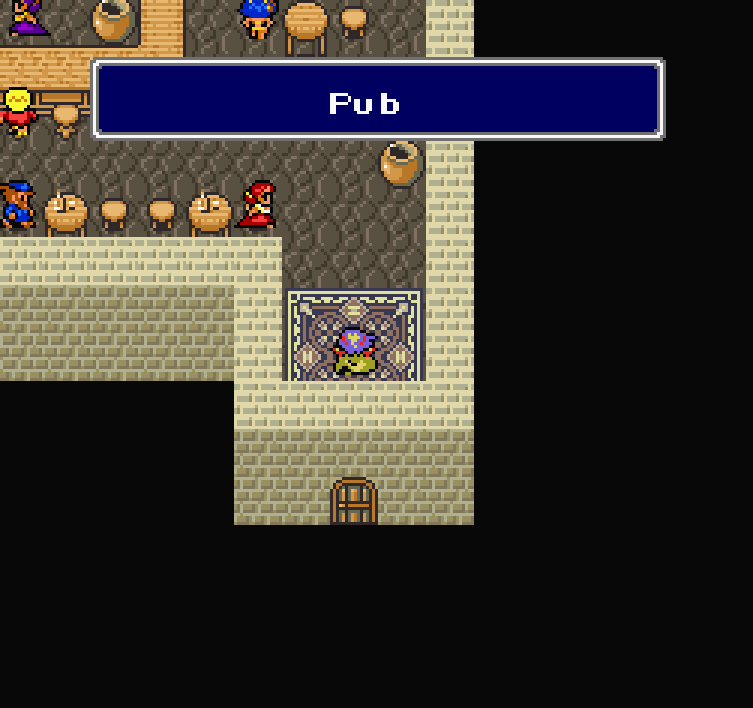
And the GBA version follows suit and keeps it a pub.
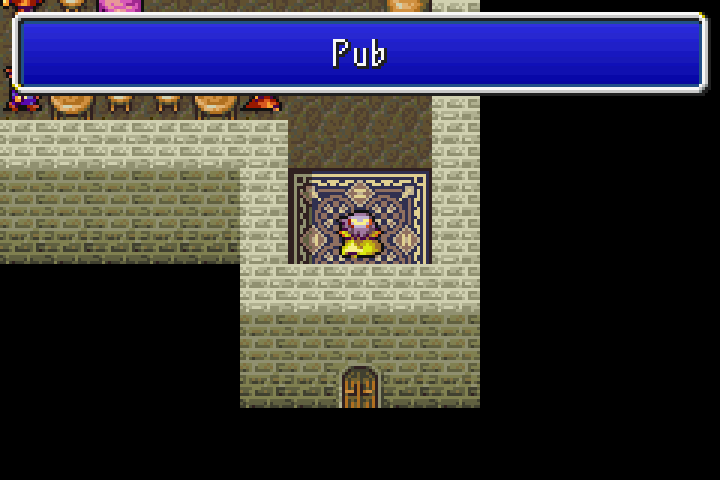
It’s kind of interesting to think that the content was left uncensored for the Sony PlayStation release and then allowed to remain as-is when the script jumped back into Nintendo territory for the GBA release. I guess by this time Nintendo was a lot less wary of mature content in its games.
Buying a Pass
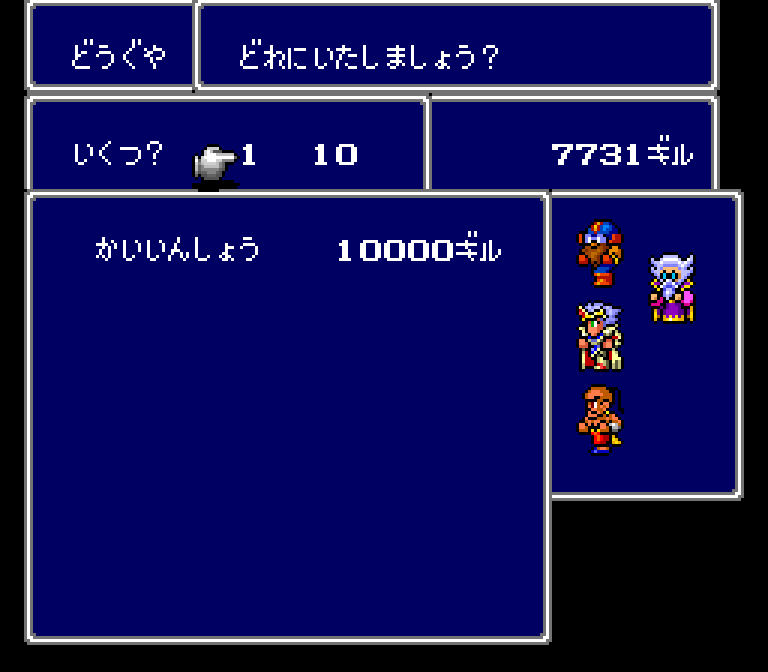 | 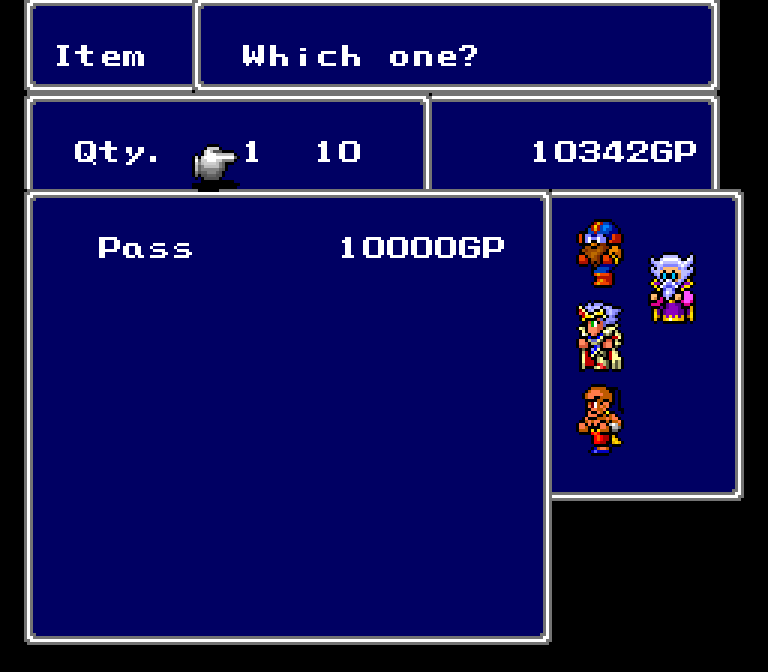 |
| Final Fantasy IV (Super Famicom) | Final Fantasy II (Super NES) |
A lady near the front of the pub-cafe sells just one item.
In the English version it’s a “Pass”, while in the Japanese version it’s technically a “Membership Card”.
Papers, Please
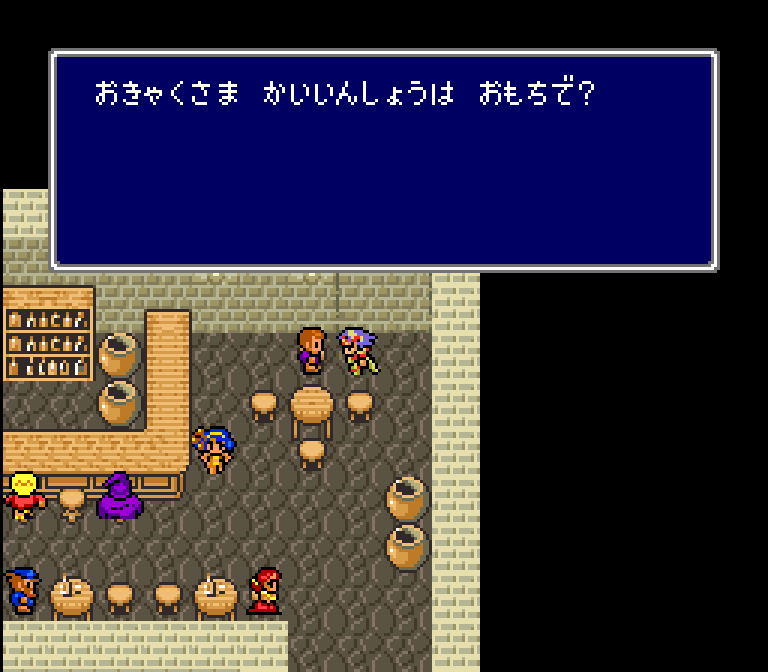 | 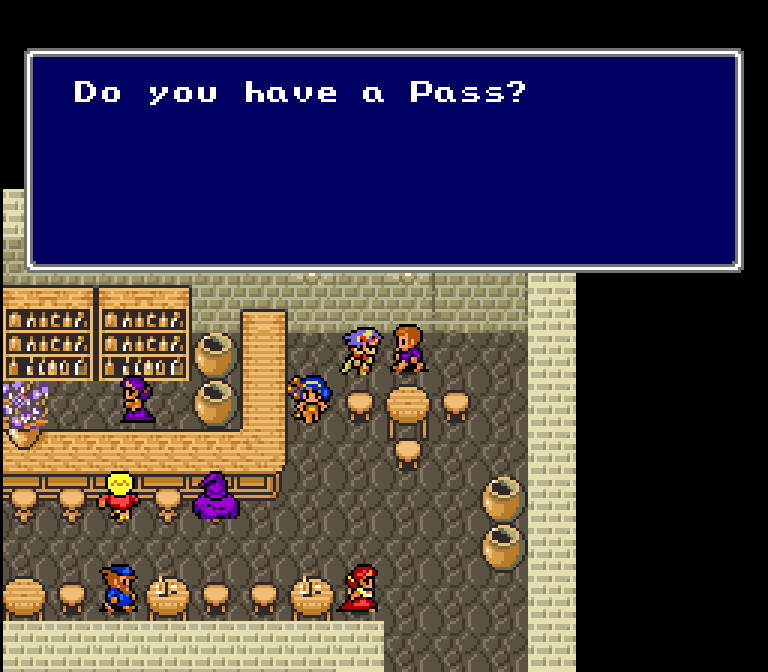 |
| Final Fantasy IV (Super Famicom) | Final Fantasy II (Super NES) |
A guy by a secret entrance asks for your membership card:
| Japanese Version (basic translation) | English Version |
| Do you have a membership card, Sir? | Do you have a Pass? |
In the Japanese version this guy is extra-polite and uses the sort of honorific Japanese speech that you’d find used in a business or establishment of some sort.
The English line doesn’t really convey that courteousness. So this, the fact this place was changed into a cafe, and the fact the item name is changed to “Pass” makes it a bit less clear what to expect behind this door if this is your first time playing.
This Place
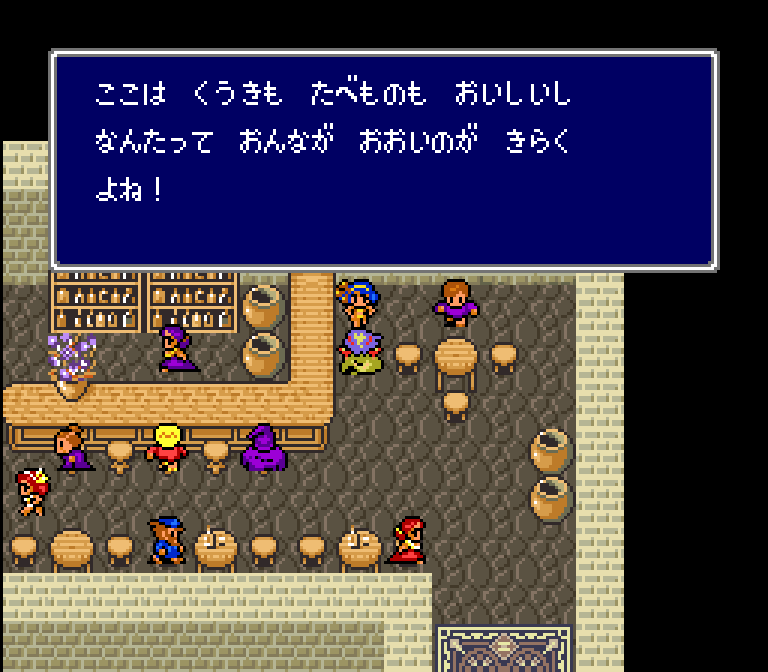 | 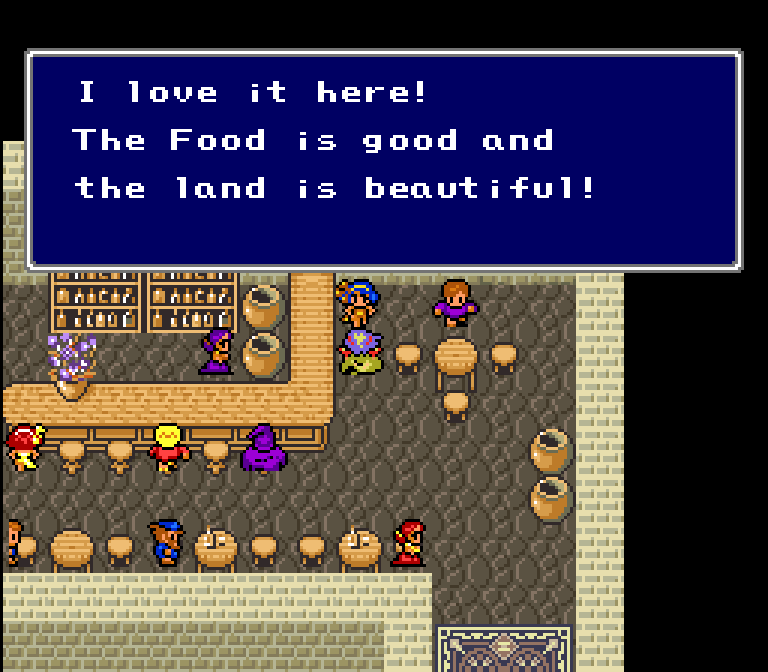 |
| Final Fantasy IV (Super Famicom) | Final Fantasy II (Super NES) |
A woman here shares her opinion with you:
| Japanese Version (basic translation) | English Version |
| The air and the food here are delicious, AND things are so nice and laid-back with so many women here! | I love it here! The Food is good and the land is beautiful! |
Although this is an insignificant line, there is some ambiguity to it that creates a few interesting things to note:
- In the Japanese line, she uses a common phrase that can mean two different things – one is that the air is literally nice and refreshing to breathe in, and another is that the atmosphere of this particular pub is nice. Given that she’s talking about food, I’m going to assume that by “here” she’s referring to this pub and not Toroia as a whole. Normally this wouldn’t be an issue, but then she also brings up the fact that there are so many girls, and since Toroia is a very women-centric place, it makes it a little harder to tell what she means by “here”. Then add in the fact that Toroia is full of trees and water and beautiful nature stuff, the “air being refreshing” definition fits perfectly too. So which is it?
Whenever ambiguities in Japanese text pop up like this, it’s always nice to be able to consult a native speaker of the language – or be a native speaker yourself, which was the case with this game’s translation! And it looks like the official translator interpreted this line to be talking about Toroia as a whole, since the girl mentions the land being beautiful.
- For some reason, “Food” is capitalized in the English translation.
- The line about there being so many women here is missing in the translation entirely. The Japanese line basically says that being surrounded by so many other girls makes her feel much more comfortable and carefree than normal, which suggests that being surrounded by lots of guys somewhere else wasn’t really something she enjoyed. Again, does this tie in with Toroia as a whole or just this particular pub? If anyone with insight has some thoughts or info, let me know!
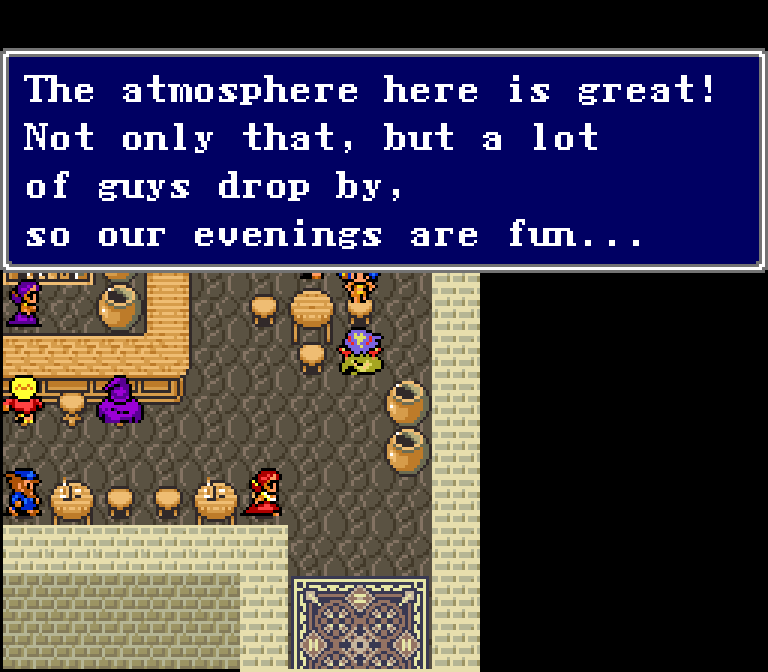 | 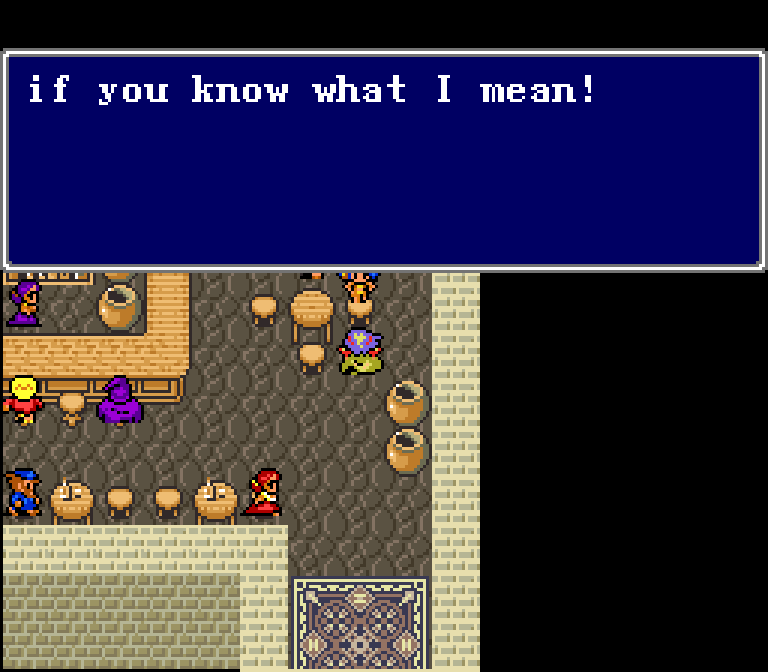 |
The fan translation handles this line by going with:
The atmosphere here is great!
Not only that, but a lot of guys drop by, so our evenings are fun… if you know what I mean!
The fan translation drops the mention of the food here being nice. It also goes with the “atmosphere” choice, meaning the fan translators felt she was talking about this specific pub and not all of Toroia.
More importantly, though, she now talks about how she loves it how guys drop by so she can have adult fun with them. That’s actually the exact opposite of her character and her line in the original game, though, so this is another instance where the fan translators tossed aside the original text in favor of a juvenile addition.
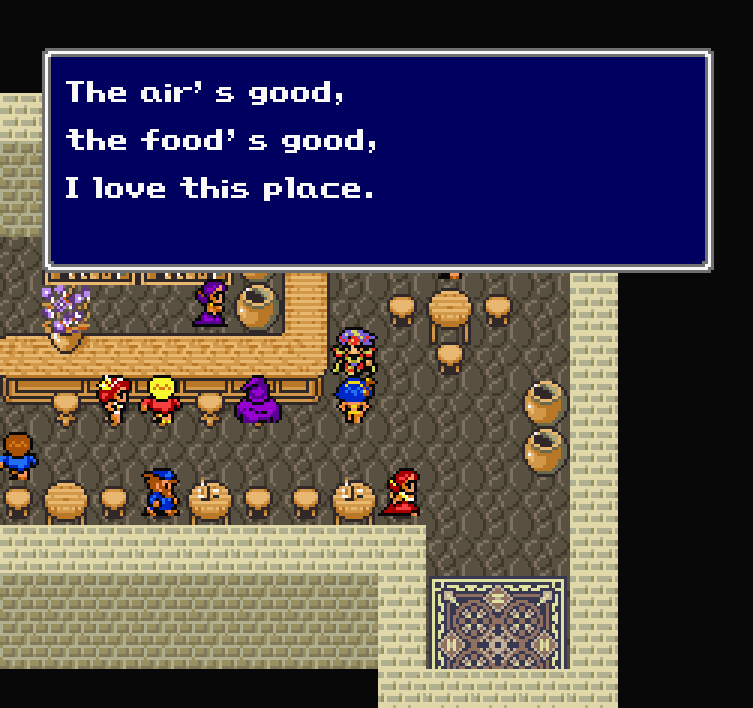 | 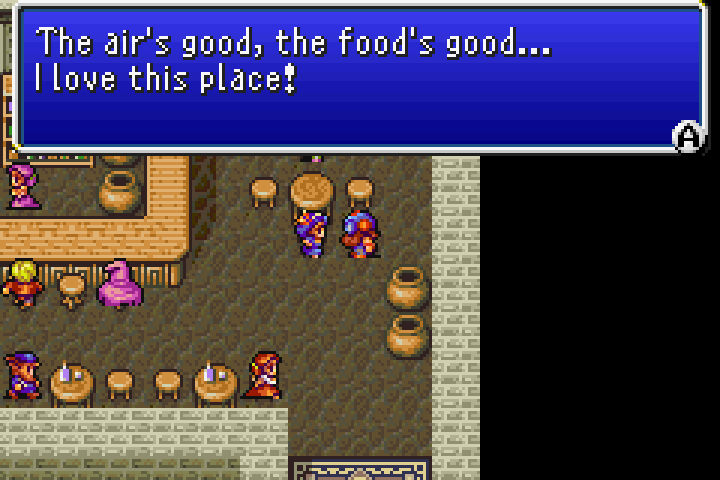 |
| PlayStation translation | Game Boy Advance translation |
While we’re at it, I thought I’d check the PlayStation and GBA translations too. The PlayStation has:
The air’s good, the food’s good, I love this place.
The GBA translation’s pretty much the same, with some different formatting. So both are missing the part about there being so many women here.
Don’t Go to Heaven
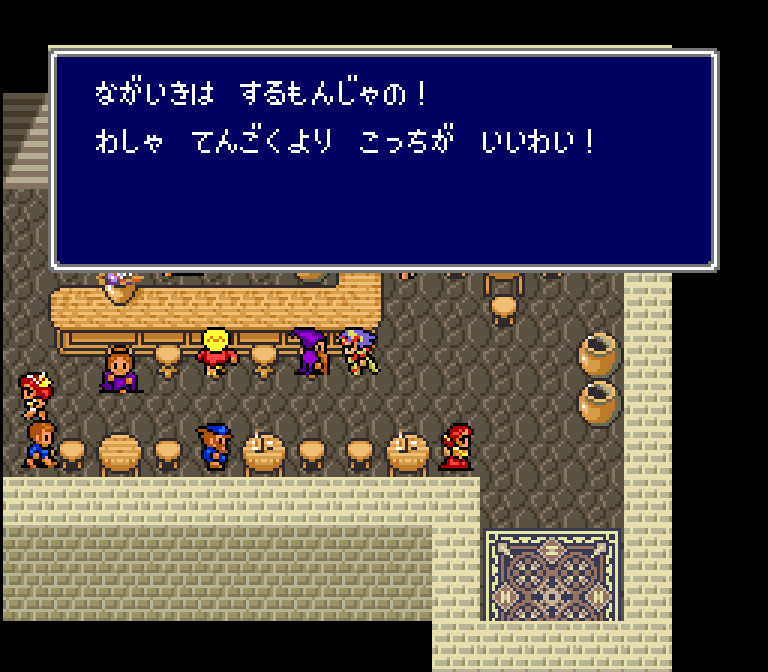 | 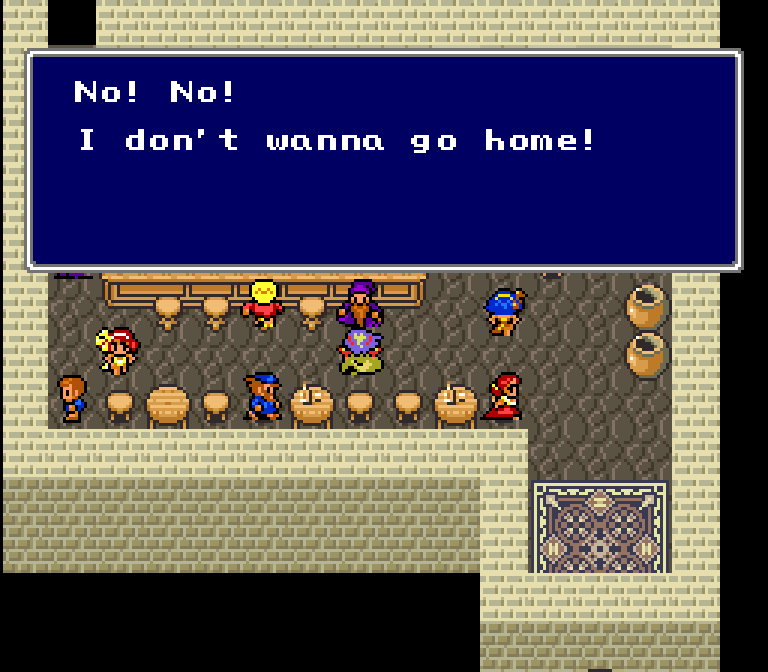 |
| Final Fantasy IV (Super Famicom) | Final Fantasy II (Super NES) |
An old man at the counter is happy to be here:
| Japanese Version (basic translation) | English Version |
| Living a long life is worth it! | No! No! |
| I prefer this over Heaven! | I don’t wanna go home! |
The details of this man’s line were pretty much changed entirely, although in the end he’s still saying the same thing – that he really likes this place.
I think the English line might’ve confused me as a kid, because this place is supposed to be a cafe, and this guy’s line made it sound like Cecil wants him to go home or something.
Part of the reason why this line was changed might’ve had to do with the reference to “Heaven” in the original text. Removing religious content was definitely a big part of Nintendo’s policy at this point in time, so it’s not too surprising to see this.
Hotties Galore
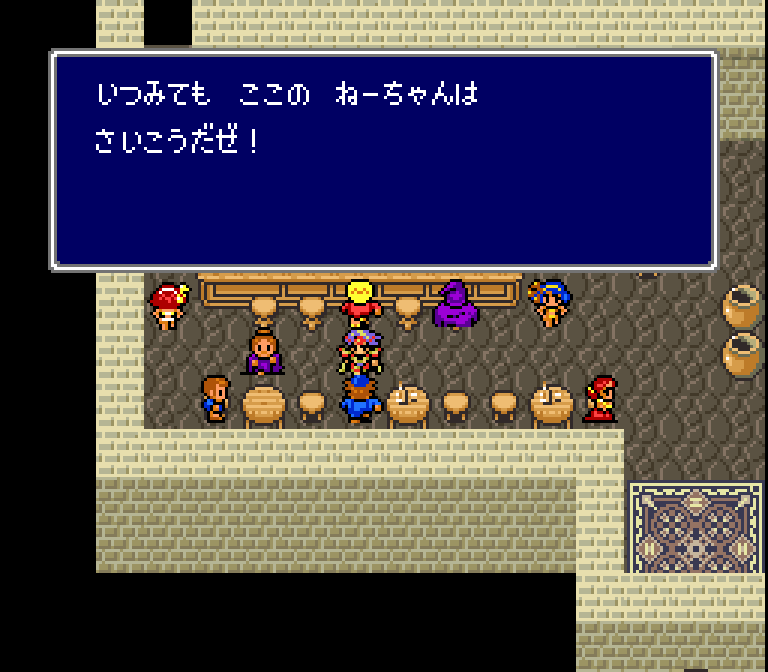 | 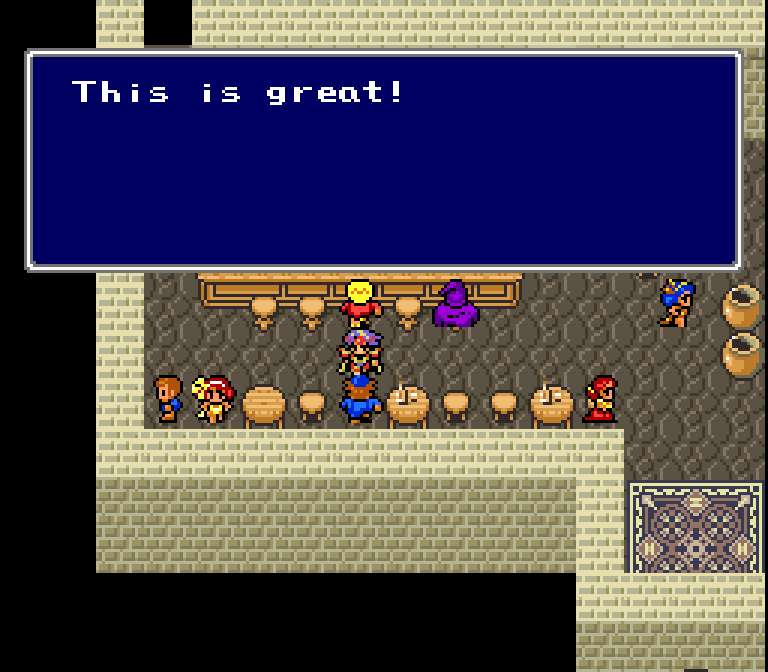 |
| Final Fantasy IV (Super Famicom) | Final Fantasy II (Super NES) |
A possibly bearded guy also comments on this establishment:
| Japanese Version (somewhat literal) | English Version |
| The chicks here never cease to be amazing! | This is great! |
There are actually several layers to what one might consider a “literal” translation, so an even more literal translation would be something like, “No matter when I see them, the girls in this place are the greatest!”
For whatever reason, this line was changed to simply say, “This is great!” in the English version. I guess since this place is supposed to be a cafe now, it’d be weird for him to ogle the girls? Or maybe it was just because it seemed sexist or something?
Counter Quest
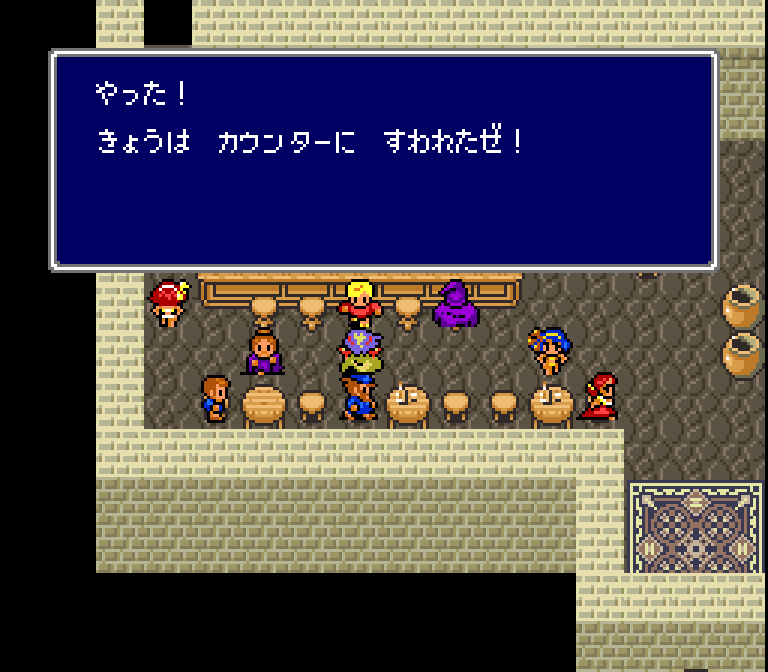 |  |
| Final Fantasy IV (Super Famicom) | Final Fantasy II (Super NES) |
A guy sitting at the counter seems pretty happy:
| Japanese Version (basic translation) | English Version |
| All right! Today I managed to sit at the counter! | Hi! How are you doing? |
Oh, come on, that’s not even trying! It’s starting to feel like someone in charge went through and changed all the text in this part of the game to tone things down a bit. I can understand why, but they could’ve at least put some more thought into the replacement lines.
In fact, I’m not even sure why this line would need to be changed at all. He’s just happy that he finally managed to sit at the counter, either because it used to always be too crowded or that he worked up the courage to sit there.
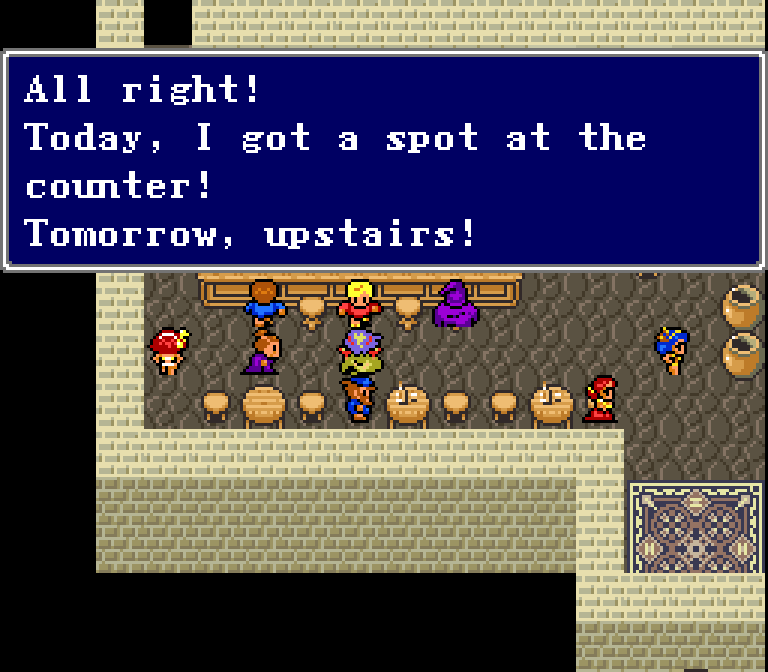
The fan translation translates this line as:
All right!
Today, I got a spot at the counter!
Tomorrow, upstairs!
The first half is perfect, and even though the last sentence was made up out of nowhere, I like it. It actually fits well with what was originally intended and doesn’t detract from anything. I could see something like this in an official localization, in fact. Here’s hoping the fan translation starts to pick up!
What’s Up, Paladin?
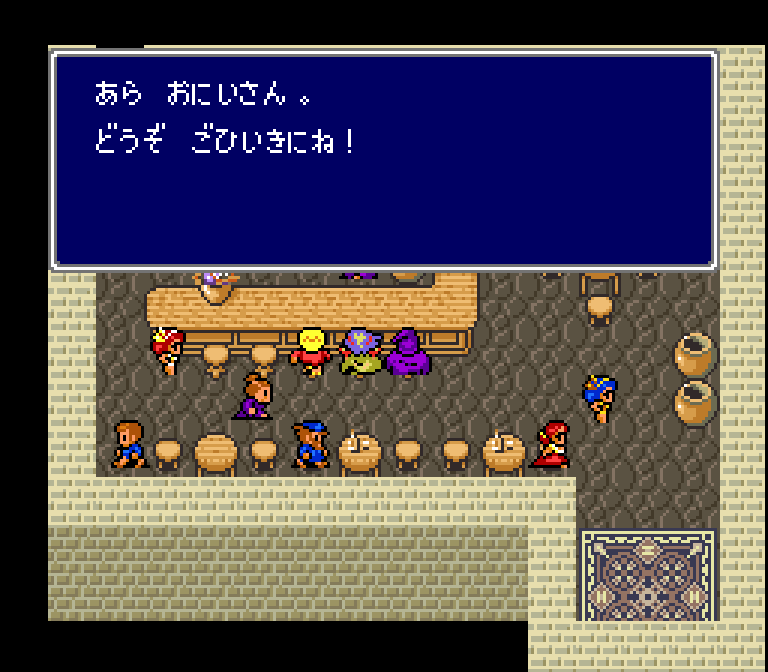 | 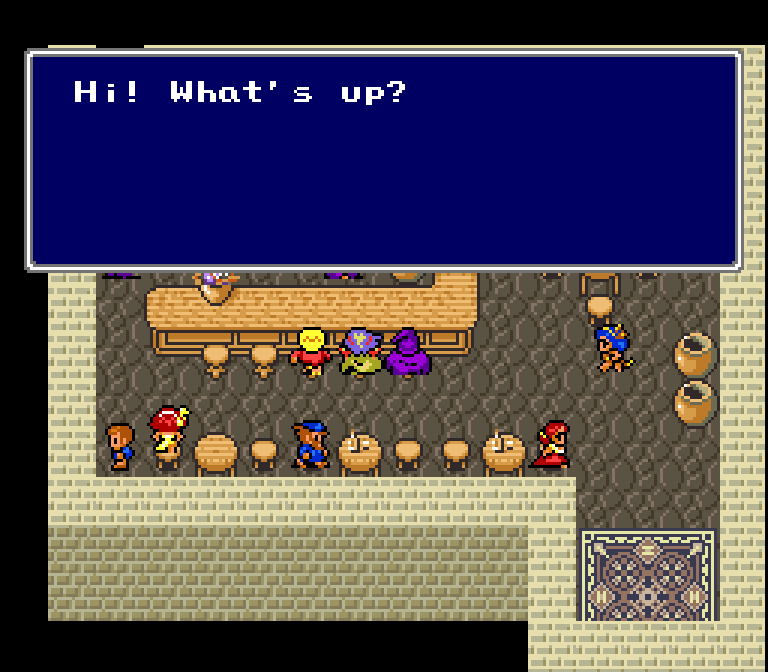 |
| Final Fantasy IV (Super Famicom) | Final Fantasy II (Super NES) |
The bartender lady has a short little thing to say too:
| Japanese Version (basic translation) | English Version |
| Oh, young man. Please give us your repeat patronage! | Hi! What’s up? |
Again, the English line doesn’t try to translate the original line or try to be creative with a new line. I don’t know why they’d replace lines here with bland filler text, it’s a mystery.
That said, the Japanese line is a little tough to phrase well. First, she talks in a kind of cute way to Cecil, and her second line sounds weird in translation but is a pretty simple phrase in Japanese that means something like, “Please give us/our company special treatment with your regular patronage.”
For reference, the fan translation goes with “Hello! What’s your pleasure?”
The PlayStation translation uses, “Give me a holler if ya want something.”
And the GBA translation tweaks that a bit with, “Give me a holler if you want something!”
The Touch of an Older Woman
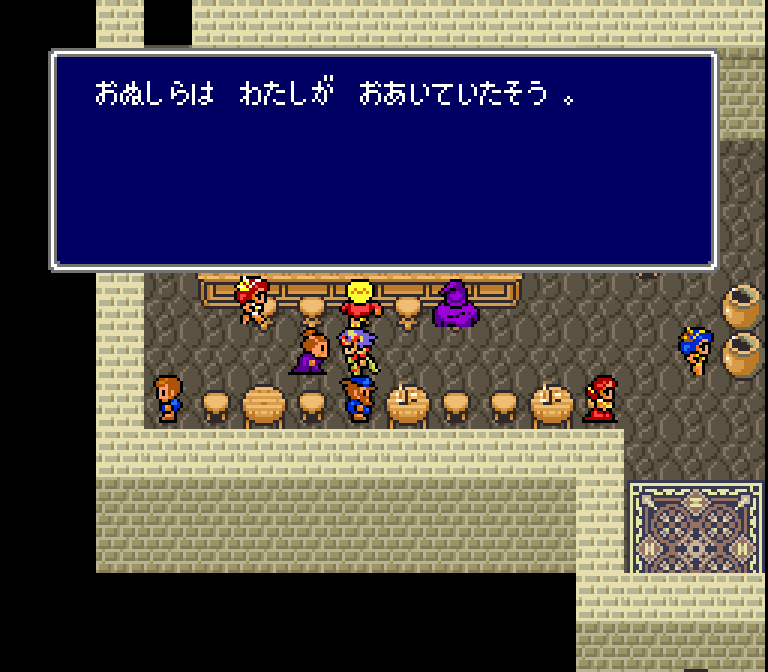 | 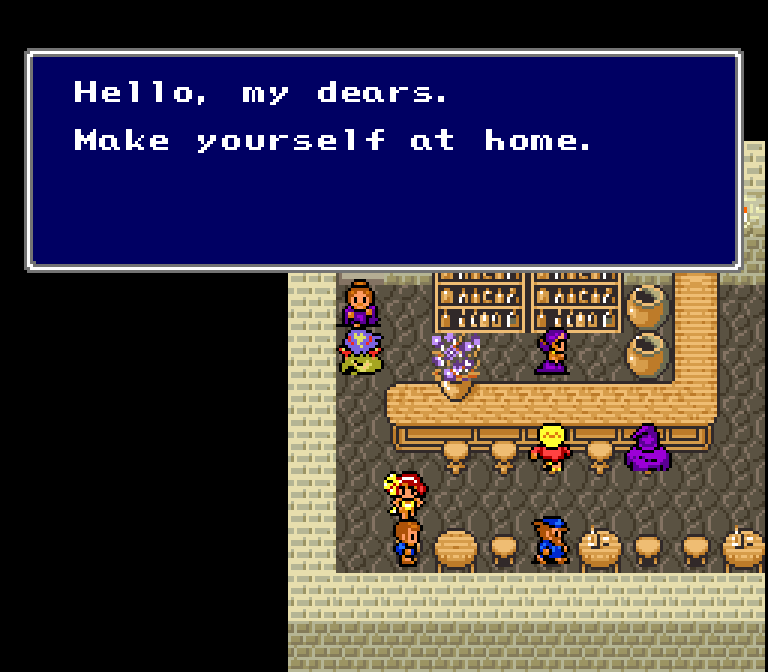 |
| Final Fantasy IV (Super Famicom) | Final Fantasy II (Super NES) |
An old lady is walking around here. What she says is a bit different between versions:
| Japanese Version (basic translation) | English Version |
| Allow ME to give you folks company. | Hello, my dears. |
| What’s with that look?! | Make yourself at home. |
In the Japanese version, she speaks in a really over-the-top “old person” style that’s a little hard to convey in English, although I’m impressed with the use of “dears” in the English translation to try to accomplish it.
In the Japanese version of this game, this place is a pub and a hostess club, so she’s basically saying that she’ll be your sexy hostess who you can pay to drink and chat with.
Except she’s obviously very old, so her second line suggests that Cecil and friends have a shocked or grossed-out look on their faces.
This wouldn’t make much sense in the English version since the place was changed into a cafe, plus I’m not sure hostess clubs were well known outside of Asia at this point in time. So it was a logical choice to change what this lady says. But in doing so, the localizers made an English grammar mistake and used “yourself” in reference to “dears” instead of “yourselves”.

I was curious to know how the fan translators handled this lady’s line, and it turned out to be:
You seem to want to spend some quality time with an older, more mature woman.
What’s with that look!?
At first glance it seems similar to the original text, but on closer inspection it looks like the translator didn’t recognize the word いたそう, an old, not-really-everyday word that means something like “I shall” or “allow me to”, and mistook it for a piece of grammar that means “it seems like”. Except that grammar rule wouldn’t apply here for a number of reasons.
If that all goes over your head, it’s basically clear this and several other lines in the fan translation were translated by someone still in the early stages of learning the language. I can say that with certainty because I was very much in the same situation long ago.
Deep Conversations
 | 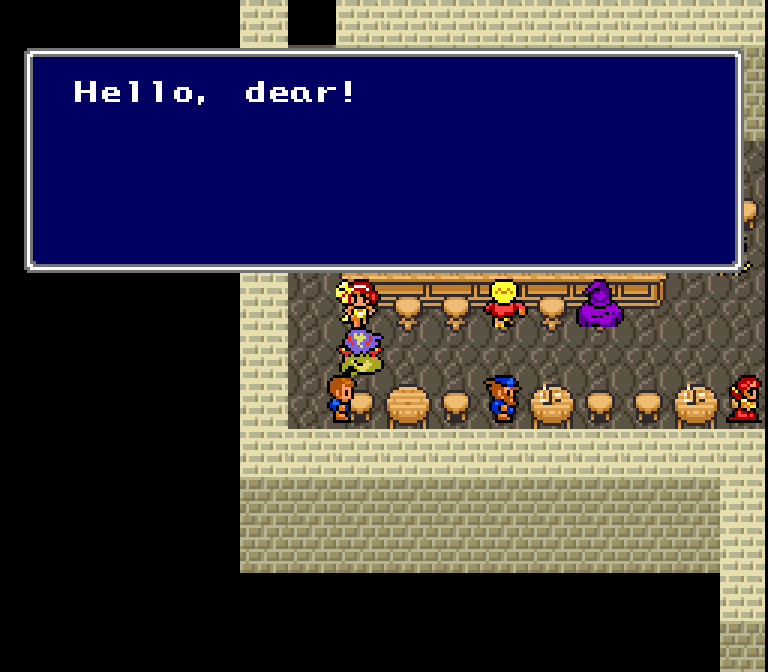 |
| Final Fantasy IV (Super Famicom) | Final Fantasy II (Super NES) |
Another girl in this room greets Cecil:
| Japanese Version (basic translation) | English Version |
| Oh, little boy! | Hello, dear! |
| You’re actually kind of cute! |
The English line was changed quite a bit – again it’s just filler material meant to replace the original text for whatever reason.
In the Japanese line, she refers to you using “boku”, which is usually a way that boys say “I” or “me” in Japanese, but sometimes it’s also used in the second-person form like this in reference to young boys.
Why she’s talking to you this way I’m not really sure, though. Maybe it’s meant as silly flattery or something like that.
Mistaken Identity
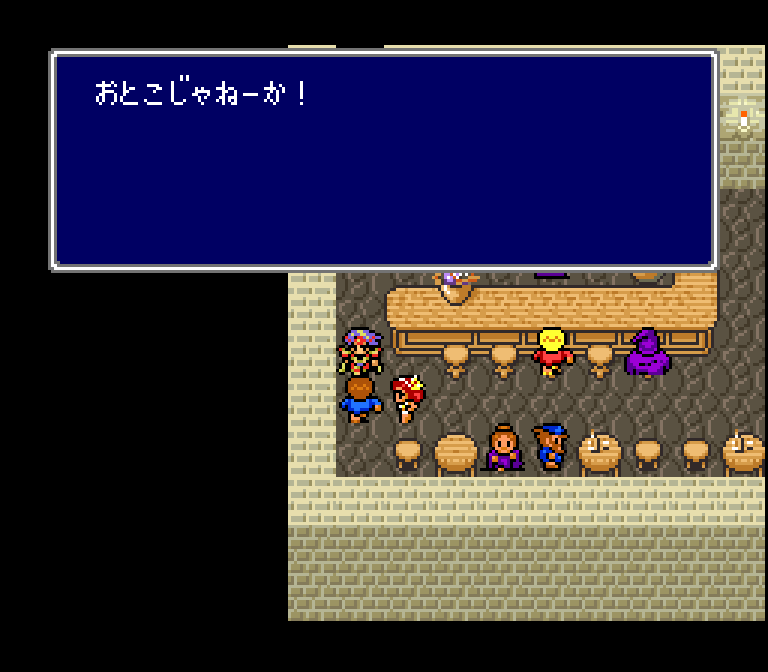 |  |
| Final Fantasy IV (Super Famicom) | Final Fantasy II (Super NES) |
Another guy hanging out here has a case of mistaken identity.
| Japanese Version (basic translation) | English Version |
| Mama-! | Having a good time? |
| I love you! | |
| Gah! | |
| You’re a man! |
Again, the translation’s been replaced with fluff. There was no attempt at trying to recreate the joke here that the guy mistook Cecil for a girl.
The Japanese line has him yell, “Mama-!” Currently, my only assumption here is that it’s related to the term “mama-san”, in other words, the guy thought Cecil was an important woman here. I’m not very familiar with Japanese lingo in these types of places, though, so I’m not really happy with my guess. I have other theories I’m even less sure about, so if anyone has any more detailed info or insight, let me know!
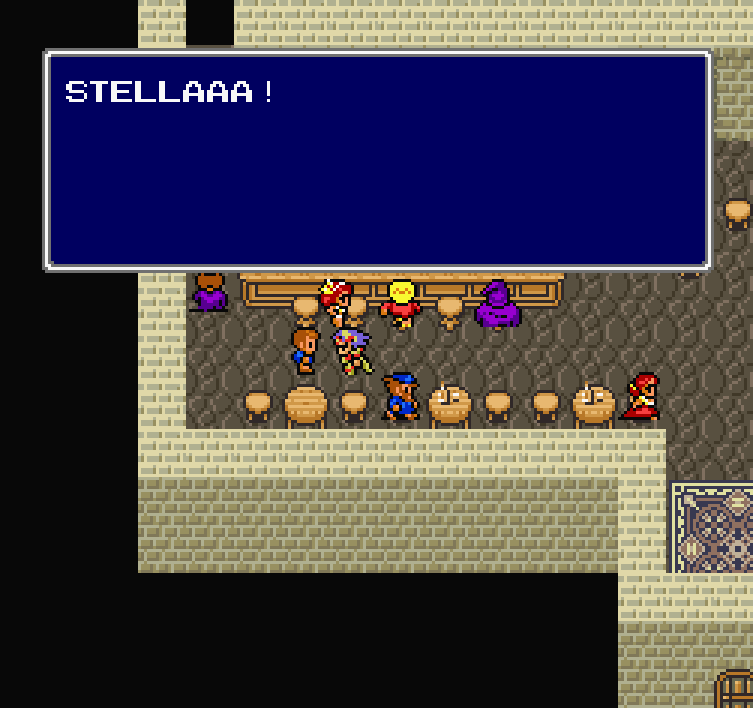
The PlayStation translation handles things differently:
STELLAAA!
I LOVE YOUUU!
Gah!
Why does this (expletive) always happen to me…?
This seems to be a cultural reference to the famous play, A Streetcar Named Desire. As far as I can tell, the original line wasn’t a cultural reference, though. You know, between lines like this, the fan translation’s many cultural references, and the GBA translation’s Internet in-jokes, it seems like everyone wants to sneak references into this game. I wonder why that is…
Anyway, the PlayStation translation also leaves out this guy’s explicit realization that Cecil is a man and not a woman. Without having looked at the original Japanese text, I wouldn’t have really understood this translation by itself and would’ve thought that he’d been dumped by his girlfriend named Stella rather than surprised that Cecil’s a dude.
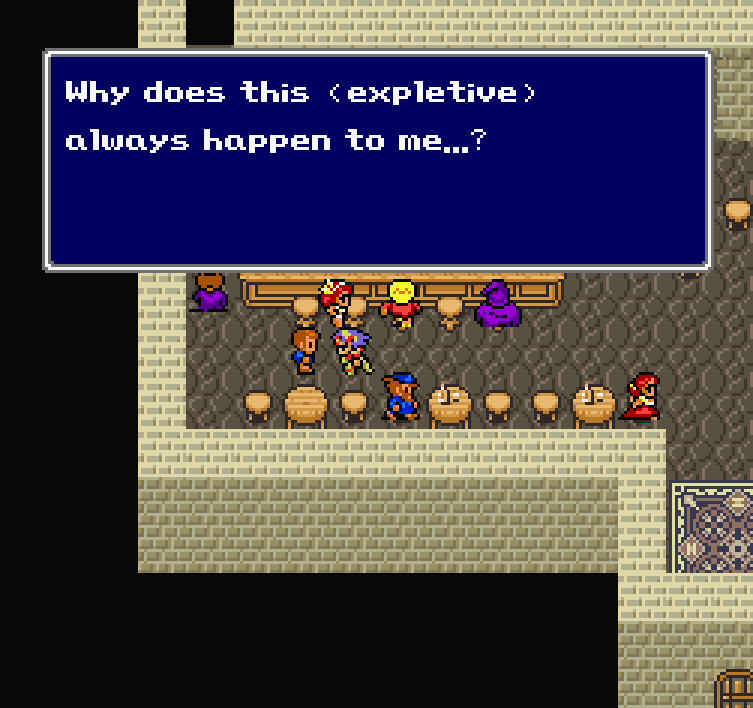
It’s also strange seeing the script actually say “(expletive)”. We’ve seen a few other instances of things like this in the PlayStation translation, like the wizard in Mysidia who says “blankety-blank”. I guess this was done for humor’s sake, but more than anything it seems pretty unprofessional to handle it this way.
Especially when actual bad words are used just one step away from this guy:
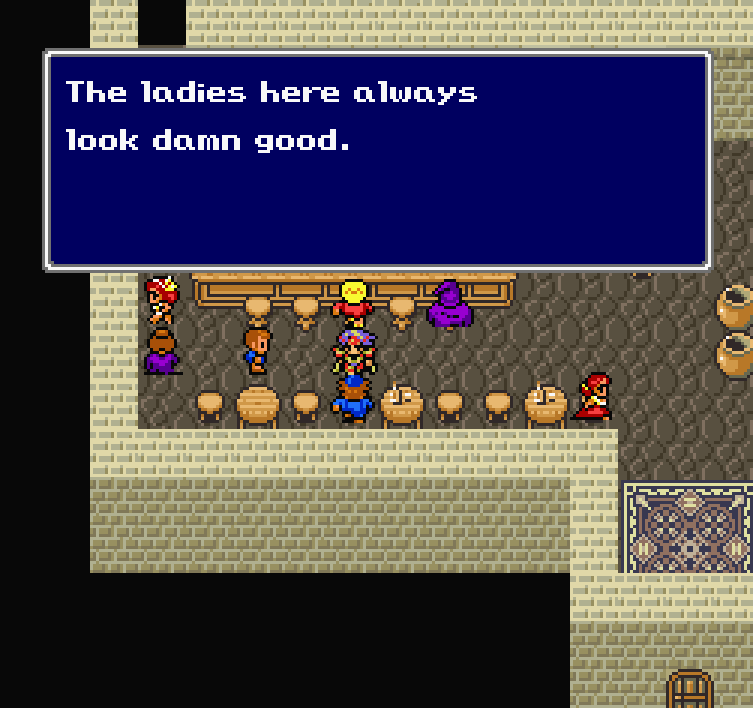
Of course, since the GBA translation uses the PlayStation translation as a base, this Stella reference remains in the script.
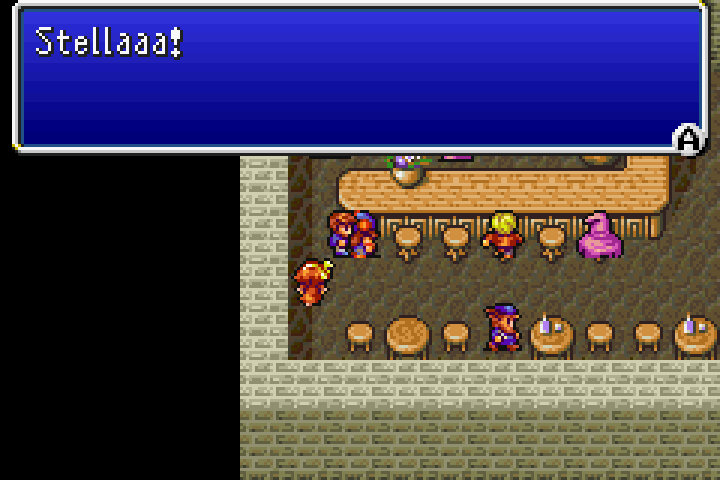
The odd “(expletive)” line was changed to “…You’re a man…!?” though, which at least brings it a little closer to the original text. But that then leaves the question of, “Why would he yell ‘Stellaaa!’ at Cecil in the first place?”
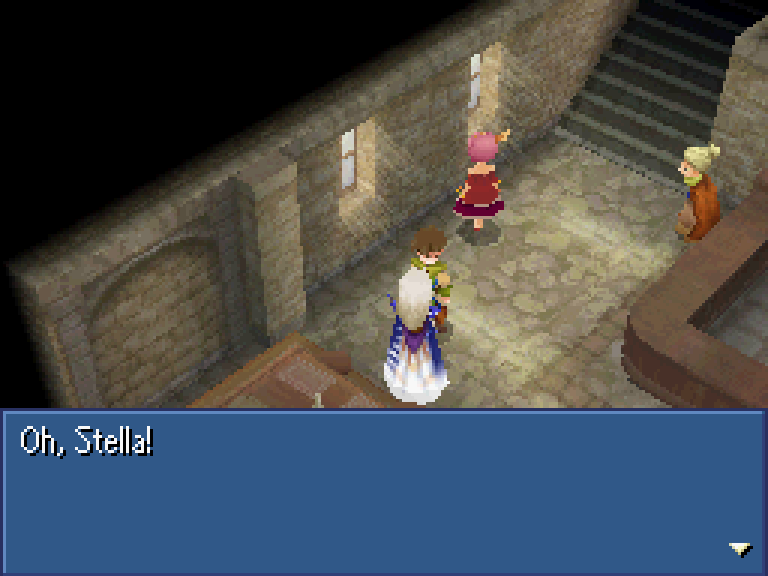
Surprisingly, even the DS translation retains the Stella reference. It fixes some of the ambiguities created by the other translations though:
Oh, Stella!
How I love you!
Hey, wait a minute, Stella…
You’re not really a woman, are you!?
Need Dough
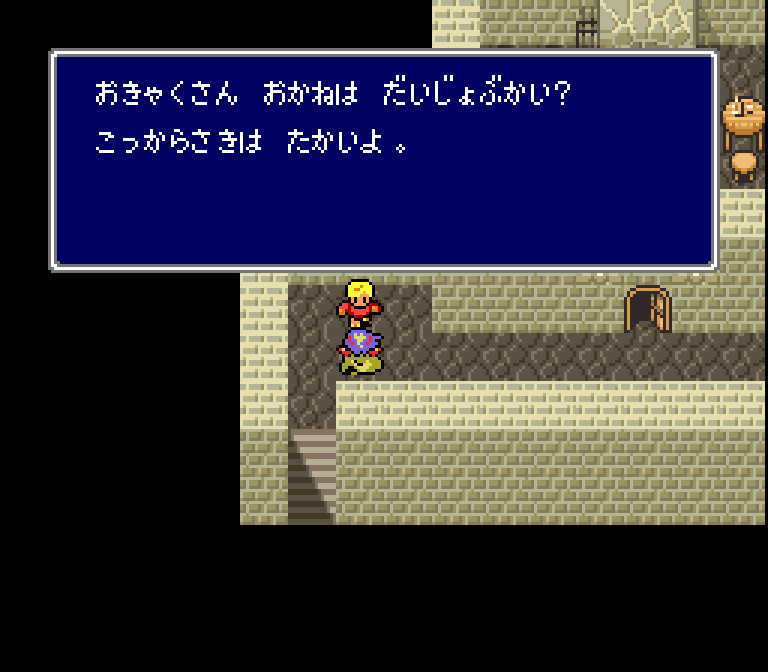 | 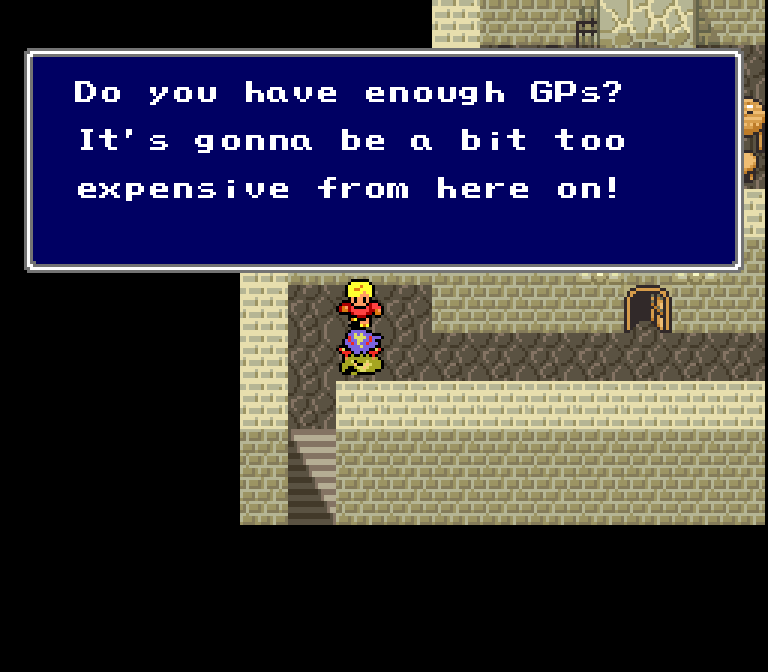 |
| Final Fantasy IV (Super Famicom) | Final Fantasy II (Super NES) |
Walking upstairs will take you to a hostess club area of the building. A guy is waiting at the top of the stairs to greet you:
| Japanese Version (somewhat literal) | English Version |
| Are you okay money-wise, sir? | Do you have enough GPs? |
| Everything past here is going to be expensive. | It’s gonna be a bit too expensive from here on! |
What I find interesting here is how the mention of money in the Japanese version was changed to “GPs” in the translation. Keeping it as “money” would’ve been a clearer choice.
Also, since “GP” stands for “gold point” or “gold piece” or something like that, that’s why it includes a lowercase “s” when abbreviated to “GP” – it’s pluralizing the “point” part. Even other games treat these abbreviations as plural in one way or another – EarthBound instantly comes to mind, for example.

Still, I’ve never been fond of this style – most people will say it out loud like, “Oh man, I just lost 500 HP!” or “Crap, I’m out of MP!”, you know? So these “Make sure to add an ‘s’!” or “Make sure to use ‘are’!” grammar rules always felt unnecessary and pedantic to me. I don’t know, I’m probably in the minority though. Or maybe English speakers as a whole are still in the process of figuring out how to handle weird new situations like this.
What makes it even weirder, though, is that Final Fantasy IV’s English translation doesn’t handle this consistently. For example, if you run away from a battle and lose some money, it says “GP” rather than “GPs”:
 | 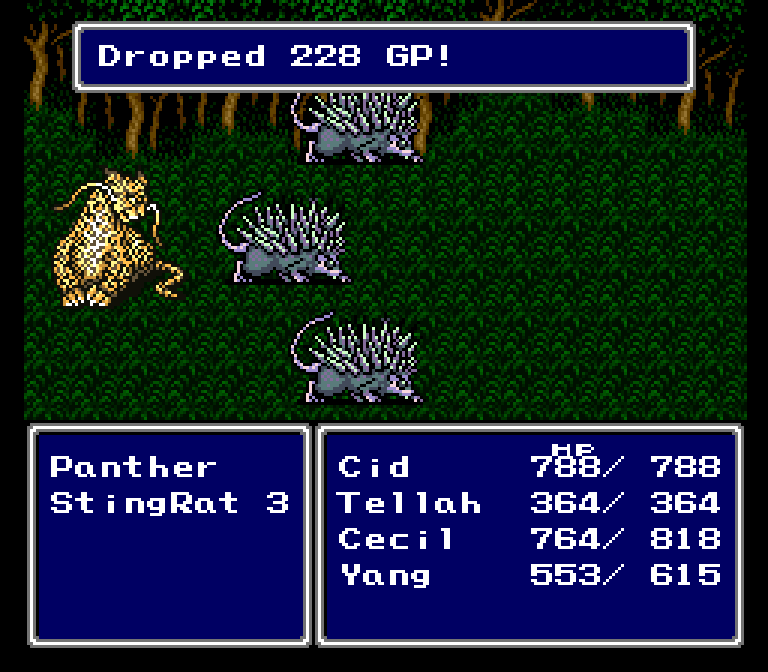 |
| Pluralized with 's' | Pluralized without 's' |
Anyway, getting back on track, another interesting about this guy’s line is that the use of “a bit too expensive” in the English translation gives it the slight nuance that he knows the details of your finances and feels you’re some poor schmuck who probably doesn’t belong here. The original line doesn’t have that so much, it’s more just a statement that things are pricey up here.
Exclusivity
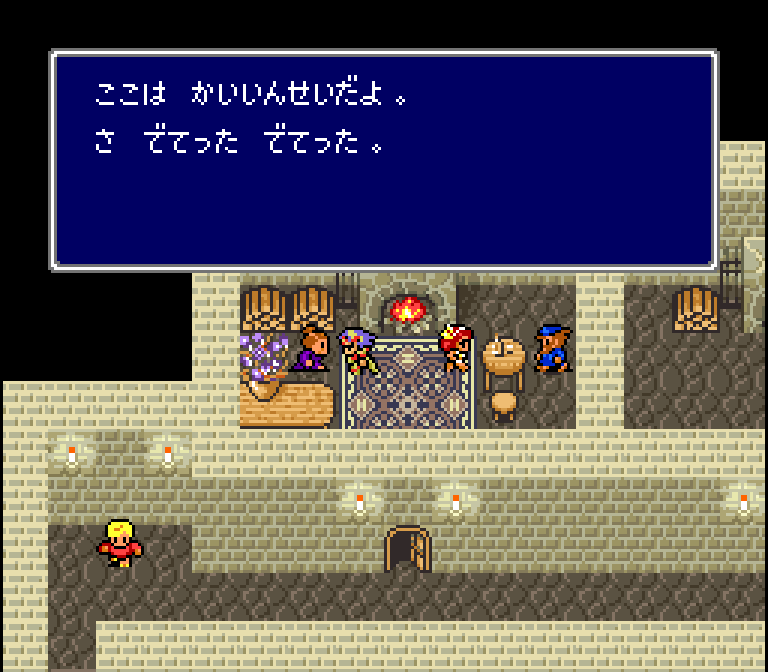 | 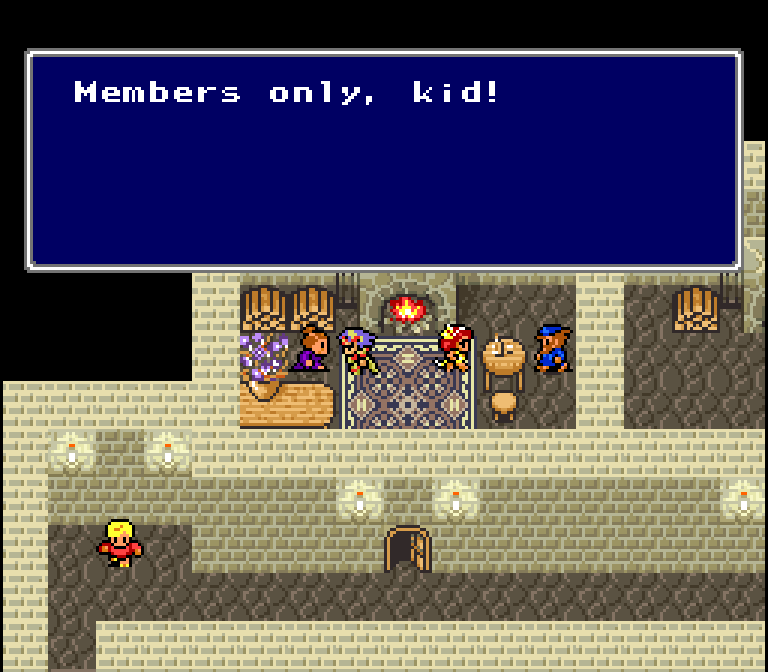 |
| Final Fantasy IV (Super Famicom) | Final Fantasy II (Super NES) |
An old lady in the first upstairs room doesn’t like you being there:
| Japanese Version (basic translation) | English Version |
| Only members are allowed here. | Members only, kid! |
| Now get out, get out. |
Basically, in the English version she doesn’t tell you to your face to get out.
Hostess Side
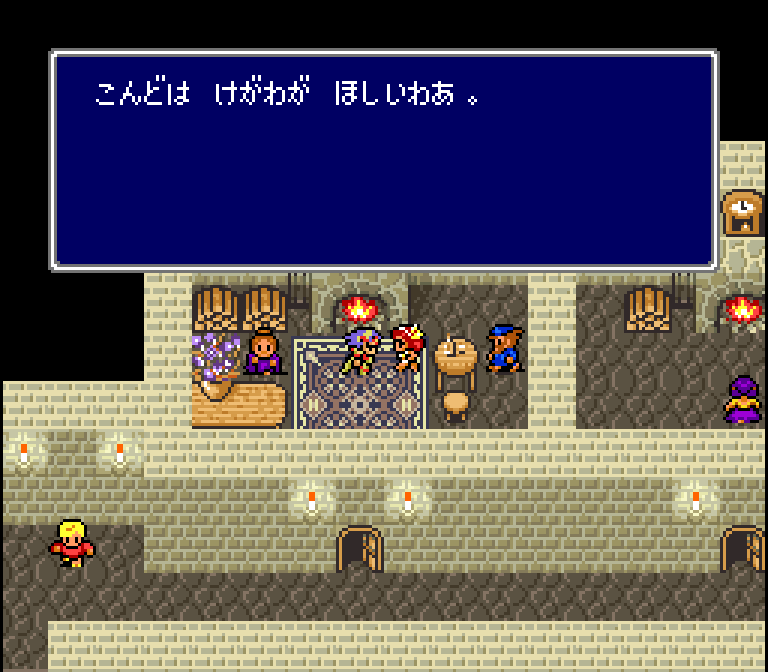 | 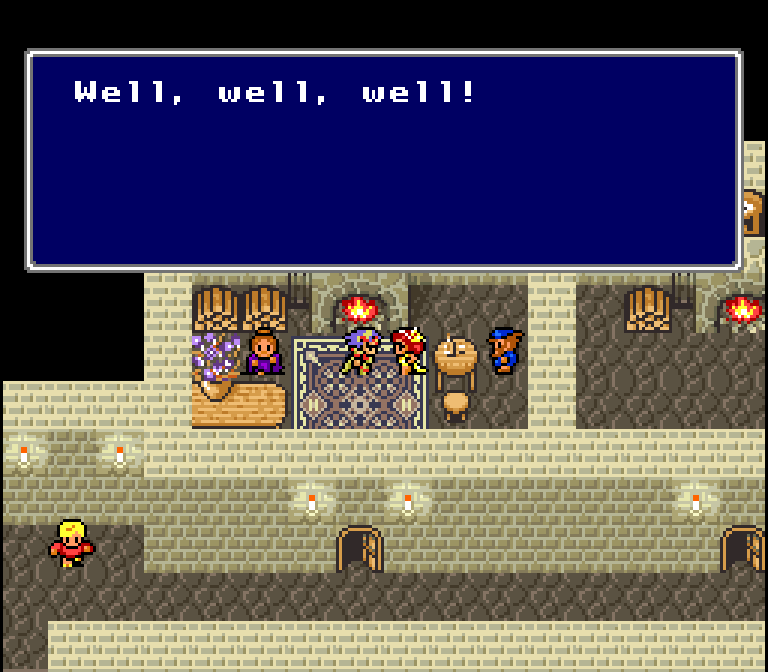 |
| Final Fantasy IV (Super Famicom) | Final Fantasy II (Super NES) |
One of the hostesses is entertaining a client:
| Japanese Version (basic translation) | English Version |
| Next time I want furs. | Well, well, well! |
This English translation is a pretty big departure from her original Japanese line, which is the sort of thing you’d expect to hear from a girl working at a hostess club. Basically, at these places, men pay lots of money to sit and chat with girls of their choosing, and then the men buy drinks, food, and such for himself and the girls. The girls give the guy company, pretend to fawn over him, and ask him to buy them expensive stuff.
Anyway, because these hostess clubs aren’t as commonplace in North America as in Japan, I guess the localizers decided to rewrite a lot of the text here with that cultural difference in mind. As a kid I always felt like something was “off” about what everyone was saying here – I guess this is why.
All that aside, this girl talks in a particularly girly way in the Japanese line. She’s also talking to the client in the Japanese version, but the English version has her talking to Cecil instead. …I think. I’m actually not sure where this “Well, well, well!” came from or what it’s meant to mean. But my translator instincts suggest to me that this replacement line was done by someone on the Japanese side.
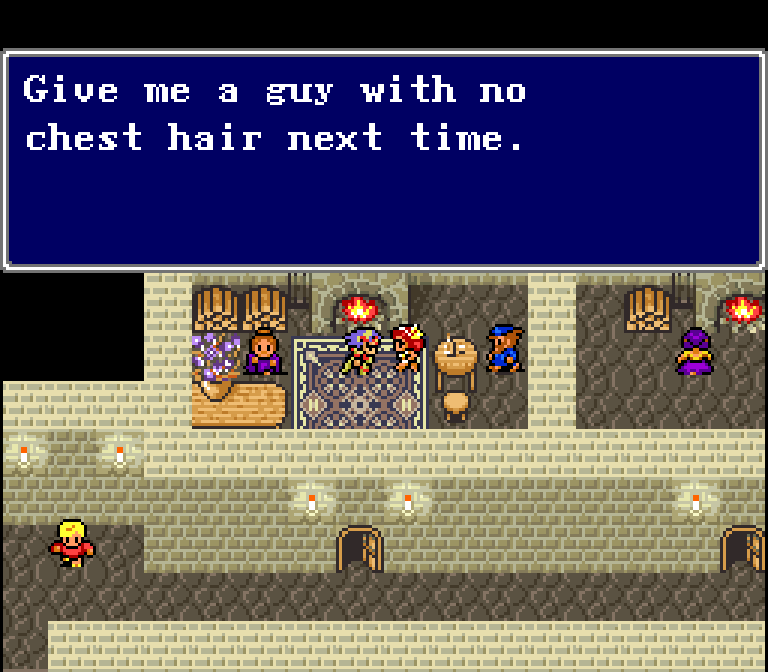
The fan translation uses an odd choice for this line:
Give me a guy with no chest hair next time.
The fan translation is supposed to be the most faithful translation of all, but it actually changes the line completely, making it no different from how the official translation was handled.
Client Side
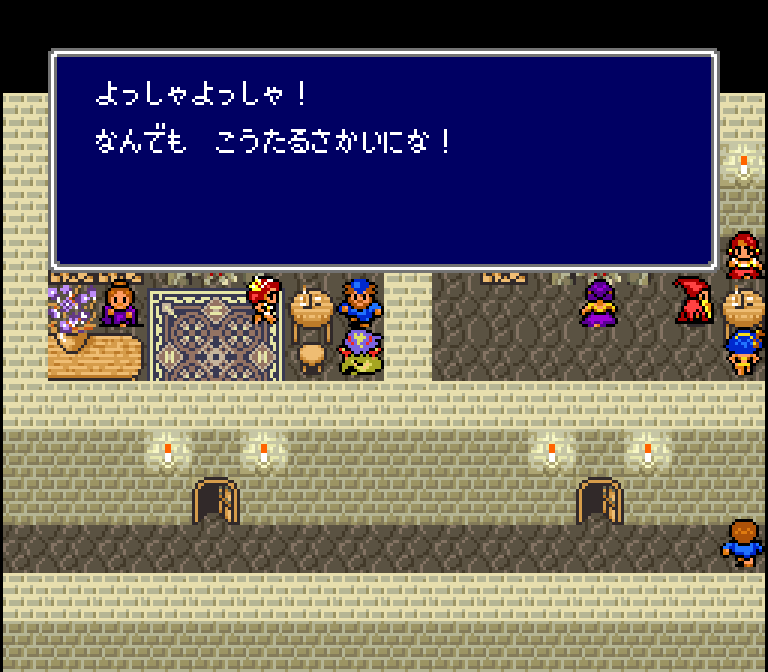 | 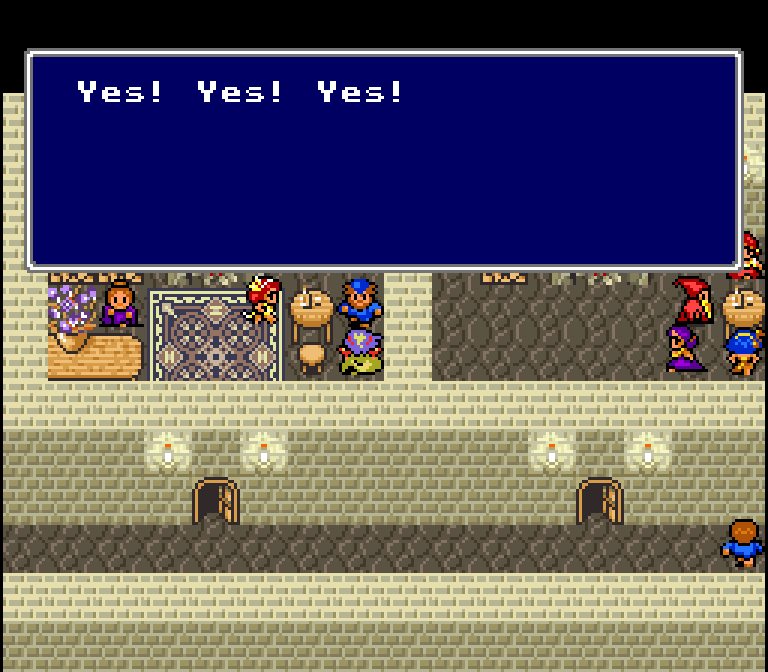 |
| Final Fantasy IV (Super Famicom) | Final Fantasy II (Super NES) |
One of the patrons of this hostess club says in response to the fur-wanting girl:
| Japanese Version (basic translation) | English Version |
| All right! All right! | Yes! Yes! Yes! |
| I’ll buy ya whatever ya like! |
The English translation only retained one half of the original line, it looks like.
Actually, I think having him say, “Yes! Yes! Yes!” might’ve been what tipped me off that this is a very adult-oriented place when I played the game as a kid. Except there isn’t any sex-related stuff going on here at all, so the translation wound up unintentionally giving off the wrong vibe.
In the Japanese version, he’s very excited and willing to buy this hostess stuff – the “All right! All right!” here is said in an excited, “Let’s buy all the things!” tone.
This guy also talks in a strong western Japanese dialect. Wealthy or successful businessmen often speak with this dialect in Japanese entertainment, so this is probably just another example of that trope. The merchant in the first Zelda game uses this same dialect, actually.

In the fan translation, this line is handled with:
Awright, Awright!
I’ll tell you who your daddy is!
For those not familiar with the phrase, “who’s your daddy” is a slang expression – there’s some more info on it on Wikipedia.
I like the use of “awright” here – it solves the problem of “All right! All right!” possibly reading like a statement of reluctance. The second “Awright” probably shouldn’t be capitalized, though.
A Jennifer By Any Other Name
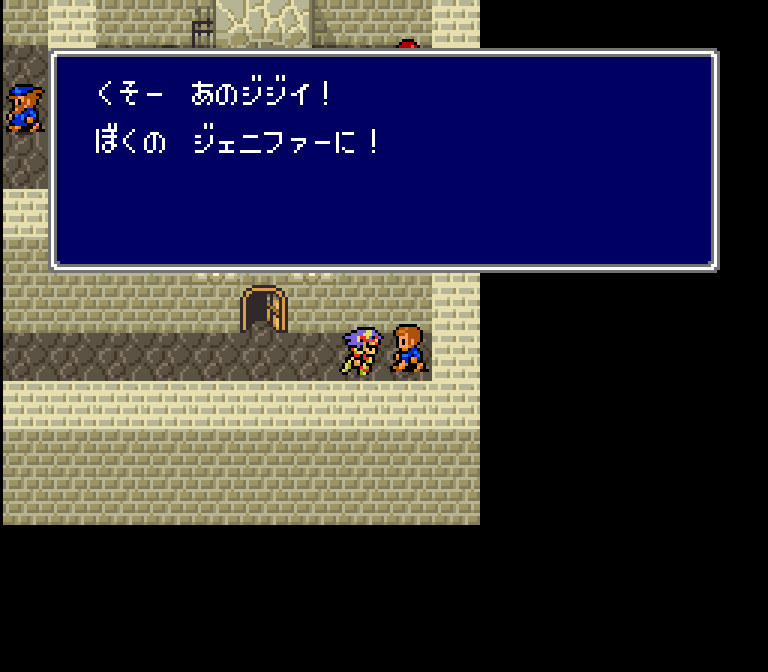 | 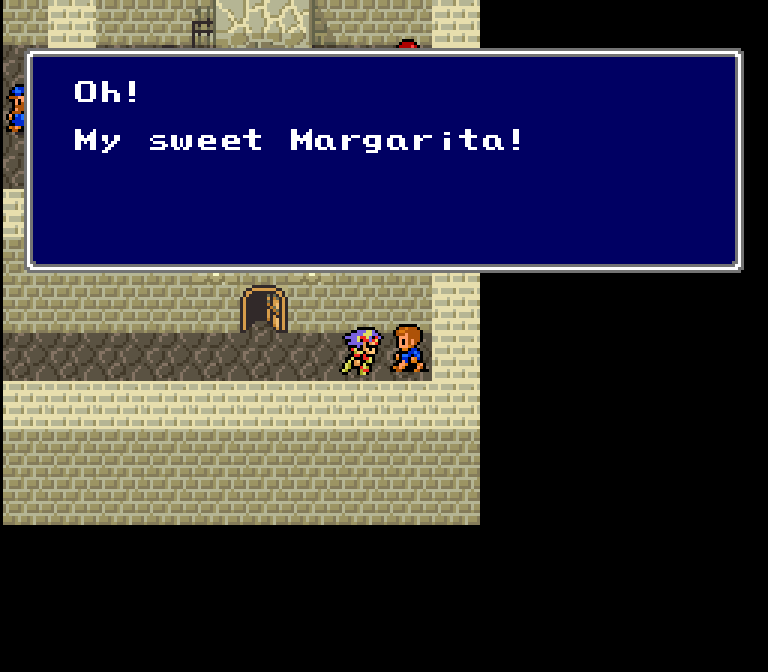 |
| Final Fantasy IV (Super Famicom) | Final Fantasy II (Super NES) |
A guy at the end of the hallway is worried about a girl he’s in love with:
| Japanese Version (basic translation) | English Version |
| Damn that old geezer! | Oh! |
| He’s got my Jennifer! | My sweet Margarita! |
The harsh wording was removed from the translation, as was the mention of the old man. So the point of this line is mostly lost in the translation.
More interestingly, though, the girl’s name was changed from Jennifer to Margarita for some reason.
Maybe it was a case of “Jennifer” sounding foreign and attractive to Japanese ears, but plain and ordinary to English speakers? If so, that might explain the switch to “Margarita”, but that’s just one possibility. Or maybe it was someone’s way of sneaking their wife or daughter’s name into the game, similar to how Nico was added into EarthBound’s translation.
The fan translation reverts the official translation’s change and goes with “Jennifer”:
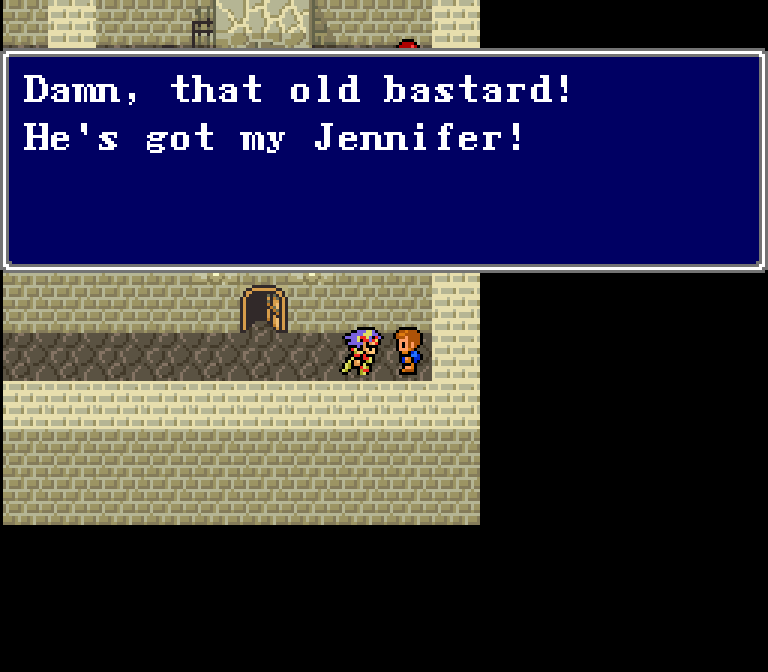
The PlayStation translation uses “Jenny”:
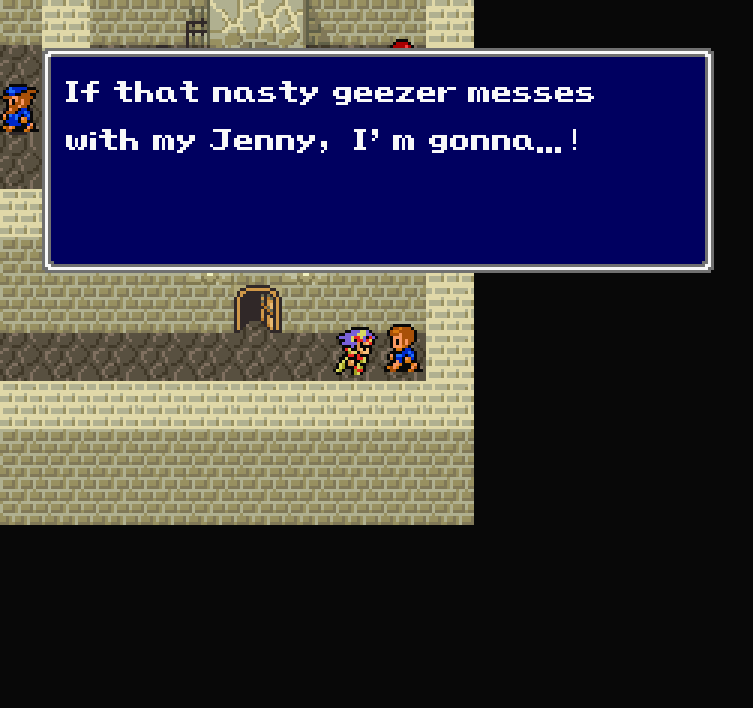
And, since the GBA translation is based on the PlayStation translation, it goes with “Jenny” as well:
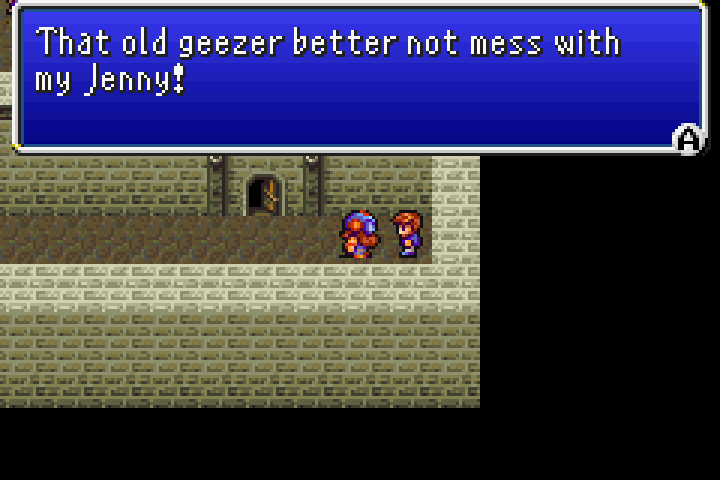
The DS translation goes in an unusual direction and chooses “Jenyfer”:
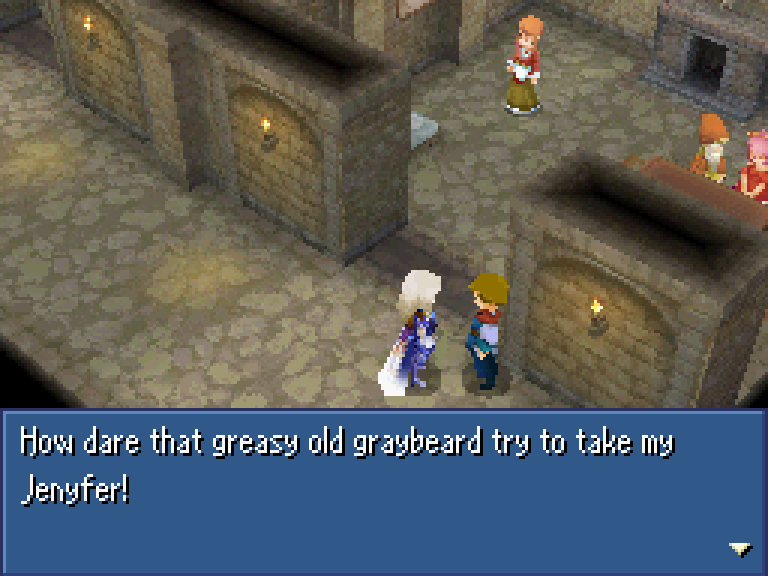
I’m guessing this “Jenyfer” spelling is due to the DS translation’s approach of avoiding everyday, normal-looking English.
The Valiant Warrior
 | 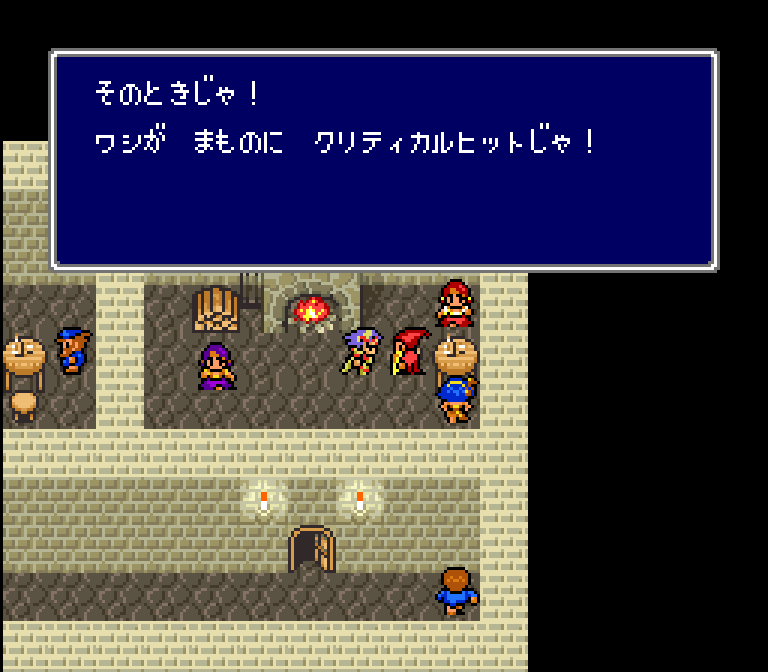 | 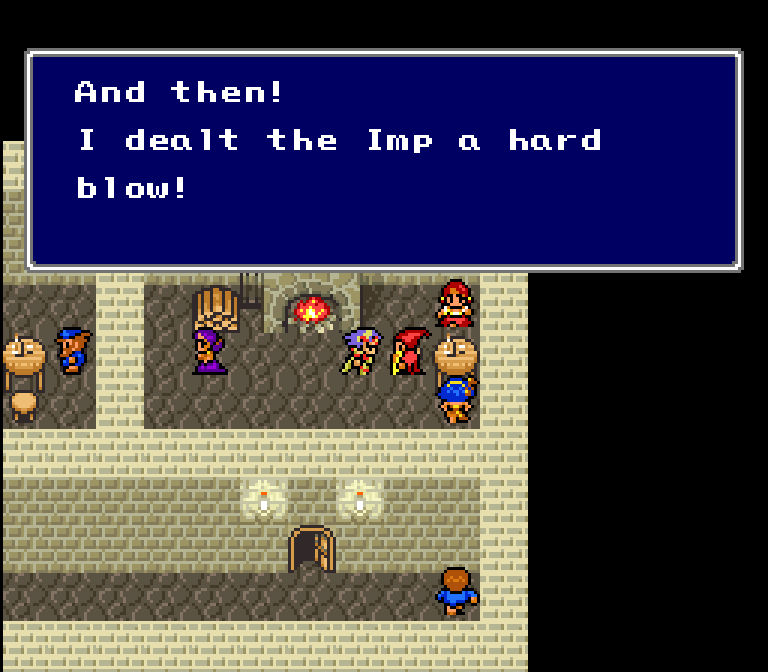 |
| Final Fantasy IV (Original) | Final Fantasy IV (Easy Type) | Final Fantasy II (Super NES) |
There’s an old man in this second hostess room who seems to be a big spender – he’s ordering food and has two girls giving him company. He also seems to be trying to show off to the girls:
| FFIV (basic translation) | FFIV Easy Type (basic translation) | FFII |
| Just then! | Just then! | And then! |
| I dealt a critical hit to the Goblin! | I dealt a critical hit to the monster! | I dealt the Imp a hard blow! |
In the original script, he’s referring to the weak “Goblin” enemies that you encounter early in the game. Since these enemies were renamed “Imps” in the English translation, the translated script reflects that change here. It would’ve been very easy to screw up consistency here, so the translation team did a good job catching it!
The Japanese script uses the actual English phrase “critical hit”, so it’s interesting and puzzling to see that this became “a hard blow” in the English translation. I assume it’s because it’s shorter and saves a few bytes of memory. At some point in time I’m some immature kids made jokes out of this choice of wording, though.
More interesting than all that, though, is that the Easy Type script changed the Goblin reference to simply say “monster”. I’m not sure why the developers decided to do this; this is a really unimportant line and the enemies in question are still called “Goblins” in the Easy Type version.
Hostess Hostage
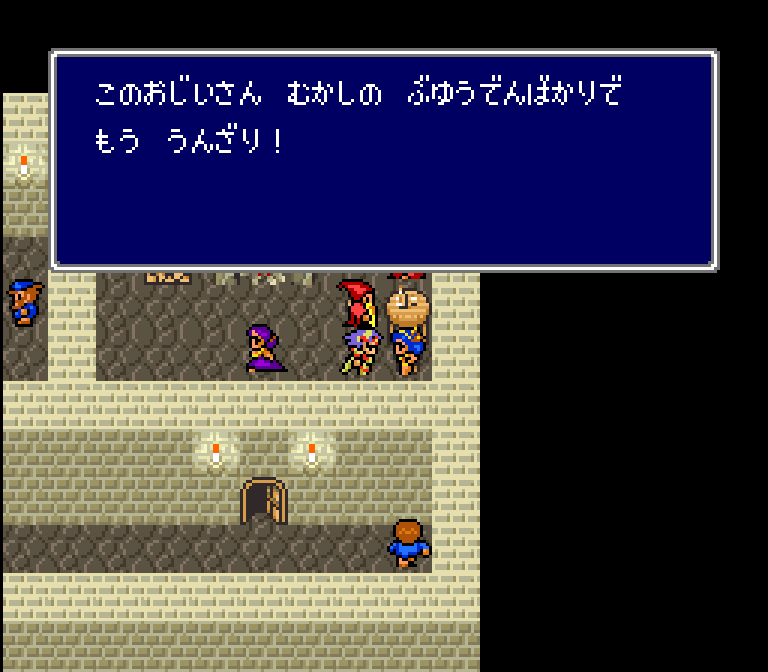 | 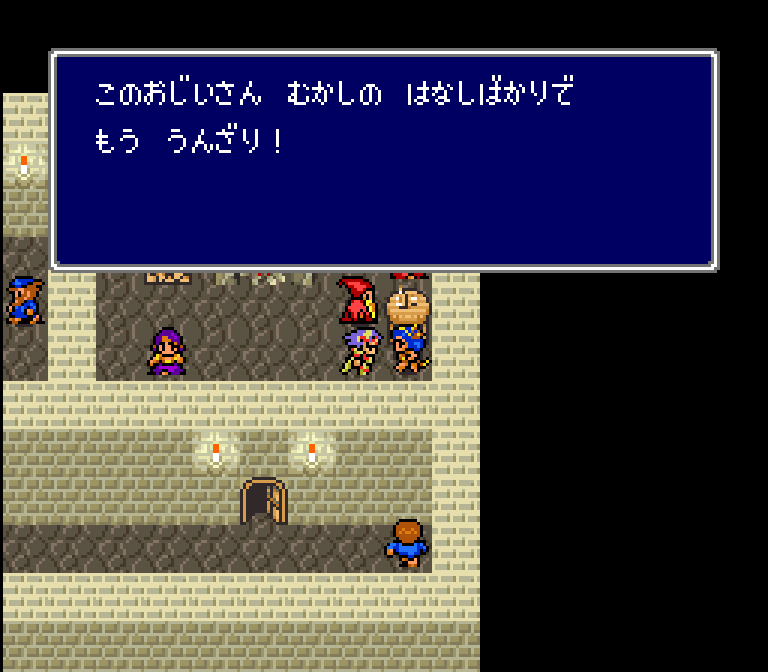 | 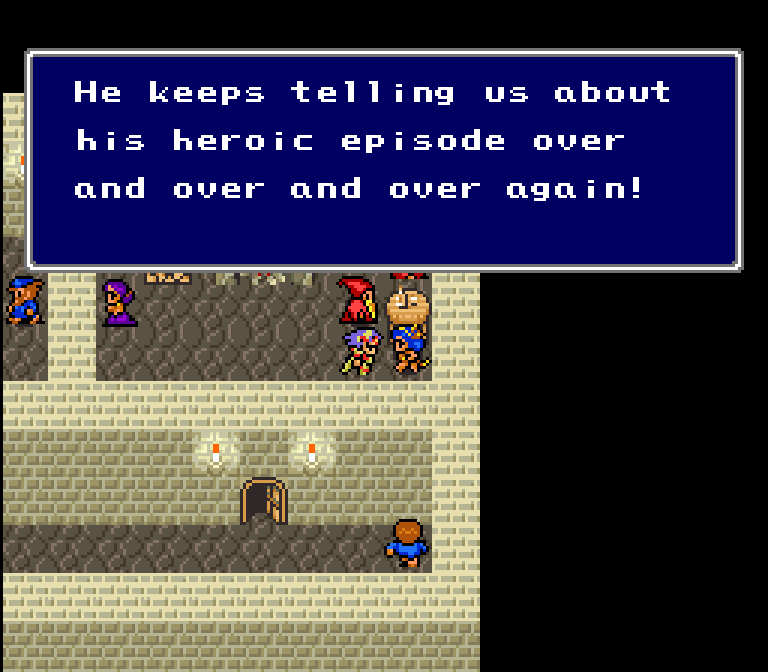 |
| Final Fantasy IV (Original) | Final Fantasy IV (Easy Type) | Final Fantasy II (Super NES) |
One of the hostesses complains about the big-spender:
| Final Fantasy IV (basic translation) | Final Fantasy IV Easy Type (basic translation) | Final Fantasy II (Super NES) |
| This old man won’t quit talking about his old heroic tale – I’m so sick of it! | This old man won’t quit talking about his old story – I’m so sick of it! | He keeps telling us about his heroic episode over and over and over again! |
I really like the phrasing in the English translation, it effectively emphasizes how much he won’t shut up about his story without saying so outright.
When I first played this as a kid, I remember thinking that this lady liked the guy’s story because she found it exciting. Half of it was probably reading failure on my part, but the Japanese line does make it immediately clear that she’s sick and tired of this guy’s dumb stories.
The Easy Type version also simplifies a fancy word that translates to “heroic tale” or “heroic episode” by changing it to “story”.
The Secret Woman
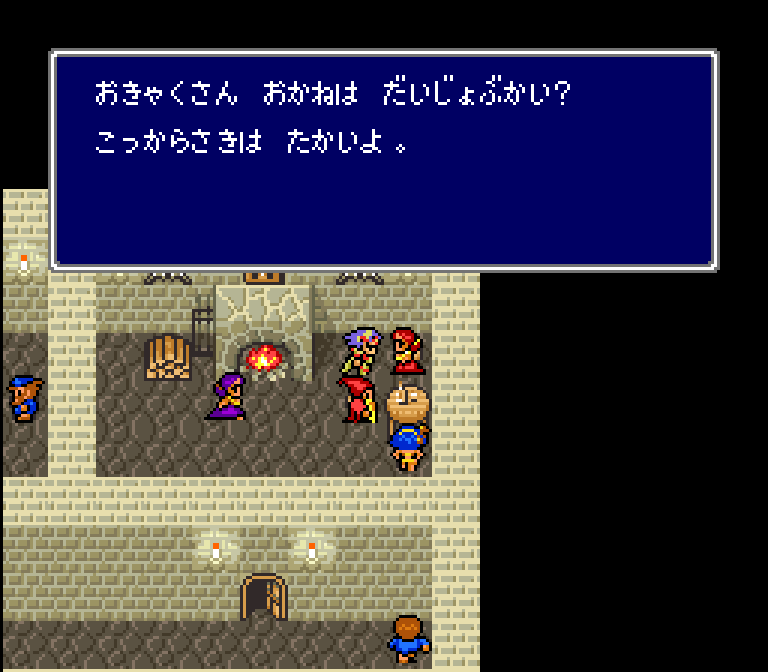 | 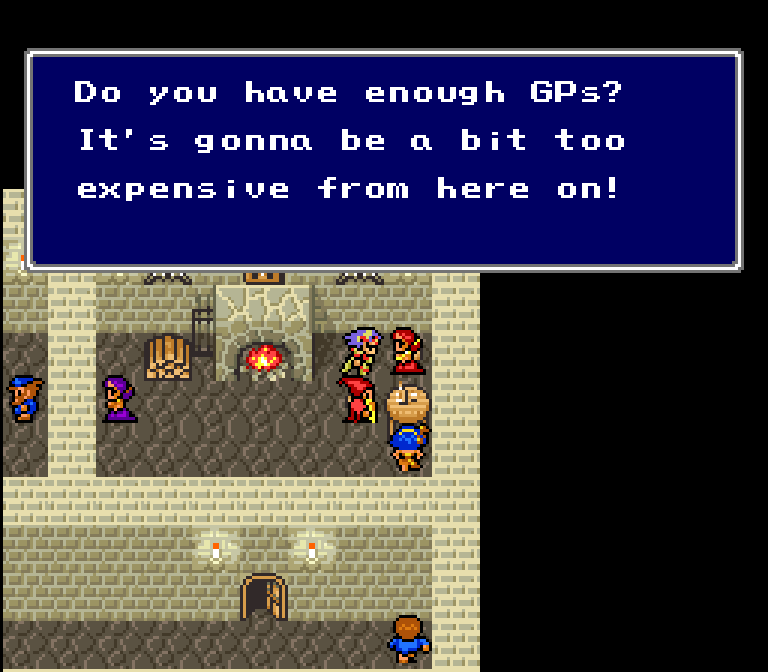 |
| Final Fantasy IV (Super Famicom) | Final Fantasy II (Super NES) |
There’s one last woman in this room… except there’s no way to get to her.
For years I wanted to know what she said – I even remember searching all over the place for a secret passageway to get to her. I had to know what she said!
Now, even more years later, I decided to look up a walk-through-walls cheat code for Final Fantasy II to solve this mystery once and for all! Sadly, it turns out all she says is a copy of another person’s line:
Do you have enough GPs? It’s gonna be a bit too expensive from here on!
My guess is that this particular line might be “Line 0” for this room, and this lady was never assigned a line of text of her own, resulting in Line 0 as the default.
Anyway, I was still curious to see if the original Japanese version had a line for this lady, so I whipped up a walk-through-walls cheat code for it too. To my dismay, her Japanese counterpart also copies the line from the first guy in this room.
At least I solved a childhood mystery, though. And I made a cheat code for the Japanese version too, so it wasn’t a total waste, I guess. For reference, here are the walk-through-walls Game Genie codes:
| Final Fantasy IV (Super Famicom) | Final Fantasy II (Super NES) |
| 0CC3-0F64 | 0CCA-AF6F |
I couldn’t figure out how to get one for Easy Type to work; the best I could do was make it so you can’t walk through anything, not even empty spaces. I’m pretty sure this lady says the same thing in Easy Type, though.
Fit for a King
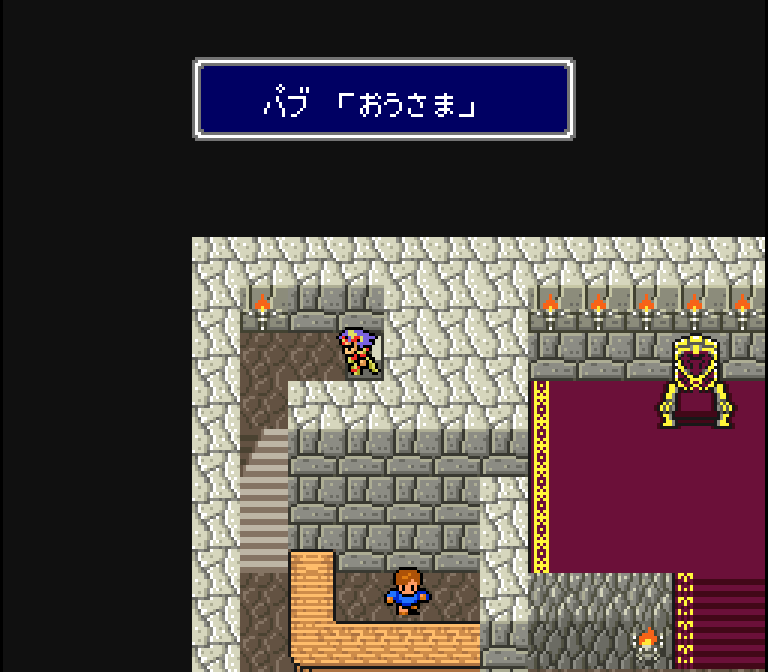 | 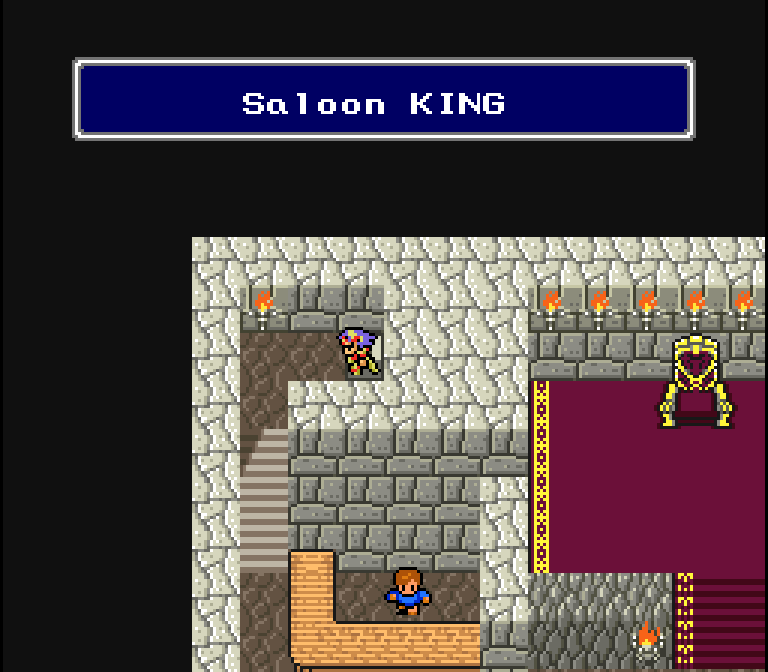 |
| Final Fantasy IV (Super Famicom) | Final Fantasy II (Super NES) |
If you buy a Pass from the lady by the front door of the pub, you can then access a secret area of the building. Doing so will take you to what is called the “Pub ‘King'” in the Japanese version. This was changed to “Saloon KING” in the English translation.
Actually, calling this place a saloon is kind of a neat idea now that I think about it. Even though saloons are known mostly for serving alcohol (at least according to popular culture) the term doesn’t seem to have as strong of an impact as “bar”. It was clever of the translators or localizers to use this term to get around Nintendo’s policies.
…Although, now that I think about it, it seems much less like a pub and more like a cabaret or gentleman’s club. And now that I think about it even more, it’s strange that a pub would have a second pub attached to it. Maybe the original Japanese writers wanted to keep things a little vague with their own text.

Anyway, the PlayStation translation calls this place the “Court of Kings”, which I actually think is a really cool name for a place like this.
And the GBA translation calls it the “King’s Pub”:

The fan translation went with “‘King’ Pub”:
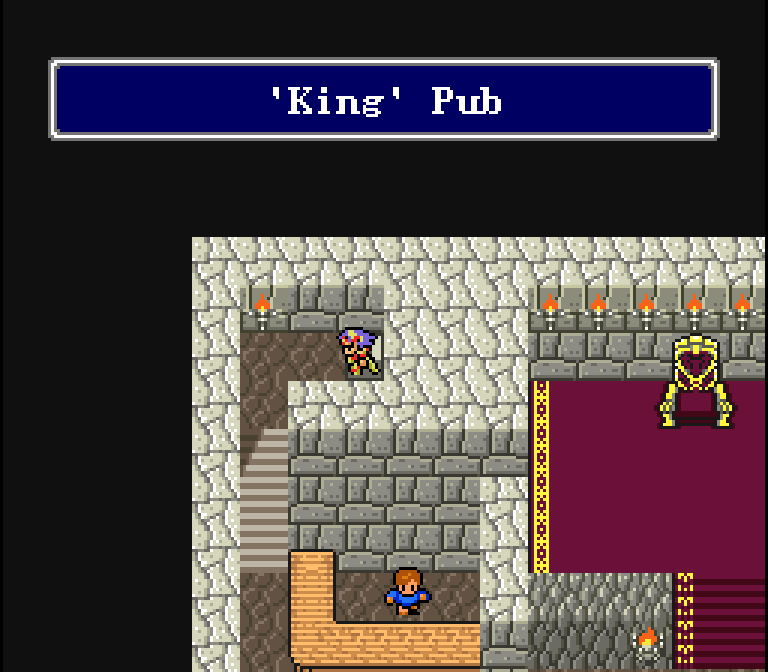
And the DS version calls it the “King’s Bounty Pub”:

Get It On!
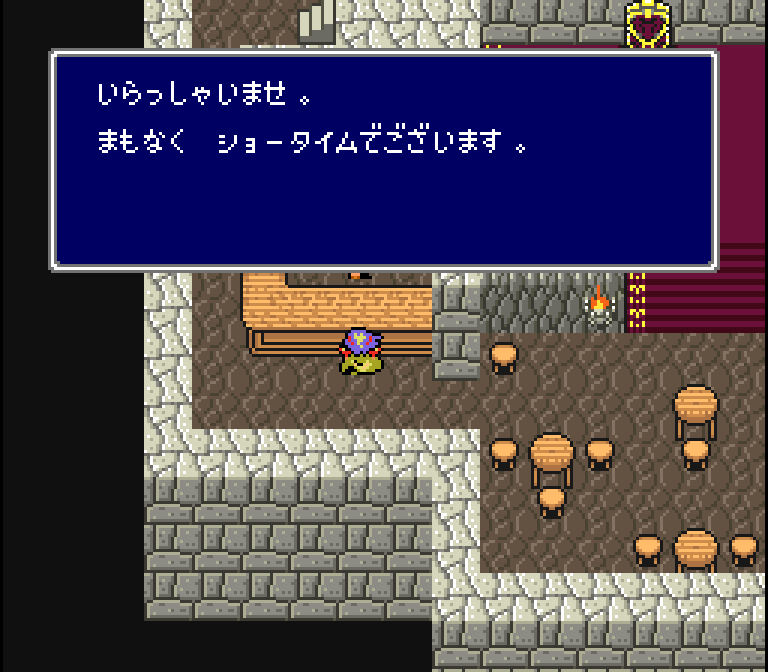 | 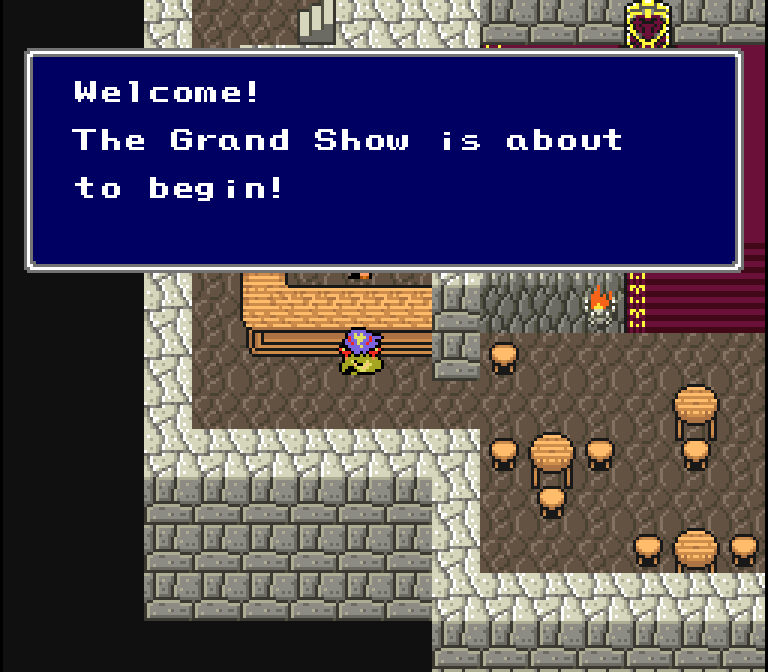 |
| Final Fantasy IV (Super Famicom) | Final Fantasy II (Super NES) |
The guy managing this secret pub greets you:
| Japanese Version (basic translation) | English Version |
| Welcome. | Welcome! |
| Showtime will begin shortly. | The Grand Show is about to begin! |
The guy’s much more excited in English!!!
The English version also creates a name for this place’s show: the “Grand Show”. The Japanese version doesn’t have a name for it at all.
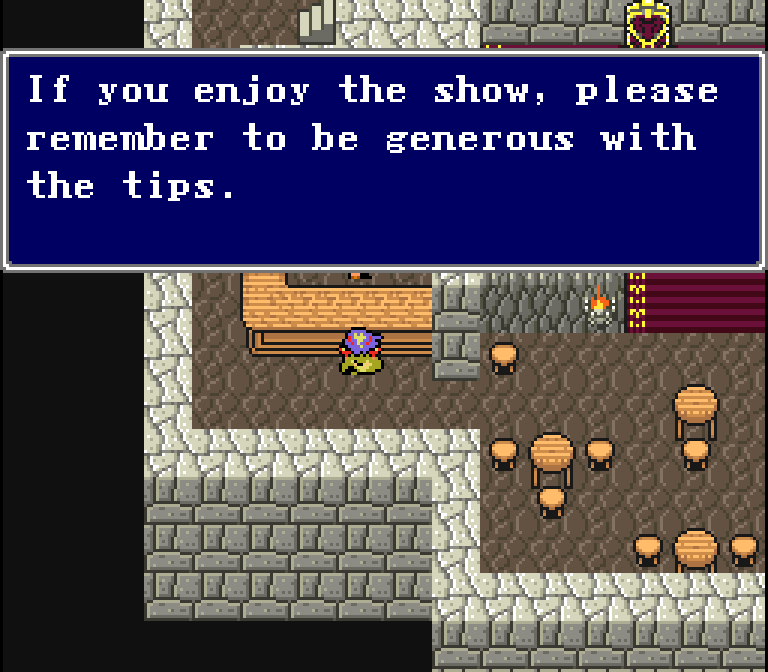
The fan translation has a good translation for this line, but then it also adds a completely new line out of nowhere:
If you enjoy the show, please remember to be generous with the tips.
The Midday Crowd
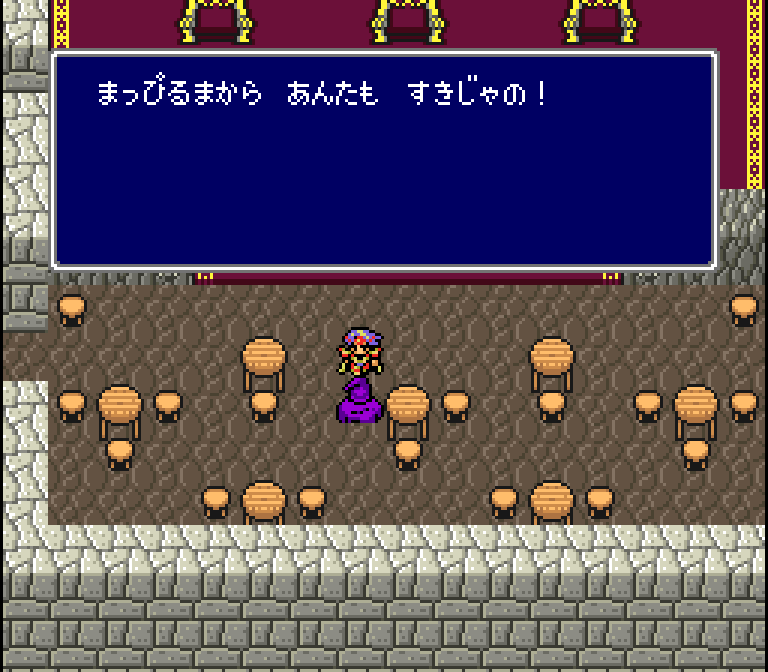 | 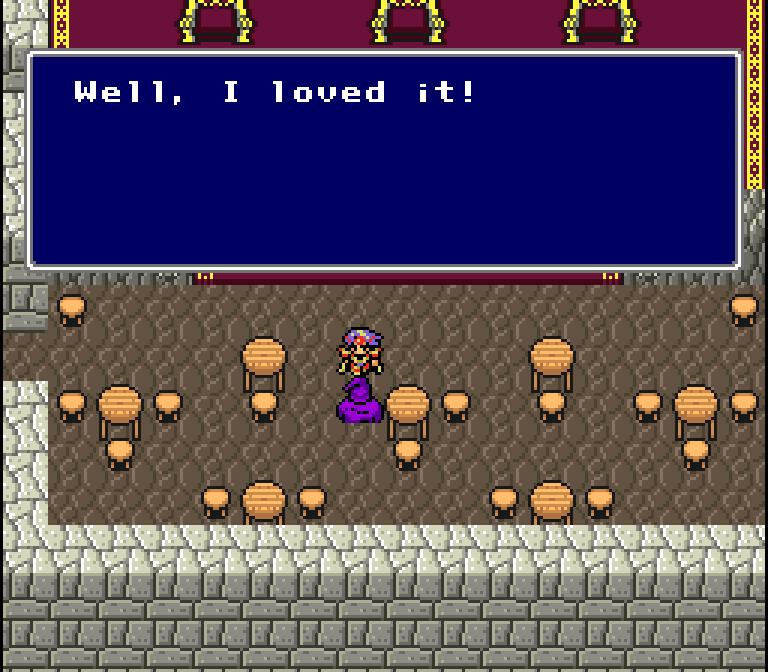 |
| Final Fantasy IV (Super Famicom) | Final Fantasy II (Super NES) |
There’s only one other person here you can talk to – some old guy.
| Japanese Version (basic translation) | English Version |
| Coming here in the middle of the day… You certainly love this too! | Well, I loved it! |
I’m really not sure how this line got translated this way. Either it’s one wacky mistranslation or maybe an editor thought it would make sense after seeing the girls dance here. But even then, it still seems like an odd thing to say.
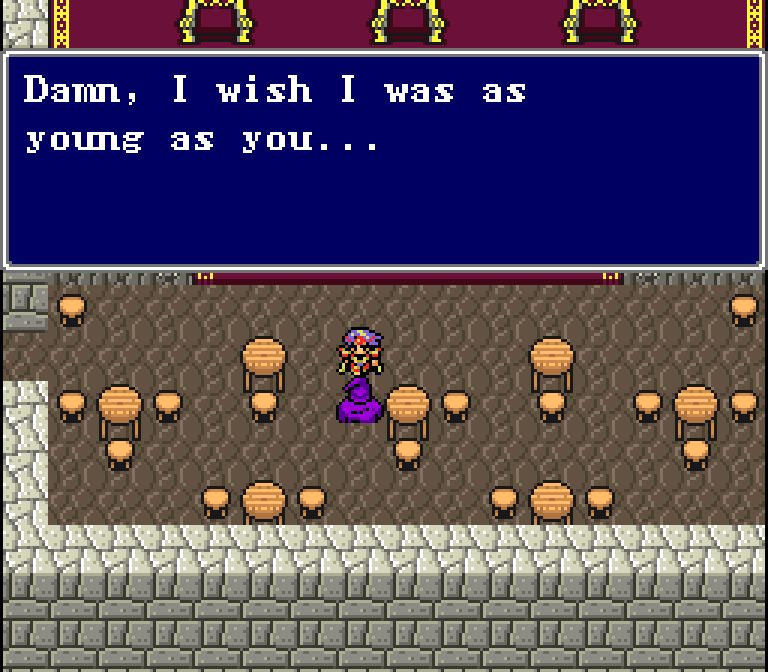
The fan translators translated this line as:
Damn, I wish I was as young as you…
This wasn’t what he said at all in Japanese. Yet another translation of this line leaves me puzzled.
Peekaboo
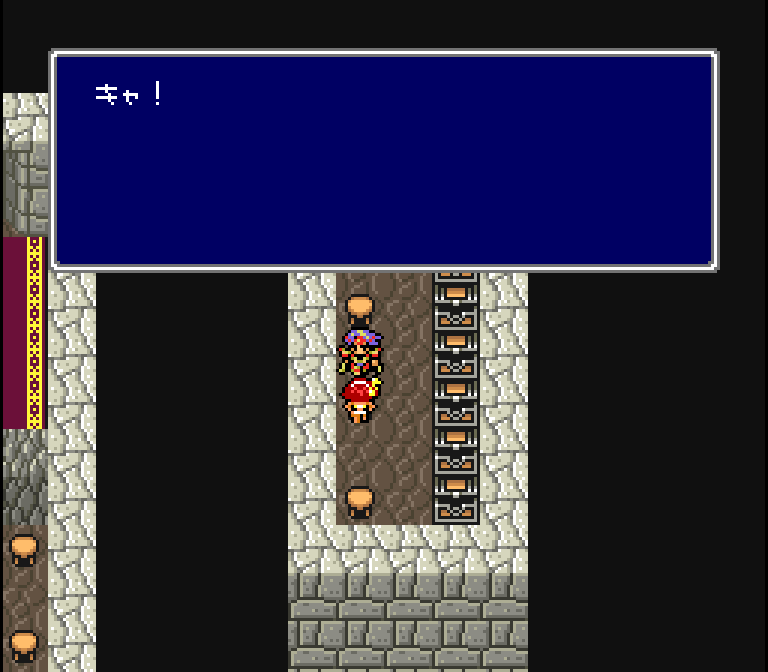 | 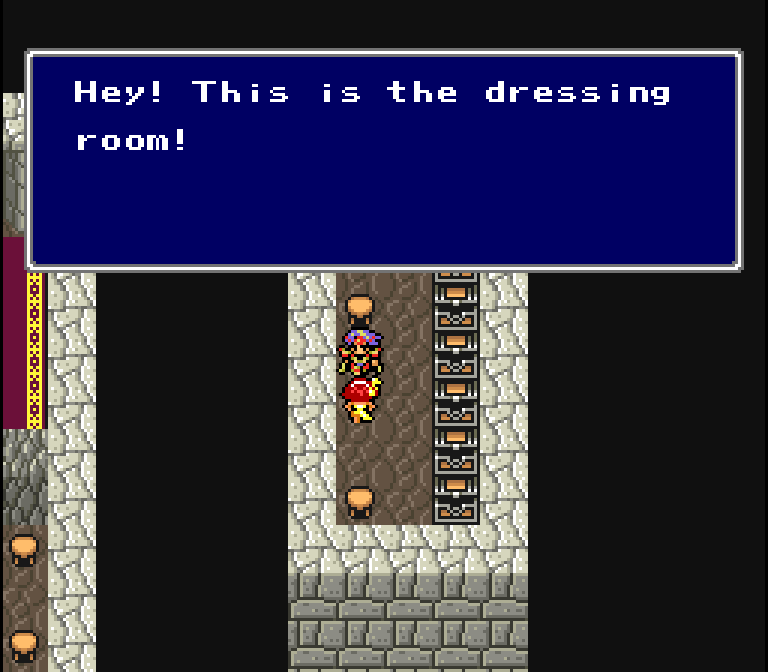 |
| Final Fantasy IV (Super Famicom) | Final Fantasy II (Super NES) |
If you’re clever enough, you can sneak into the dancers’ dressing room. Inside is one of the dancers:
| Japanese Version (basic translation) | English Version |
| Eek! | Hey! |
| Stay out of the dressing room! | This is the dressing room! |
The Japanese line is much more “girly” in tone. The girl also specifically tells you to get out.
The fan translation translates this as:
Kya!
What, didn’t you get enough of us during the show?
Stay out of the dressing room!
I’m kind of surprised they left “Kya!” as-is and didn’t go with something like “Eek!” The fan translation also inserts a snarky line that wasn’t in the original text.
Now that I think about it, it looks like the fan translation fumbled with almost all the text in this adult area of the game, except for the name of the place.
Farming
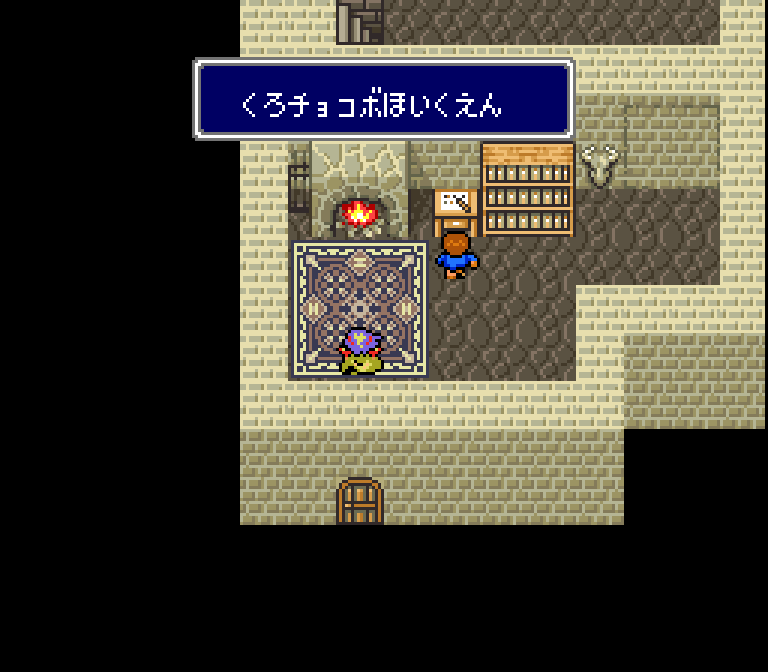 | 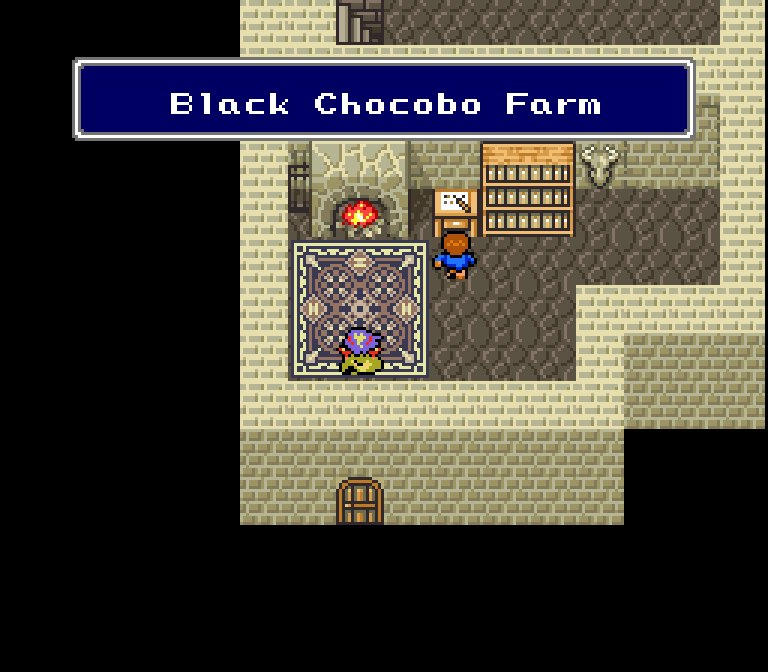 |
| Final Fantasy IV (Super Famicom) | Final Fantasy II (Super NES) |
Another building in the city is called the “Black Chocobo Farm” in the official translation.
This is okay, but the Japanese term is actually closer to “nursery” than “farm”. My guess is that “farm” was chosen because it was shorter.
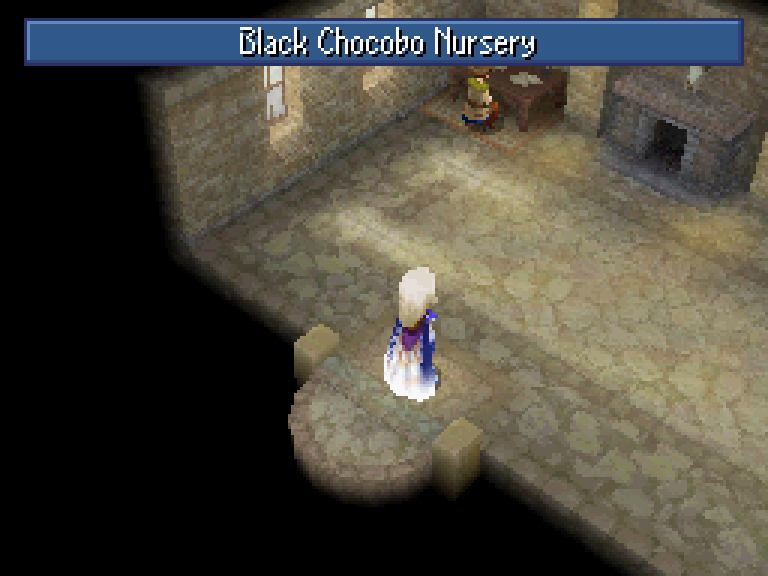
Actually, all translations of the game (including the fan translation) wound up going with “Farm” except for the DS translation, which went with “Nursery”.
Thanks Be To Nature
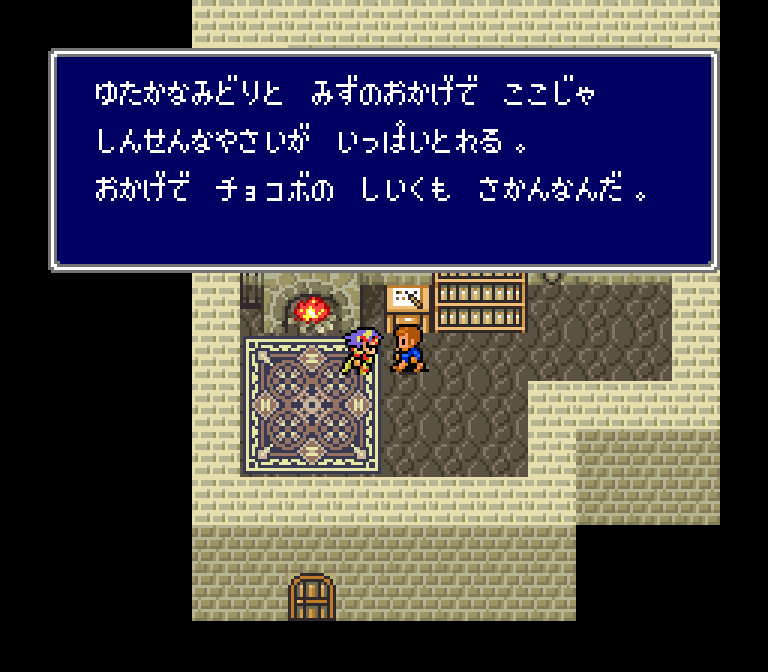 | 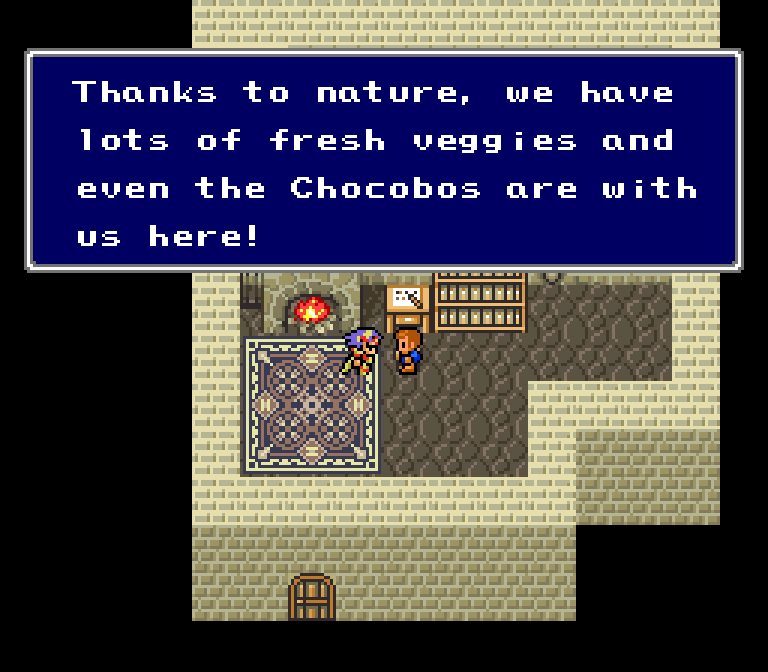 |
| Final Fantasy IV (Super Famicom) | Final Fantasy II (Super NES) |
There’s a guy in the Chocobo nursery who explains the situation:
| Japanese Version (basic translation) | English Version |
| Thanks to the bountiful greenery and water we can grow lots of fresh vegetables here. Thanks to that, raising Chocobos has really taken off. | Thanks to nature, we have lots of fresh veggies and even the Chocobos are with us here! |
Essentially, this guy is meant to explain why Chocobos are such a big deal here. In the Japanese line, he explains that the Toroian environment is great for growing vegetables, which has allowed Chocobo-raising to become a booming activity here.
In the English line, he… just seems happy to have lots of fresh vegetables and Chocobos here. There’s no causal connection made, he just thanks nature itself. As a result, it almost sounds like something a young child might say.
Boning Up
The bookshelf in this room can be checked.
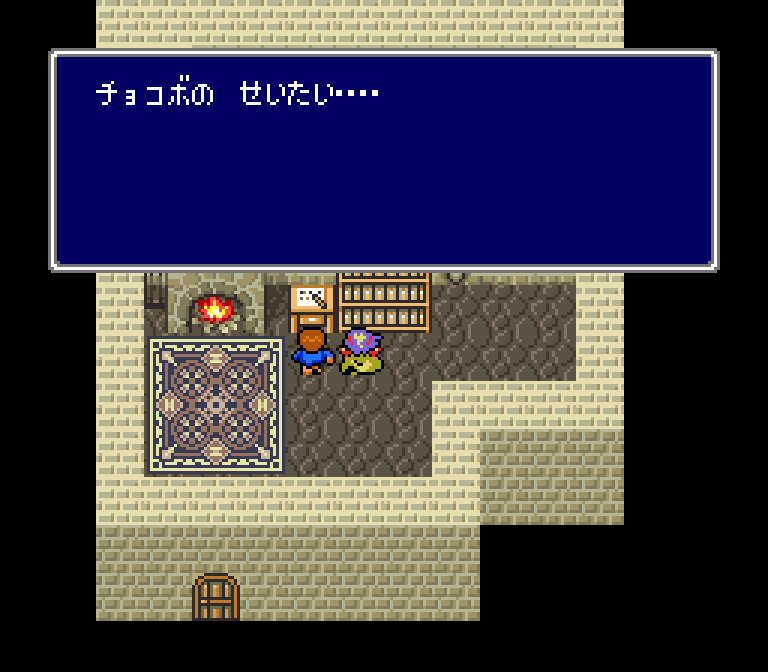 |  |
| Final Fantasy IV (Super Famicom) | Final Fantasy II (Super NES) |
One book title given is “Chocobo Ecology….” in the Japanese version, which became “All Those Chocobos” in the English translation.
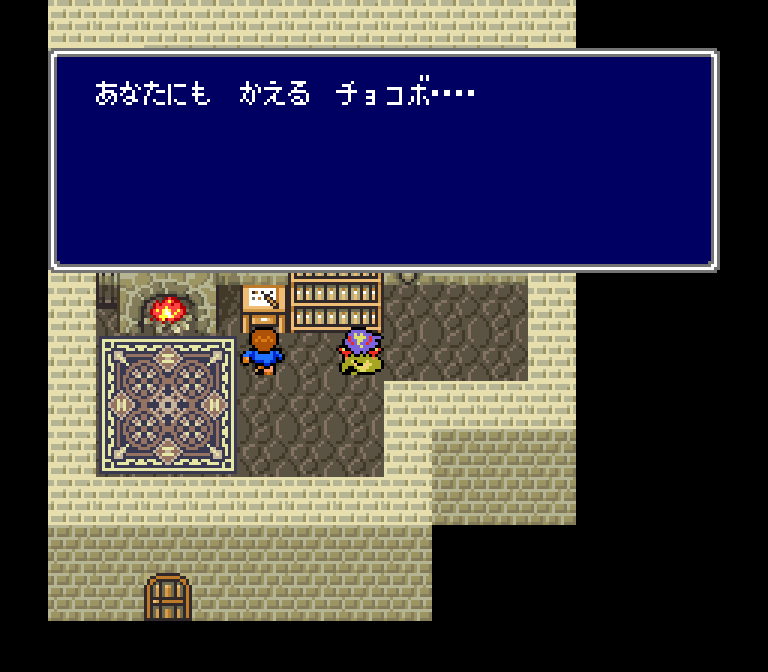 | 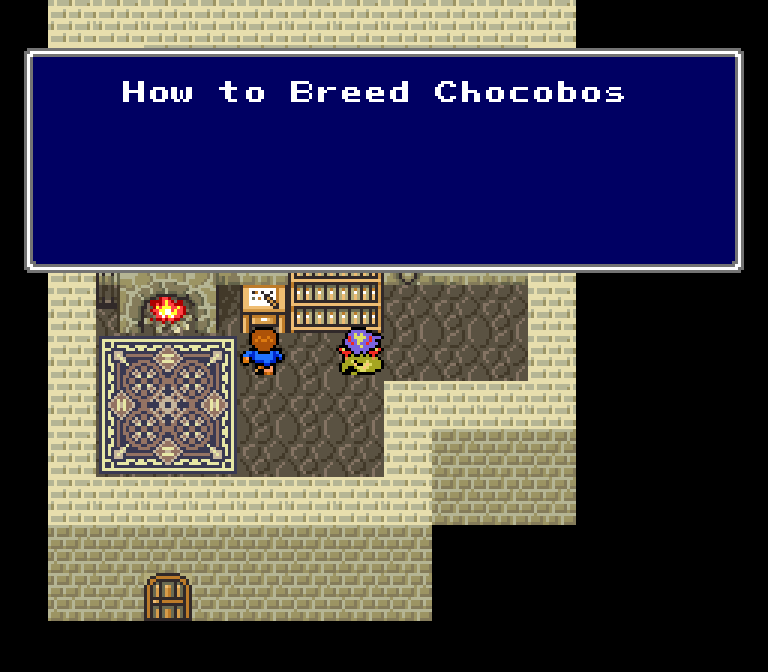 |
| Final Fantasy IV (Super Famicom) | Final Fantasy II (Super NES) |
Another book title given is “You, Too, Can Care for a Chocobo….” in the Japanese version, in the sense of keeping Chocobos as pets. In the English version, this became “How to Breed Chocobos”.
Extra, Extra!
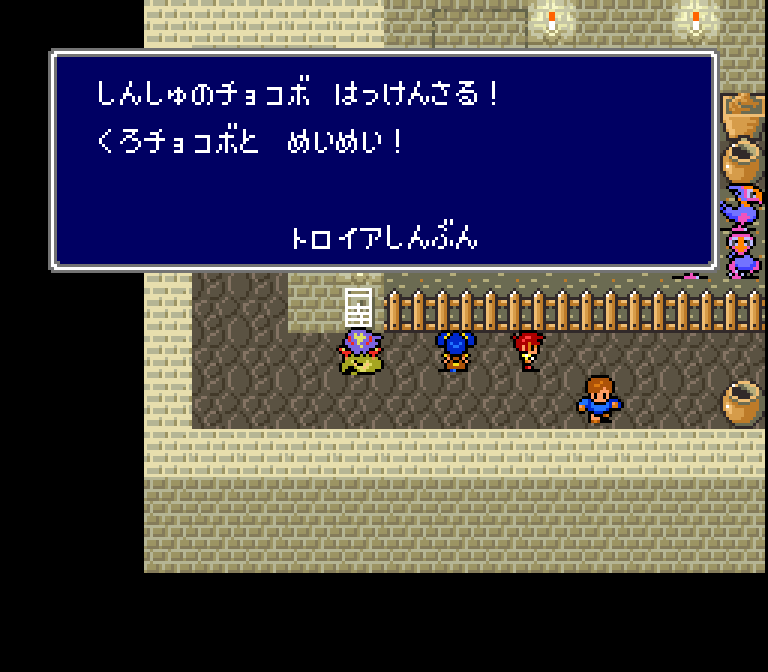 | 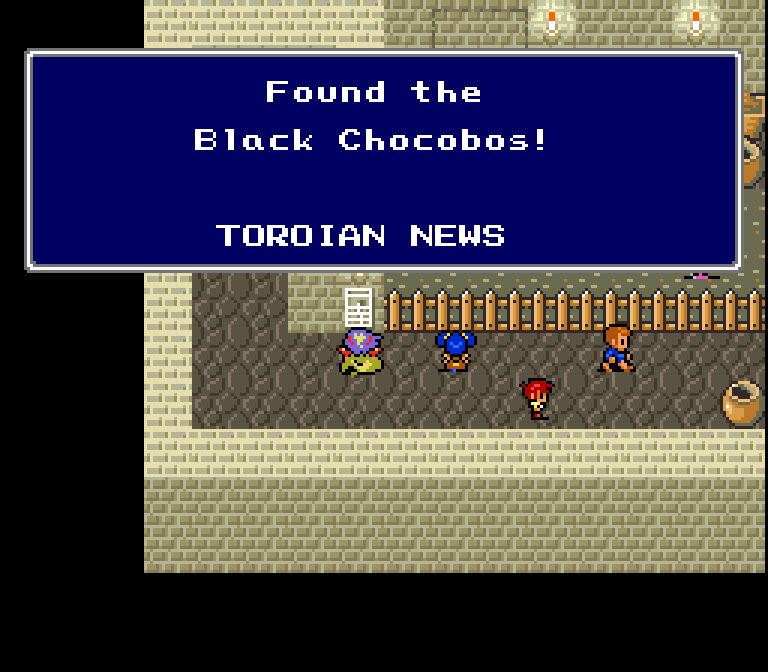 |
| Final Fantasy IV (Super Famicom) | Final Fantasy II (Super NES) |
In the actual Chocobo room is a piece of paper you can read:
| Japanese Version (basic translation) | English Version |
| New Breed of Chocobo Discovered! Dubbed “Black Chocobo”! | Found the Black Chocobos! |
| Troia Newspaper | TOROIAN NEWS |
The fact that Black Chocobos are a big, huge, new discovery isn’t very clear in the English translation. Instead, it sounds like a couple black-colored Chocobos went missing and then someone found them.
It’s also interesting to see how the original script formatted this text and then how the translation did formatting of its own.

Each translation of the game has a slightly different variation on this line. The only one that really stands out is the fan translation, which called them “advanced” Chocobos instead of a “new breed” or “new type”.
The GBA translation changes the newspaper’s name into something more tabloid-like: “The Daily Troia Tattler”. The original Japanese text is meant to be taken seriously, though, so this strikes me as a poor attempt at injecting humor.
Chocobology
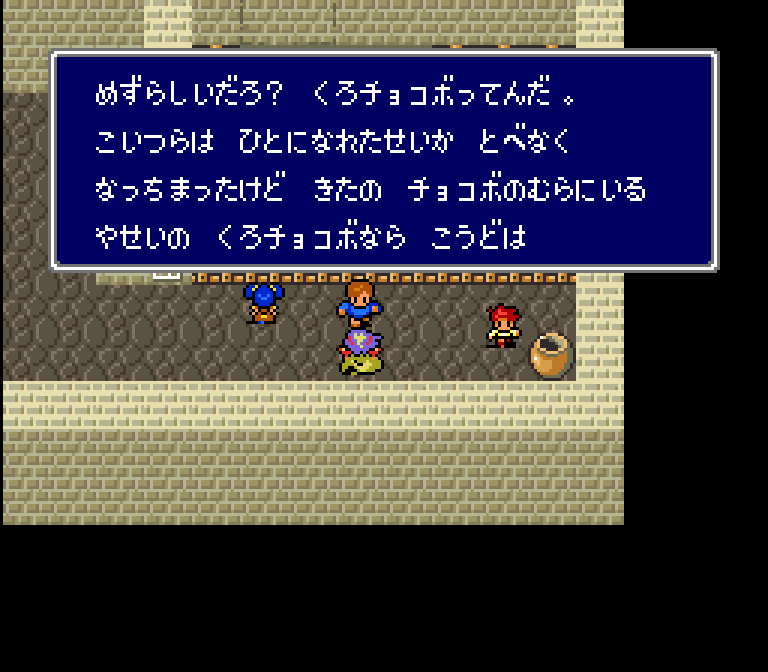 | 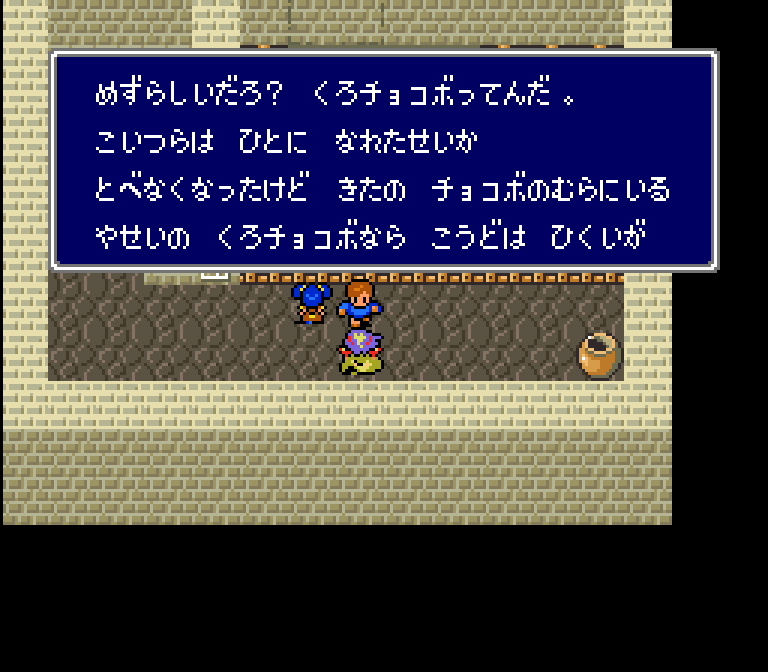 | 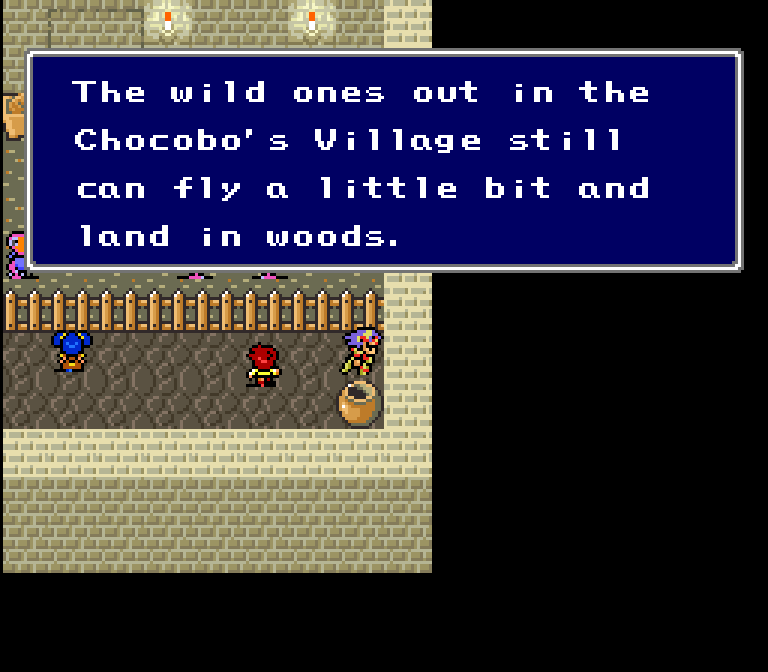 |
| Final Fantasy IV (Original) | Final Fantasy IV (Easy Type) | Final Fantasy II (Super NES) |
A helpful man explains a bit about the Black Chocobos:
| Japanese Version (basic translation) | English Version |
| Rare sight, huh? | |
| They’re called Black Chocobos. | |
| These ones can’t fly since they’ve been domesticated, but the wild Black Chocobos in the Chocobo village to the north can fly at low altitude! They can only land in forests, though. | The wild ones out in Chocobo’s Village still can fly a little bit and land in woods. You can find them in the Chocobo’s Village north of here! |
It looks like this is a case of long text needing to be truncated for technical reasons. As a result, the details of the Black Chocobos are lost or muddied. It’s not a big deal, though.
I also feel that it’d be better to have called it “Chocobo Village” rather than “Chocobo’s Village”, as the latter makes it sound like it belongs to one Chocobo or one guy named Chocobo. Then again, there’s the “Chocobo’s Dungeon” series, so maybe that’s the preferred way of handling it.
A tiny text change was also introduced into this line in the Final Fantasy IV Easy Type script. It’s hard to explain or convey in translation, but basically the grammar used for “can’t fly” was simplified a bit for easier readability.
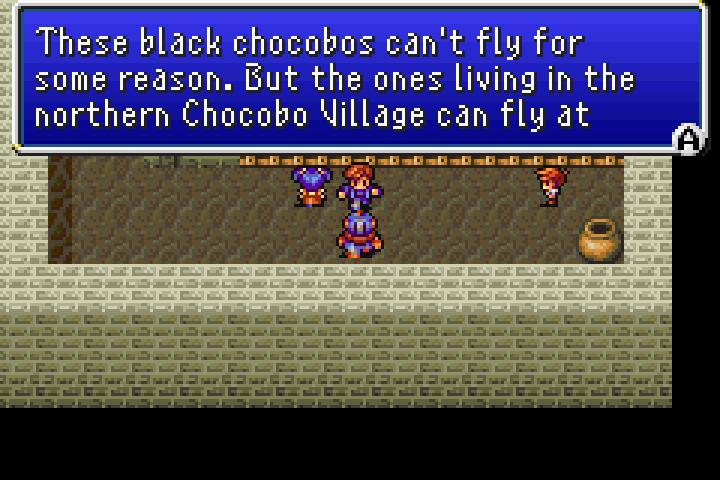
The various translations of the game phrase things in different ways, but the GBA translation stands out the most:
These black chocobos can’t fly for some reason.
But the ones living at the northern Chocobo Village can fly at a low altitude, though I hear they can only land in the forest.
The guy’s comments about these birds being a rare sight and explaining what they’re called are still missing from the translation.
But the real issue is that he no longer knows why they can’t fly. In the Japanese text, he states that it’s because these Black Chocobos are domesticated. In the GBA translation, the use of “for some reason” suggests he has no clue at all.
Lacking Love
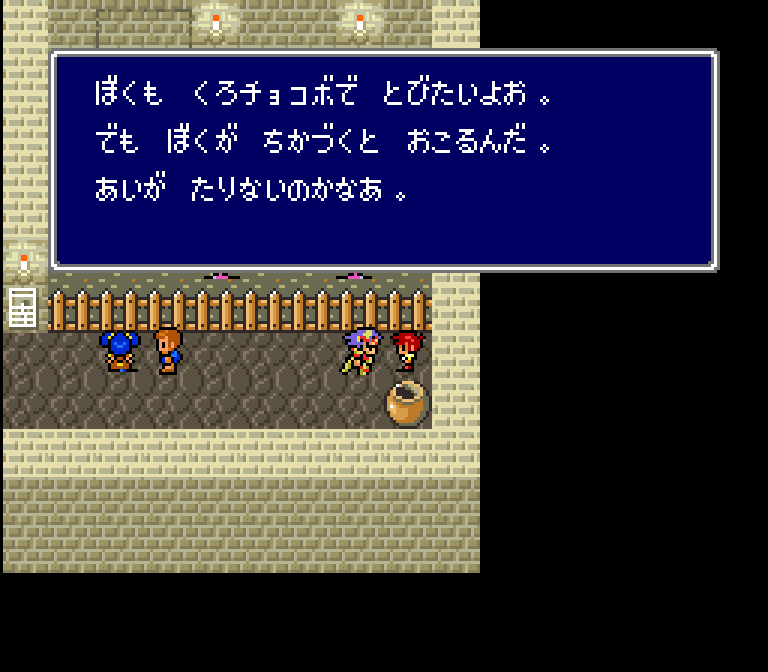 | 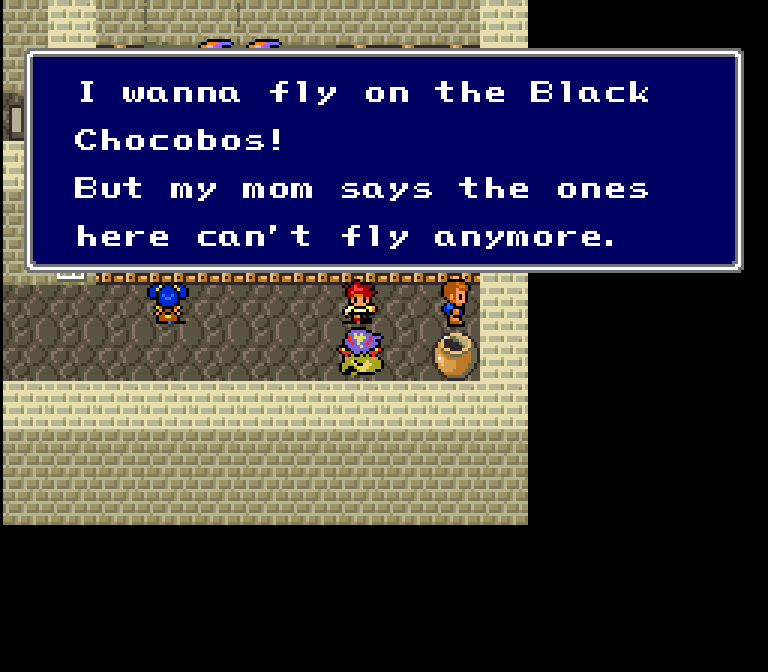 |
| Final Fantasy IV (Super Famicom) | Final Fantasy II (Super NES) |
There’s a little boy in this room who’s very fond of the Black Chocobos:
| Japanese Version (basic translation) | English Version |
| I wanna fly on a Black Chocobo too. | I wanna fly on the Black Chocobos! |
| But they get mad when I get close to them. | But my mom says the ones here can’t fly anymore. |
| I guess I don’t have enough love… |
That’s a big difference. I actually feel kind of bad for the boy in the Japanese version – he just wants to have fun, but ends up thinking he’s done something wrong somehow.
The English line replaces it with a completely new line with information that’s already stated elsewhere.

Naturally, the different translations of the game handle this in different ways. Again, though, the GBA translation stands out among them:
I want to ride a black chocobo and fly!
But I don’t think they like me…
They freak out when I try to get close.
While it’s definitely closer to the original text than the Super NES translation, it still misses that bittersweet mention of not having enough love to gain the Chocobos’ acceptance.
Chocobo Sounds
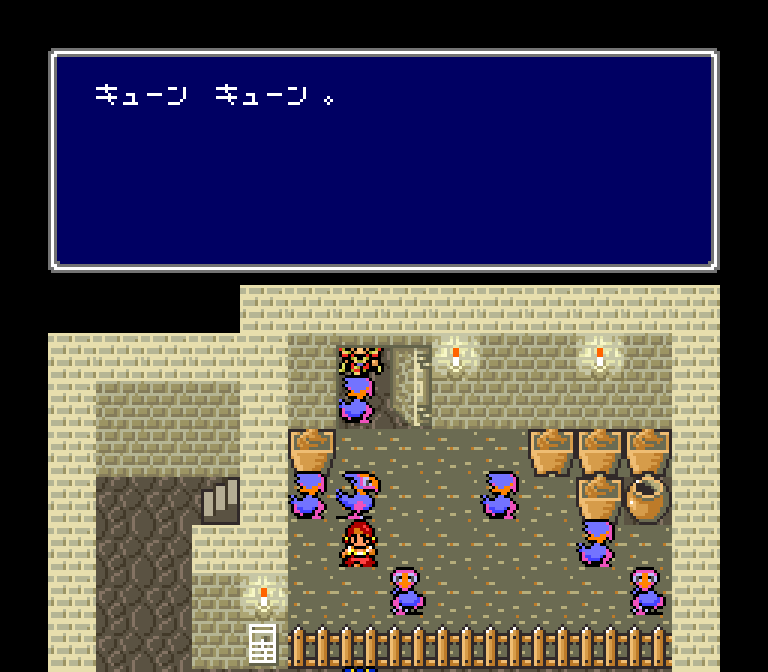 |  |
| Final Fantasy IV (Super Famicom) | Final Fantasy II (Super NES) |
If you talk to the Black Chocobos, they’ll say some sort of animal sound back at you.
In the original Japanese script this sound is “kyun kyun”, which is pronounced “kyoon kyoon” (with the “oo” pronounced like “boo”).
The English translation changes this to “Coooc Coooc”.
The PlayStation translation goes with “Kweh, kweh”:
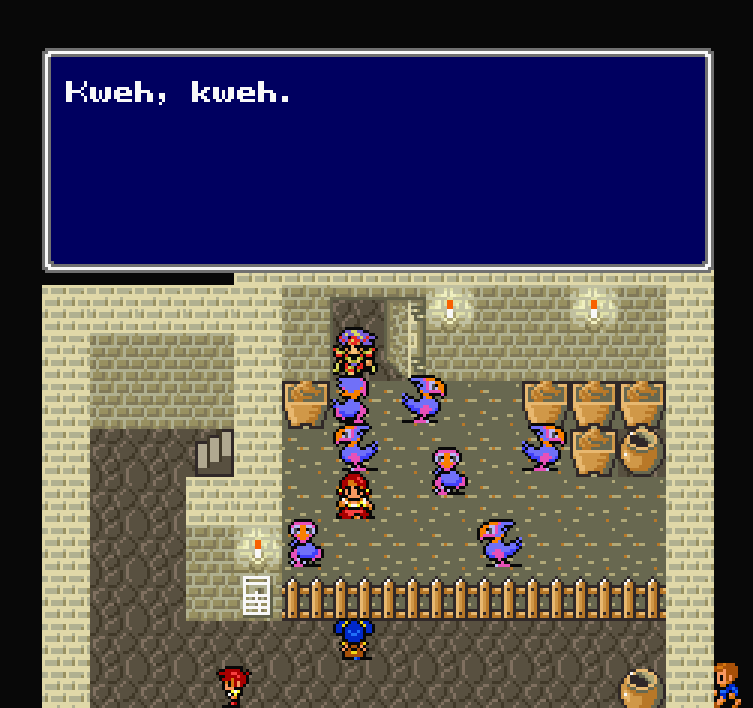
The GBA translation uses “Kweh, kweh” too:

The fan translation sticks with the original Japanese sound of “Kyun, Kyun”:
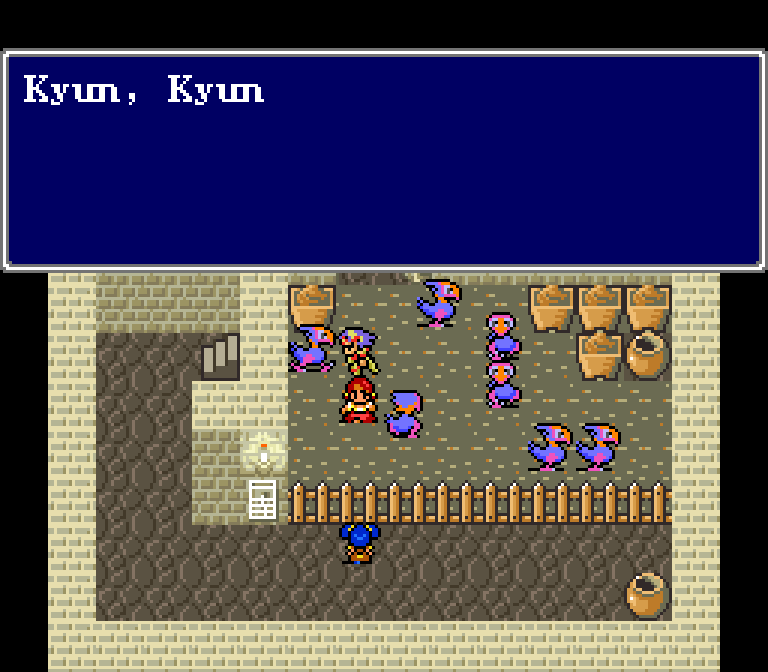
And the DS version goes with “Kweh, kweh” too:

So it sounds like this “in English, Chocobos should always say kweh” thing began during the PlayStation era and has remained steady as a rock since then. Since Chocobos are such a big deal for Square Enix (in terms of business and branding, but also as an international mascot of sorts), it’s very likely there’s some sort of internal documentation that requires Chocobo-related material to be handled in very specific ways.
It’s funny, though, because despite this, I always associate Chocobos with saying “Wark!” I don’t know why, it just stands out more to me than “kweh”. I forgot “kweh” was even a thing they say until now.
I’m sure there are sites out there that document what Chocobos say in each and every Final Fantasy and in every cameo role. If anyone knows where I can find such a site, let me know!
Black Chocobos 101
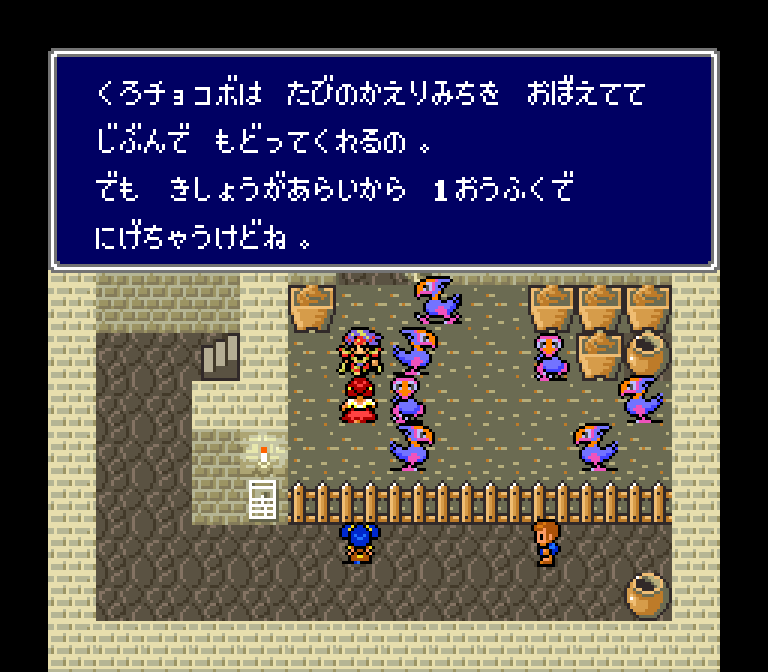 | 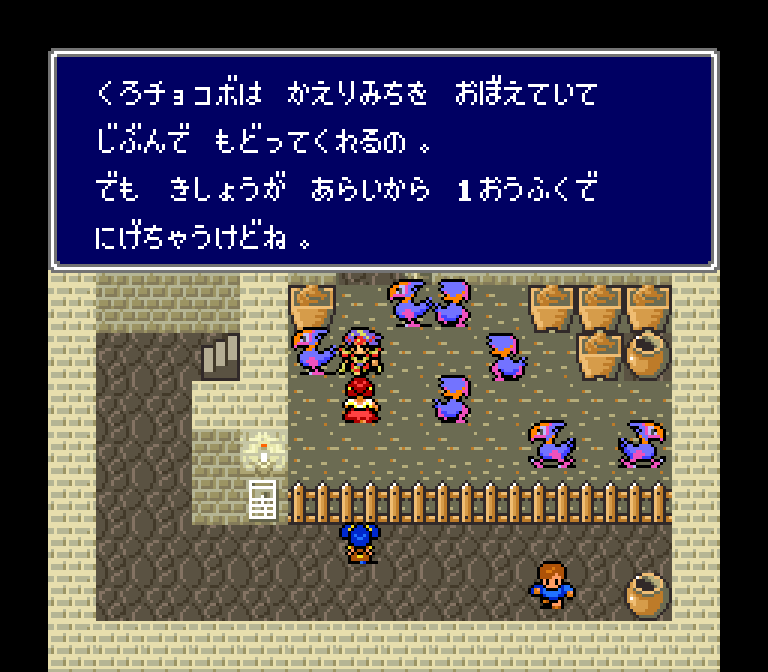 | 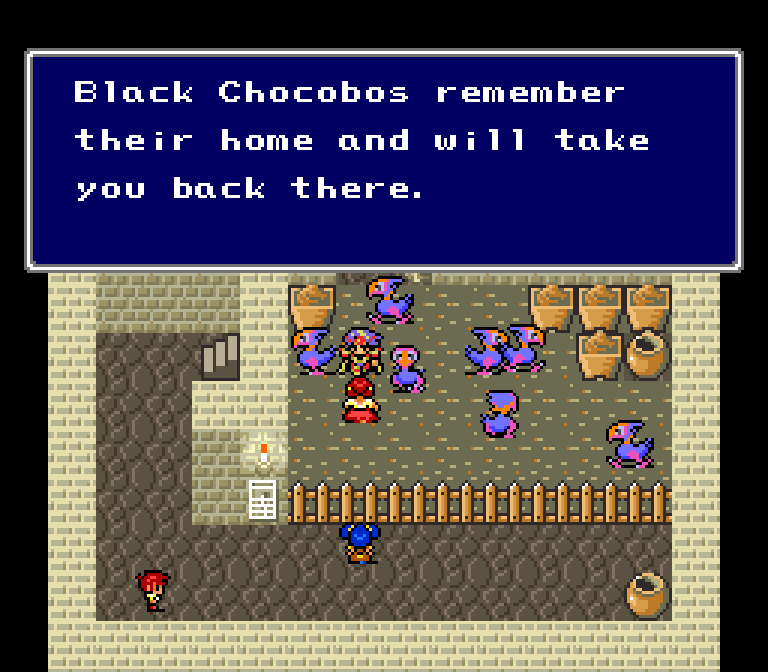 |
| Final Fantasy IV (Original) | Final Fantasy IV (Easy Type) | Final Fantasy II (Super NES) |
A lady who’s standing around with the Chocobos explains more about how they work:
| Final Fantasy IV (basic translation) | Final Fantasy IV Easy Type (basic translation) | Final Fantasy II (Super NES) |
| Black Chocobos will remember their way home from a journey and return there on their own. | Black Chocobos will remember their way home and return there on their own. | Black Chocobos remember their home and will take you back there. |
| But because they’re rough-natured, they’ll run away after one round trip. | But because they’re rough-natured, they’ll run away after one round trip. |
It looks like the English translation tries to be as concise as possible again, possibly due to technical limitations. This leaves out some of the finer details of how Black Chocobos work.
The Easy Type version of the script also had a few bits of text removed and inserts an extra space for better readability.
Found Ya!
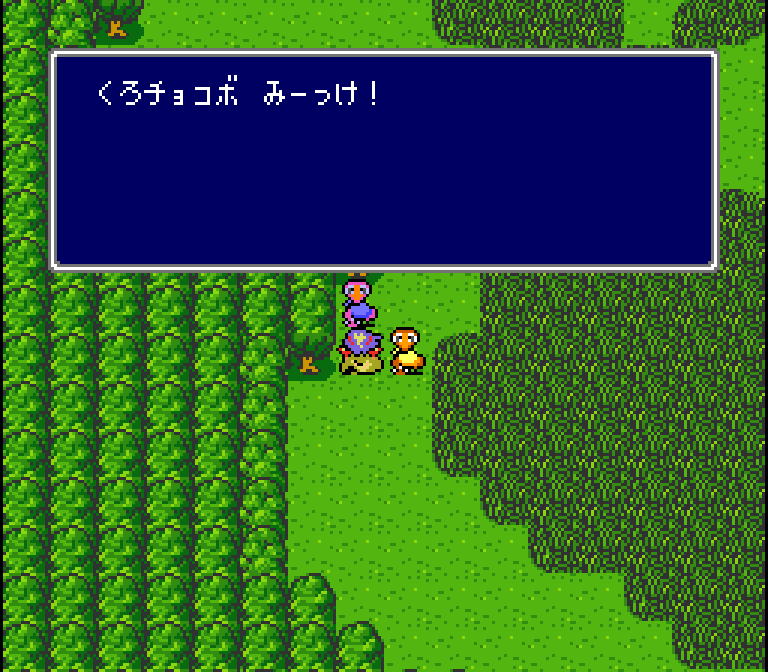 |  |
| Final Fantasy IV (Super Famicom) | Final Fantasy II (Super NES) |
As we saw way earlier in the game, when you catch a Chocobo in the English translation of the game, it says, “Found ____!” This is perfectly fine, but the Japanese text has a more playful, almost childlike vibe to it. All this applies to when you catch a Black Chocobo too.
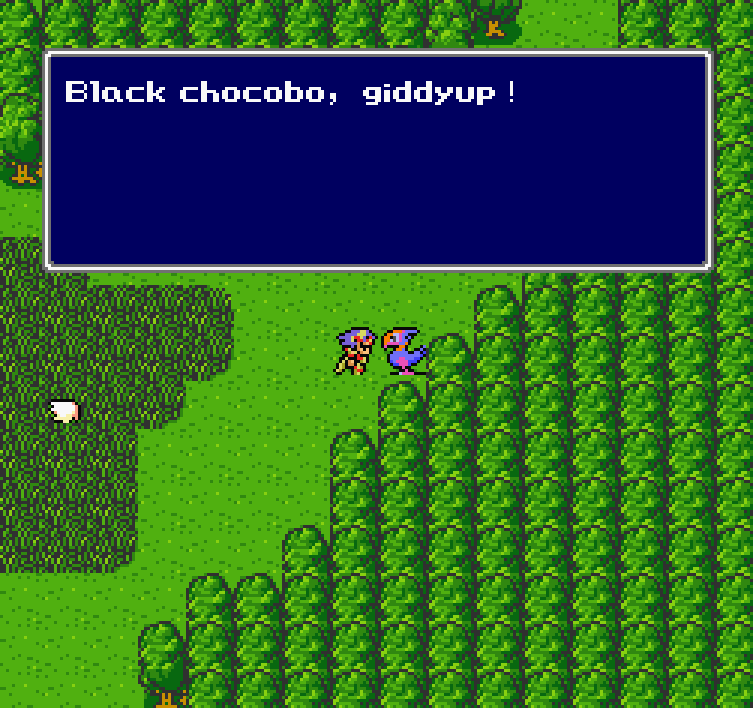
Interestingly, the PlayStation translation says, “Black chocobo, giddyup!” when you catch one.
It uses this same phrasing when you catch a normal Chocobo. When you find a white one, though, it says, “White Chocobo, gotcha!” which makes sense, since you don’t actually ride White Chocobos.
Actually, now that I look at it, it seems the PlayStation translation is inconsistent with its capitalization of “Chocobo” throughout the game.
Incidentally, until now I don’t think I ever realized that the Chocobo Village map is actually shaped like a giant Chocobo!
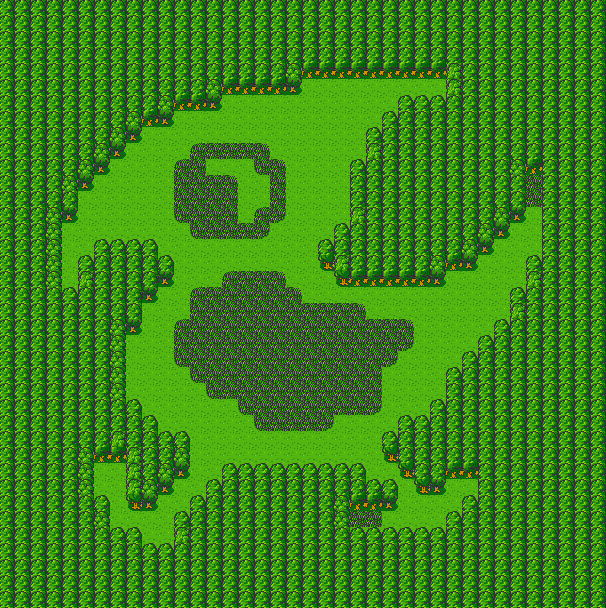


![press start to translate [Final Fantasy IV] press start to translate [Final Fantasy IV]](https://legendsoflocalization.com/wp-content/uploads/2019/08/bbenma.png)
I could see “Jenyfer” in the DS version being a compromise between the exoticism of the original name to the Japanese audience and trying to stay true to it BEING a weird, foreign name
And here I thought that the reason they translated Troia as they did originally was that it was the Italian(?) equivalent to ‘whore’.
A quick search shows a couple of people saying that feral chocobos say “Wark” and domesticated ones say “Kweh”. One of them sources that claim to Final Fantasy Tactics: War of the Lions, though I can’t find a screenshot to confirm offhand.
At any rate, I know a guy who worked for SE at one point (QA, I believe, circa 2007) and I remember him saying there *is* a guideline for when to use “wark” and when to use “kweh” but I don’t think he elaborated. Feral/domesticated seems like a plausible explanation.
I think the fan translator for the “furs” woman most likely confused the ねや at the end of her statement with ねぇや, figured the woman was saying she DIDN’T want something next time and tried to puzzle it out from there. Their best guess was that the “furs” was an oblique reference to the client at her table, so they mistranslated it as an aside from the woman to the player’s party saying she wanted a less hairy client the next time around.
…wrong line cited above, please disregard!